Latest Commentaries
Sunday 15 June 2025
All of Sir Ronald's commentaries up to June 12, 2025 can be read in the "Commentaries" section of this website. The most recent one is entitled, "Antigua and Barbuda hosts OAS a critical juncture for The Americas" (in English and Spanish). The government of Antigua and Barbuda, as host and chair of the Assembly, is acutely conscious of its role in providing an environment and guidance suited to current challenges. This Assembly takes place amid overlapping political, economic, social, security, and environmental pressures, and against a backdrop of longstanding institutional strains within the OAS. Those strains include chronic budget shortfalls, staffing gaps, and an overload of unfunded mandates, alongside the need to match aspirations with operational realities.
Amid these tensions, Antigua and Barbuda has advanced the theme of the 55th General Assembly: “Building resilient and inclusive economies in the Americas.” This theme captures pressing concerns across the region, emphasizing resilience—strengthening economies to withstand external shocks, whether global market disruptions, climate events, or public health emergencies—and inclusivity, allowing each member and observer state, large or small, to articulate its priorities within a collective framework. It reaffirms that improving the well-being of every citizen in the Americas is a shared goal, and that collaboration, mutual respect, and solidarity are essential.
Latest News in Pictures
Sunday 1 June 2025

Welcome dinner for Albert Ramdin (first right) on June 1, 2025 hosted by the Ambassador of Brazil, Benoni Belli (second right). Ambassador of Mexico, Luz Elena Banos, Vice Minister of Brazil, me.


Hosting a Farewell Luncheon for outgoing OAS Secretary General, Luis Almagro, with CARICOM friends on May 12, 2025
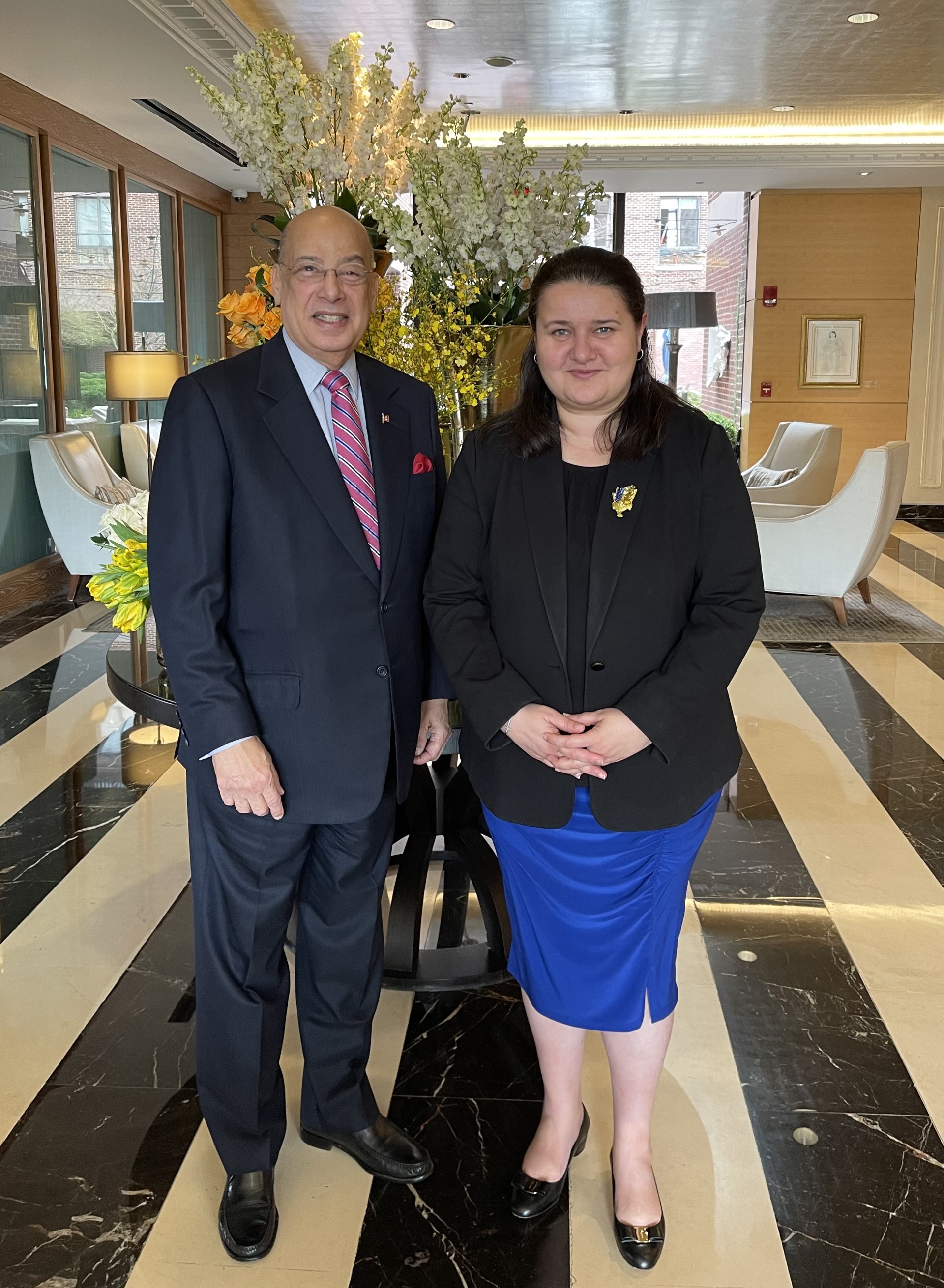
On 6th March 2024, with Ambassador of Ukraine to the US., Oksana Serhiyivna Markarova , after we had lunch in Washington DC to discuss bilateral matters and the ongoing war by the Russian Federation against Ukraine
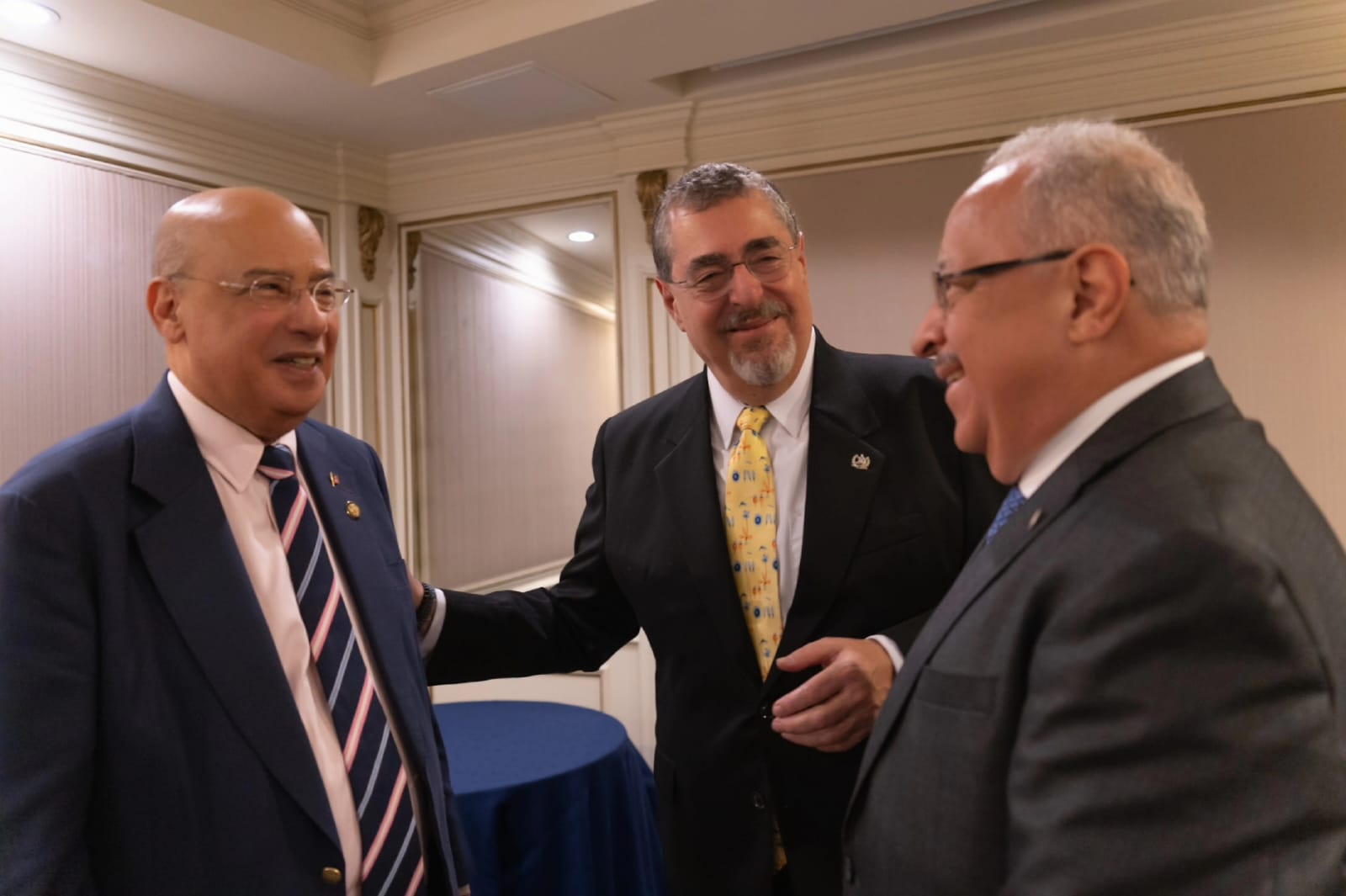
Sir Ron with Presdient of Guatemala, Berardo Arevalo, President of Guatemala and Foreign Minster, Carlos Ramiro Martinez on the 13 Janauary 2024 (on the eve of Arevalo's installation as President)
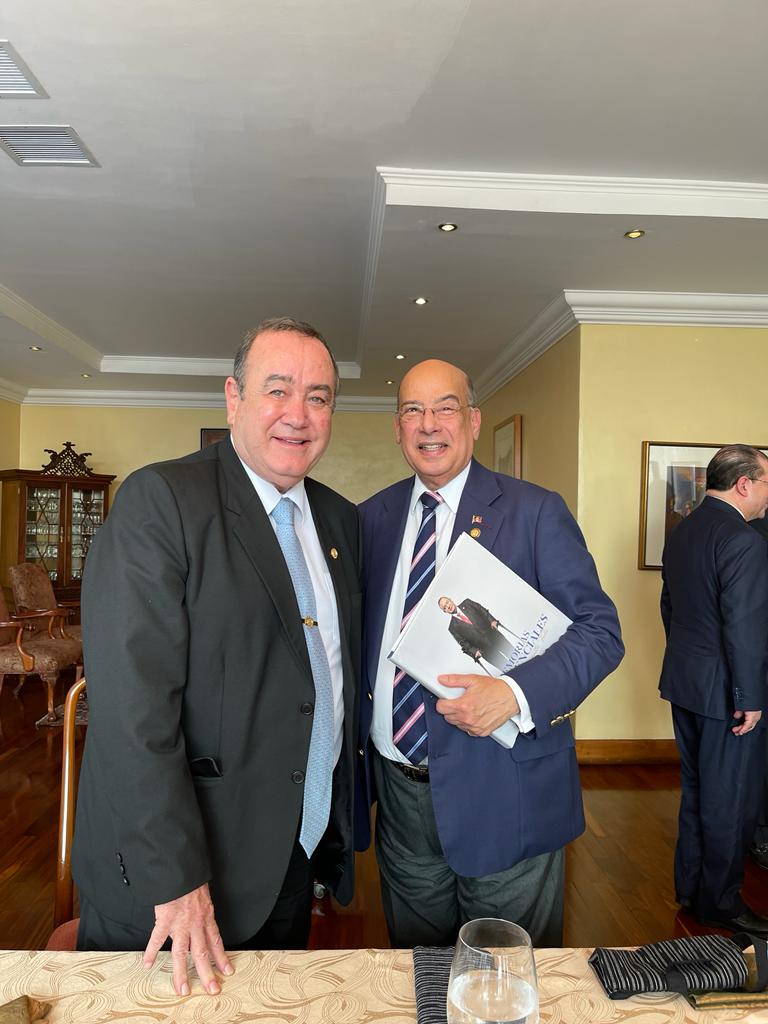
With the President of Guatemala. Alejandro Gammettei, who invited Sir Ronald as Chair of the Permanent Council of the OAS to revew the transitiion of Governnment in Guatemala - 15 December 2023
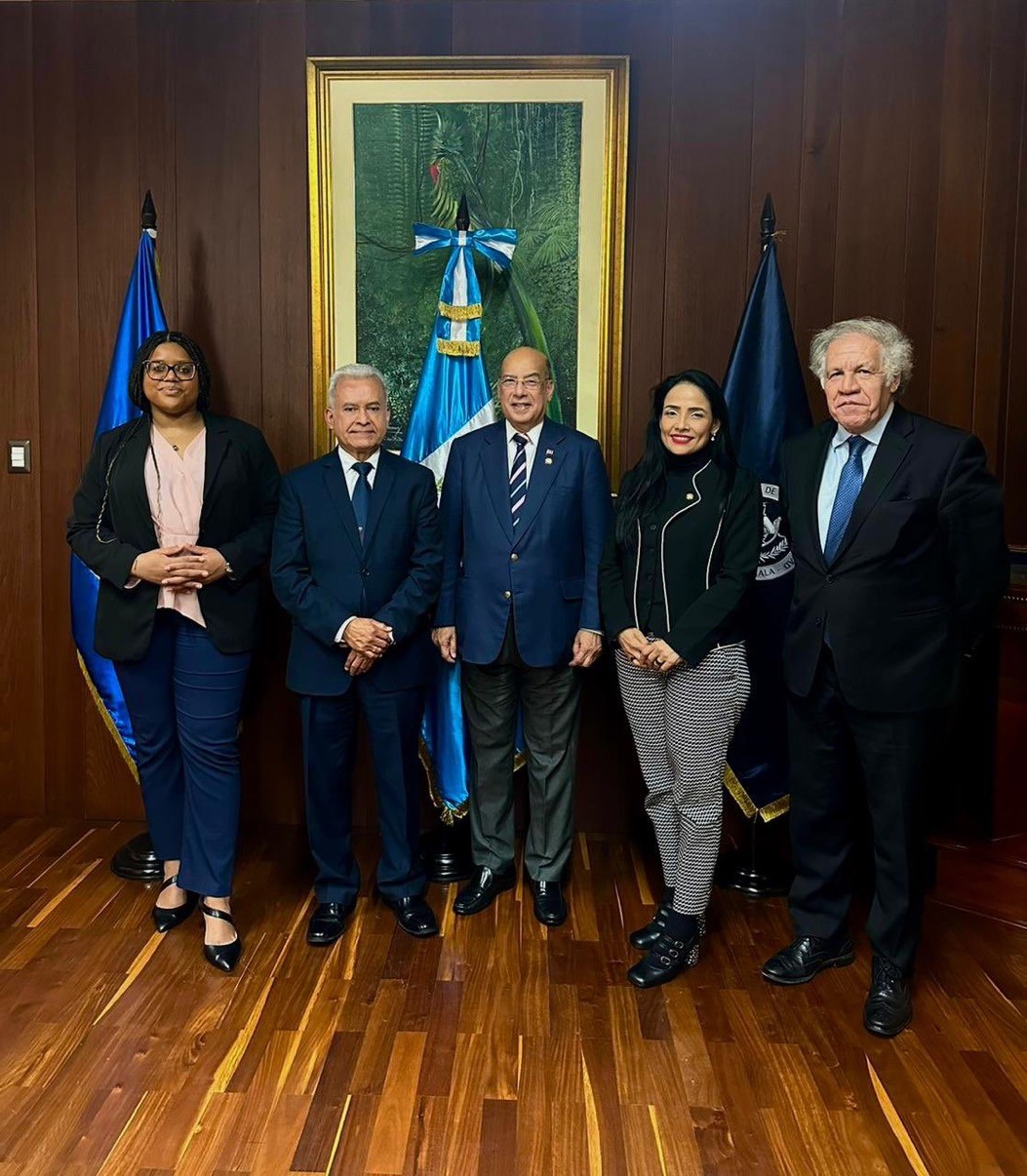
Sir Ronald, as Chair of the OAS Permanent Council meeting representatives of the Constititional Court in Guatemala on 15 Decemeber 2023. Left to Right, Franchesca Sterling, Adviser to the OAS Secretary General;. President of the Court, Hector Hugo Perez Aguilera; Senior Judge, Leyla Susana Lemus Arriaga, Sir Ronald, and Luis Almagro, Secretary General of the OAS
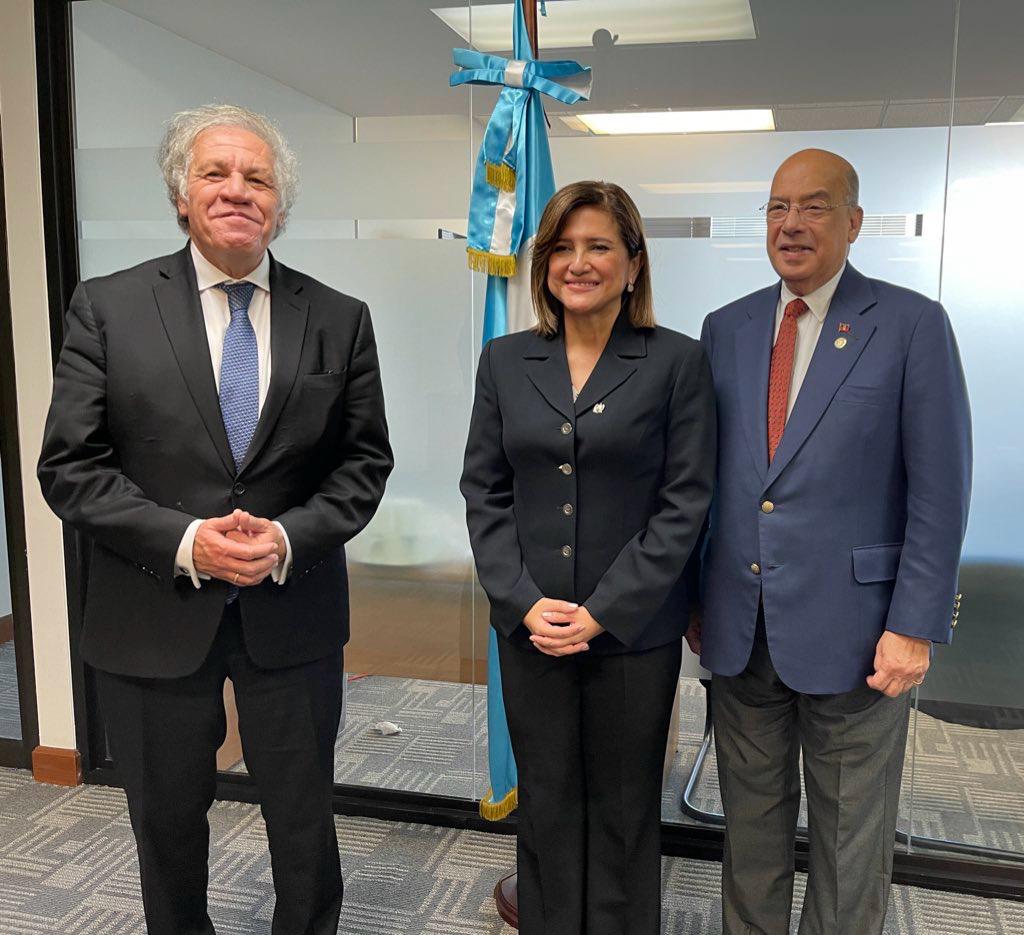
Luis Almagro, OAS Secretary=General; Karin Herrera, Vice President-Elect Guatemala, and Sit Ronald in Guatemala on 16 December 2023
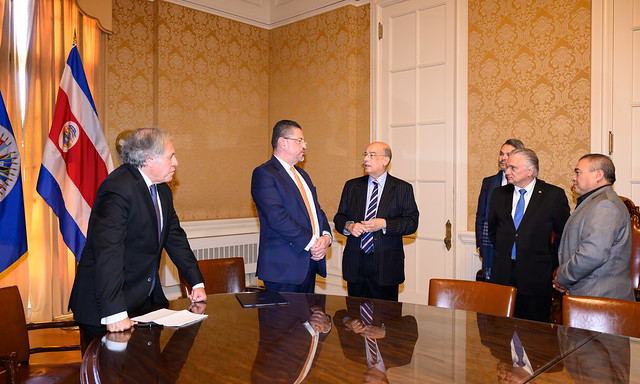
On 3 November 2023, greeting the President of Costa Rica. Rodrigo Chaves Robles, at the OAS for a meeting at which I presided as President of the Permenant Council (left to Right SG Luis Alamagro, President Chaves, Me, Foreign Minister of Costa Rica, Arnoldo Andre Tinoco, and Nestor Mendez, Assistant Secretary General, OAS
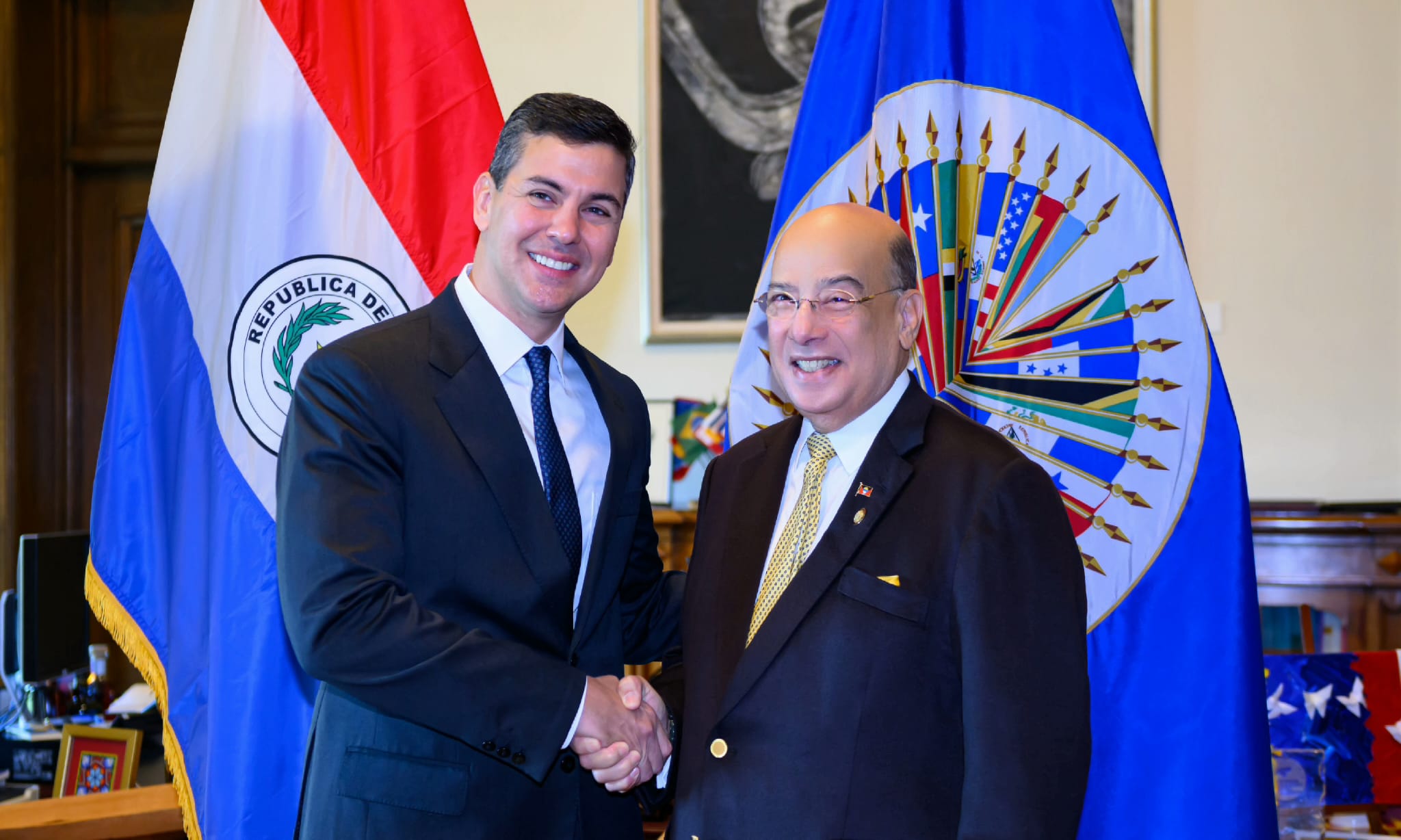
With the President of Paraguay. Santiago Pena, at meeting of the OAS Permanent Council on 23 October, 2023
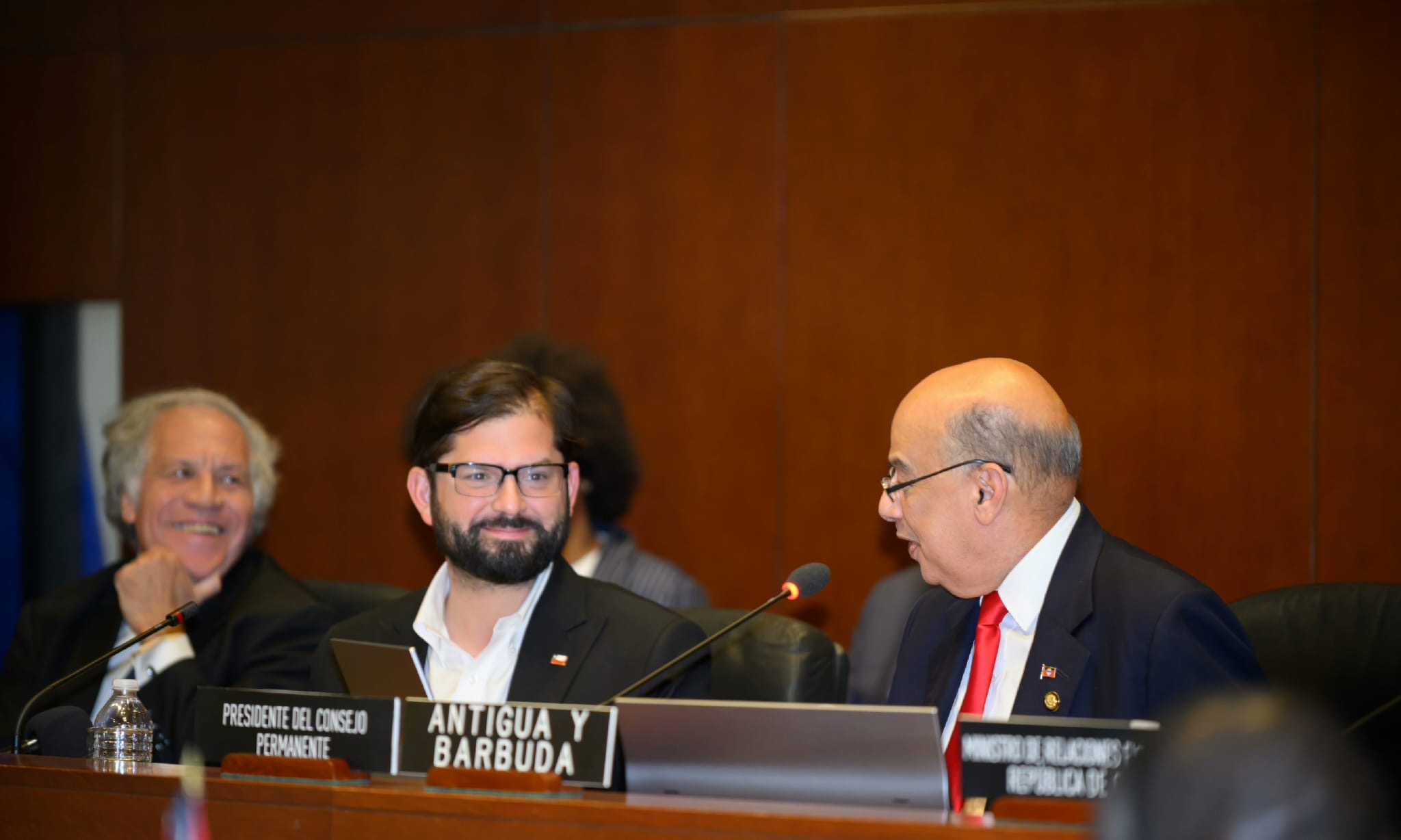
With the Preisdent of Chile Gabriel Boric (Centre) on 22 September 2023. Lusi Almago, OAS Secretray General (left of photograh)
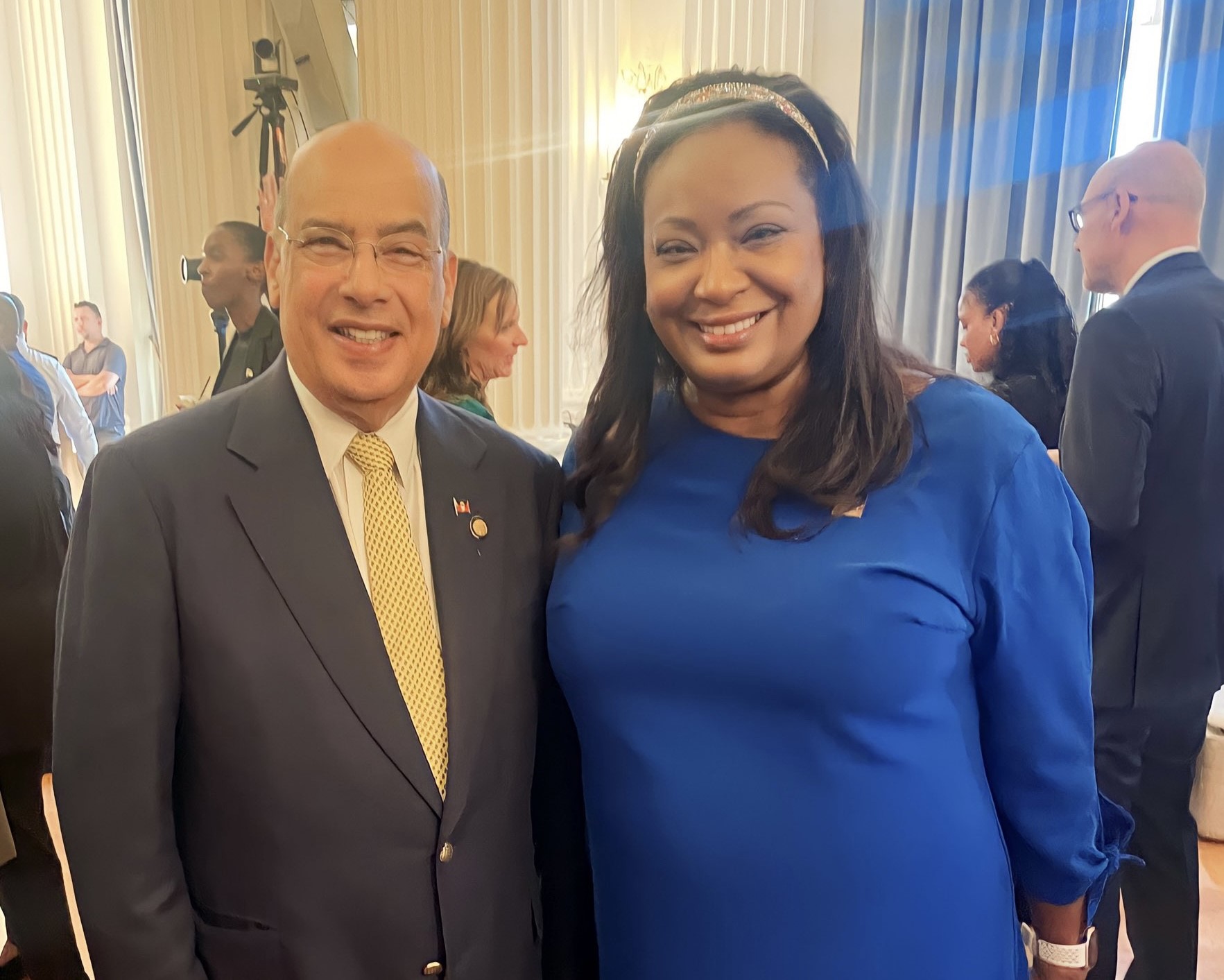 With the Secretary of State for the District of Columbia, Kimberly A. Bassett. We met this week at a receptionon 6 September 2023 marking Brazil’s National Day
With the Secretary of State for the District of Columbia, Kimberly A. Bassett. We met this week at a receptionon 6 September 2023 marking Brazil’s National Day
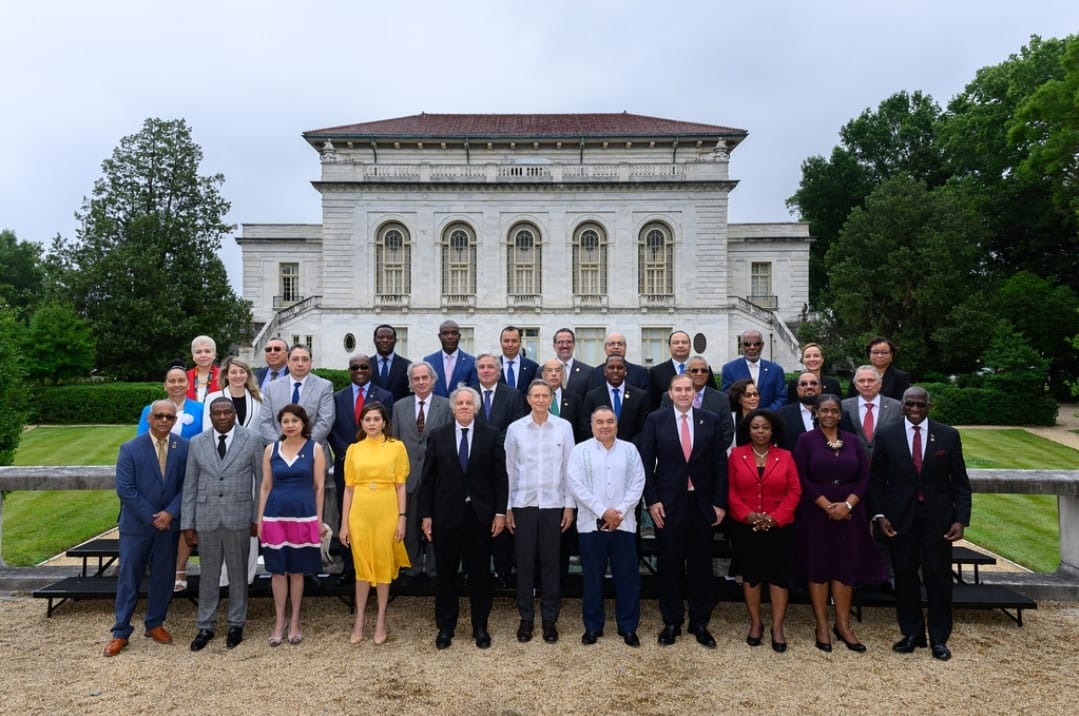
Official photograph of Heads of Delegation to the 53rd Regular Session of the General Assembly of the Organization of American States (OAS). In the background is the rarely seen back ot the OAS Headquarters building in Washington, DC on June 23rd 2023
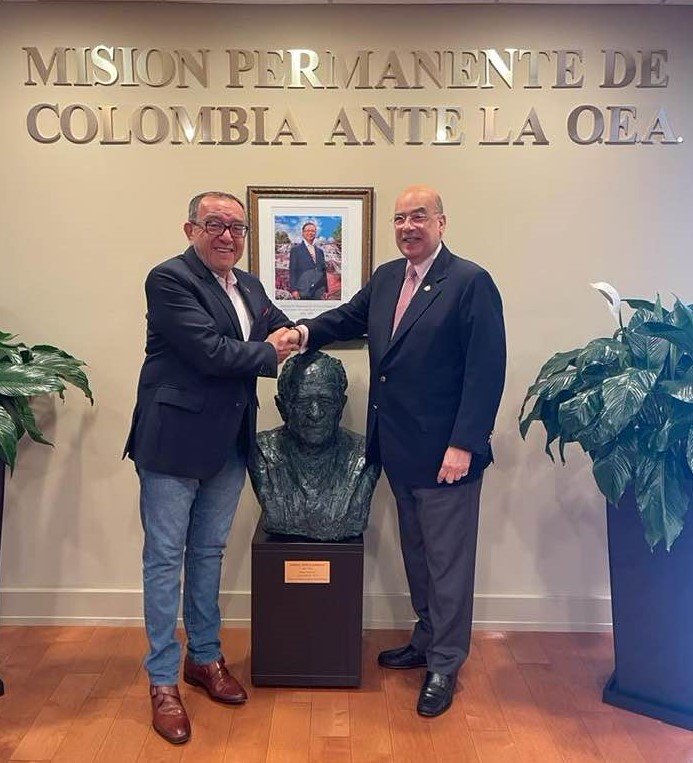
10 May, 2023 at the Permanent Mission of Colombia. A bust of the celebrated literary giant Gabriel Garcia Marquez (Author of “One hundred days of Solitude” and many more outstanding works). With the Colombia Ambassador to the OAS, Luis Ernesto Vargas.
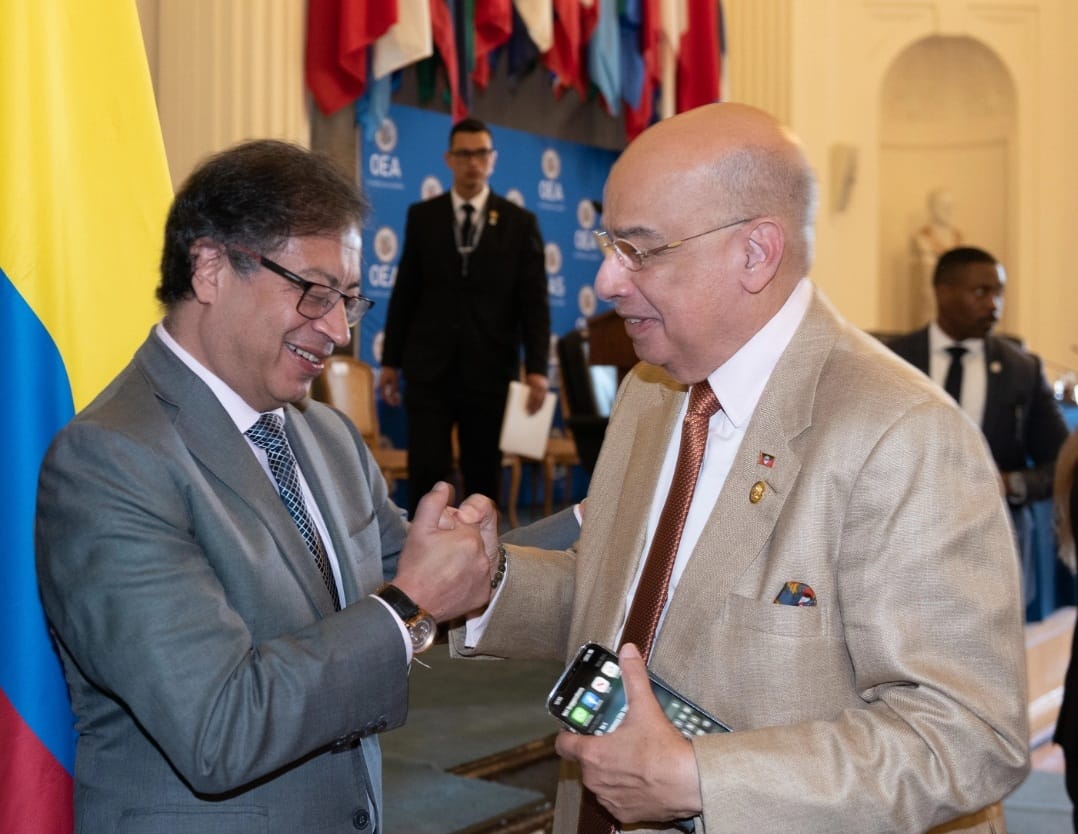
With the President of Colombia Guistavo Petro at the Organization of American States (OAS) on 19 April 2023, afrer he made a rousing speech on freedom and political rights
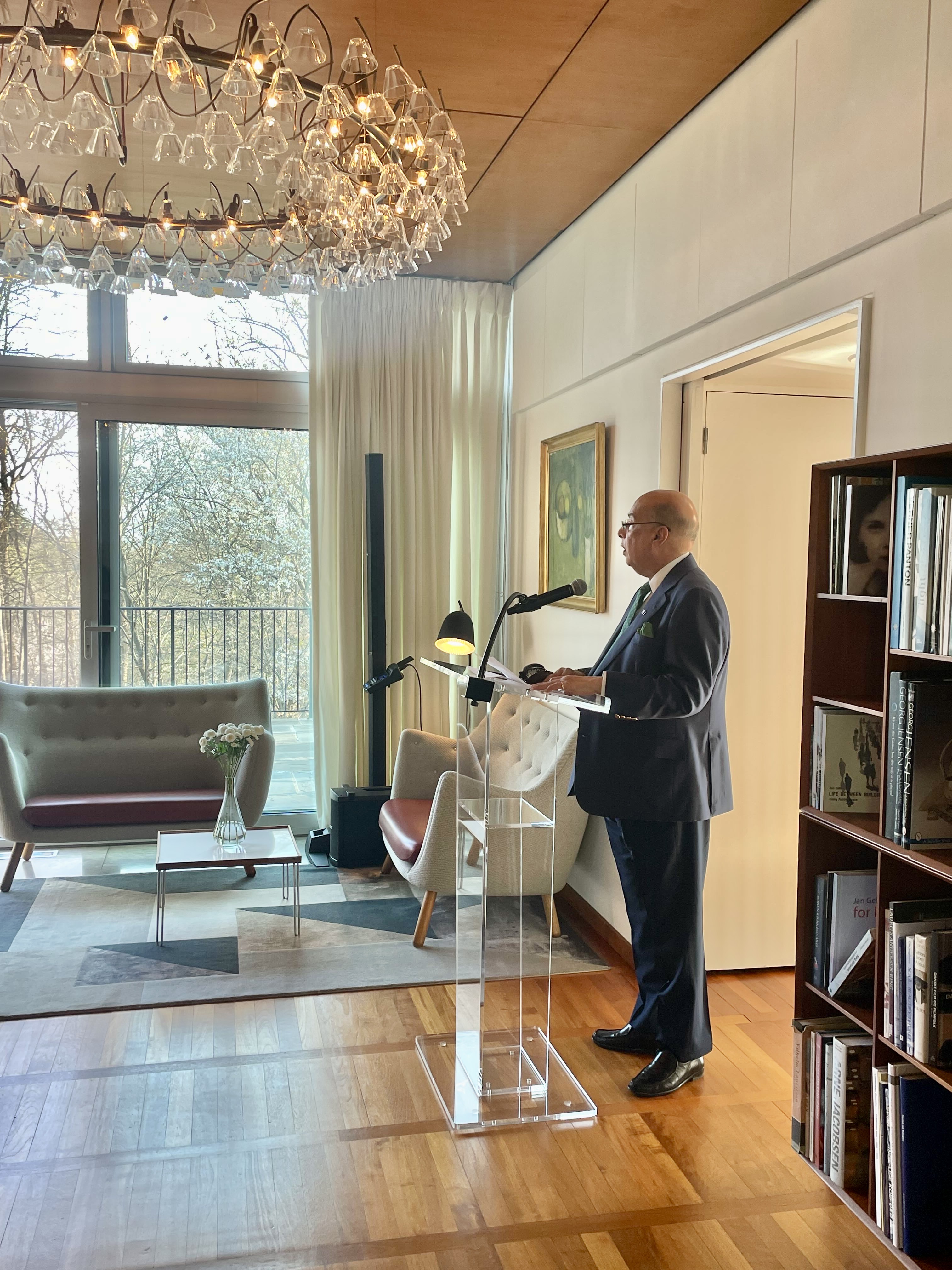
Sir Ron speaking at the Danish Embassy in Washigton, DC in a converastion on Climate Chane and Peace and Security on March 23, 2023
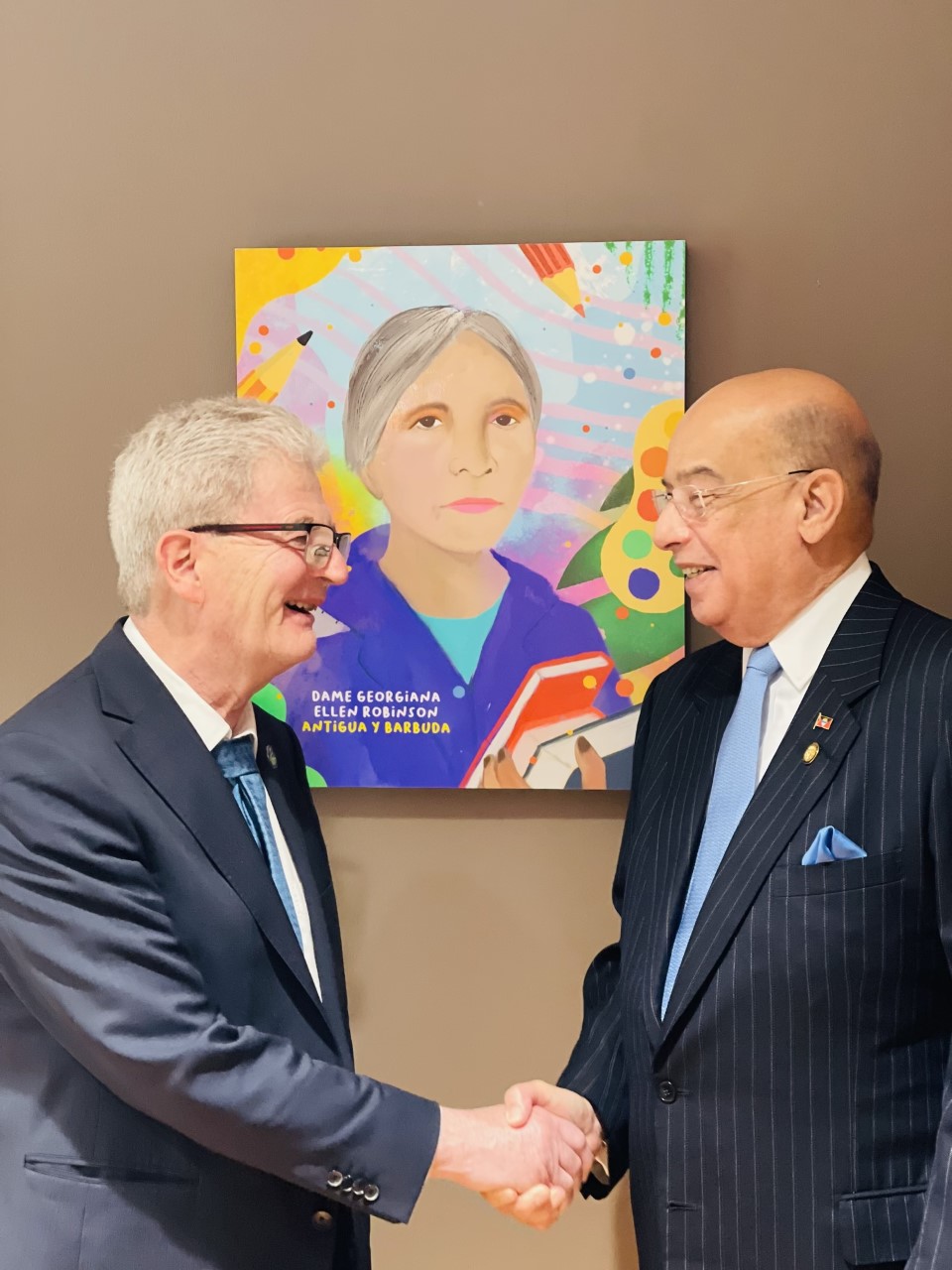
Sir Ron and former Foreign Minister of Denmark, Holger K. Nielson, at the Antigua and Barbuda Embassy in Washigton, DC on 24 March 2023, after a useful exchange of views on Peace and Security and the importance of the presence of Small States on the UN Security Council
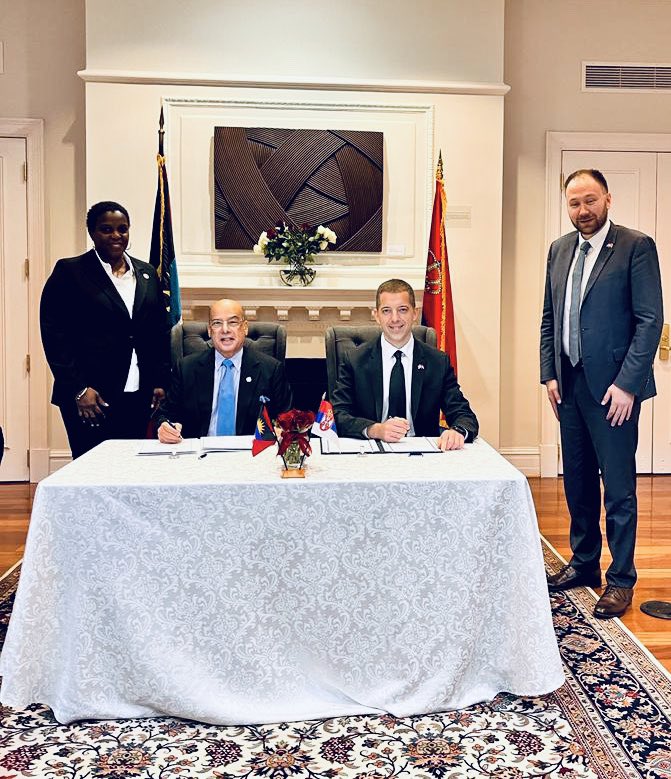
Sir Ron signing, with Serbian Amabassador, Marko Djuric, agreement. mutually abolishing visa requirments between Antigua and Barbuda and Serbia in Washington, DC on 11 March, 2023. At left in the photograph is Joy-Dee Davis, Minister-Counsellor in the Antgua and Barbuda Embassy
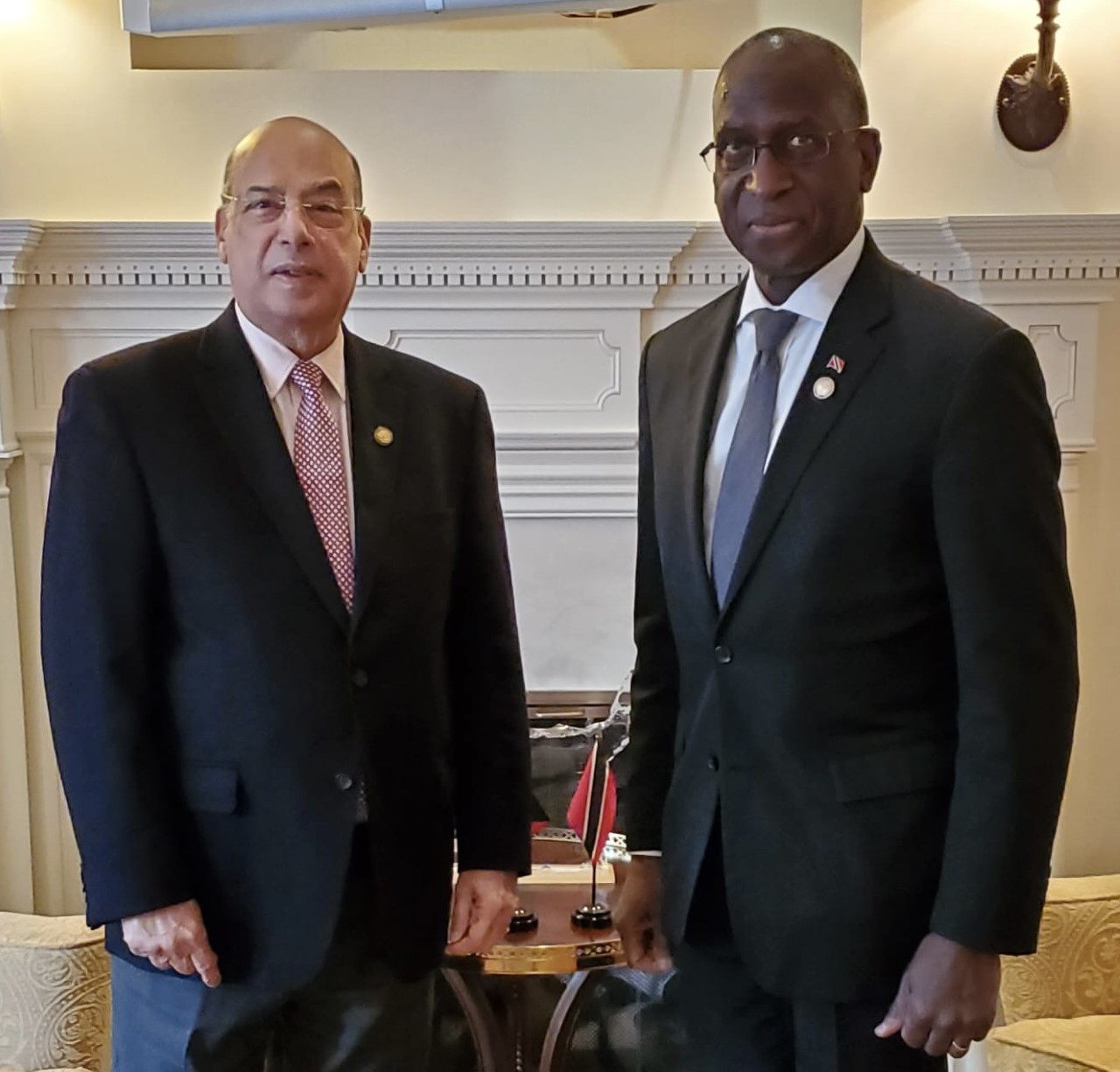
Sir Ronald Sanders (Antigua and Barbuda) and Ambassador Anthony Phillips-Spencer (Trinidad and Tobago) are the two senior Caribbean Ambassadors in the US and to the OAS. On 13 February, 2023 they met to discuss implementation of priority matters for the Caribbean in the US and the OAS.
.jpeg)
In February 2023, the Ambassador of the Maldives to the US called on Sir Ronald Sanders at the Antigua and Barbuda Embassy in Washington, DC to discuss issues related to small states in the international community. Climate change was a priority of their discussion.
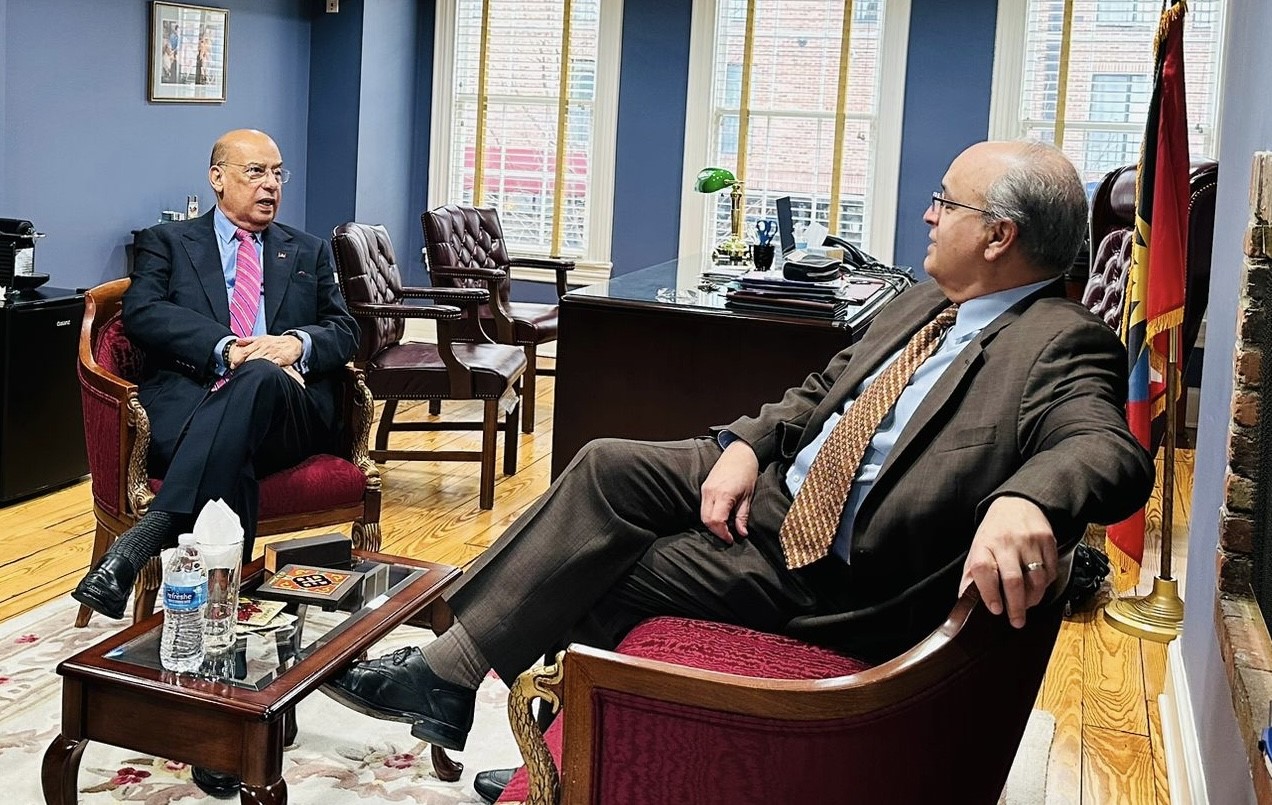
With US Ambassador to the Organizaion of American States (OAS), Frank Mora, at the Antigua and Barbuda Embassy in Washington, DC, Februrary 2023
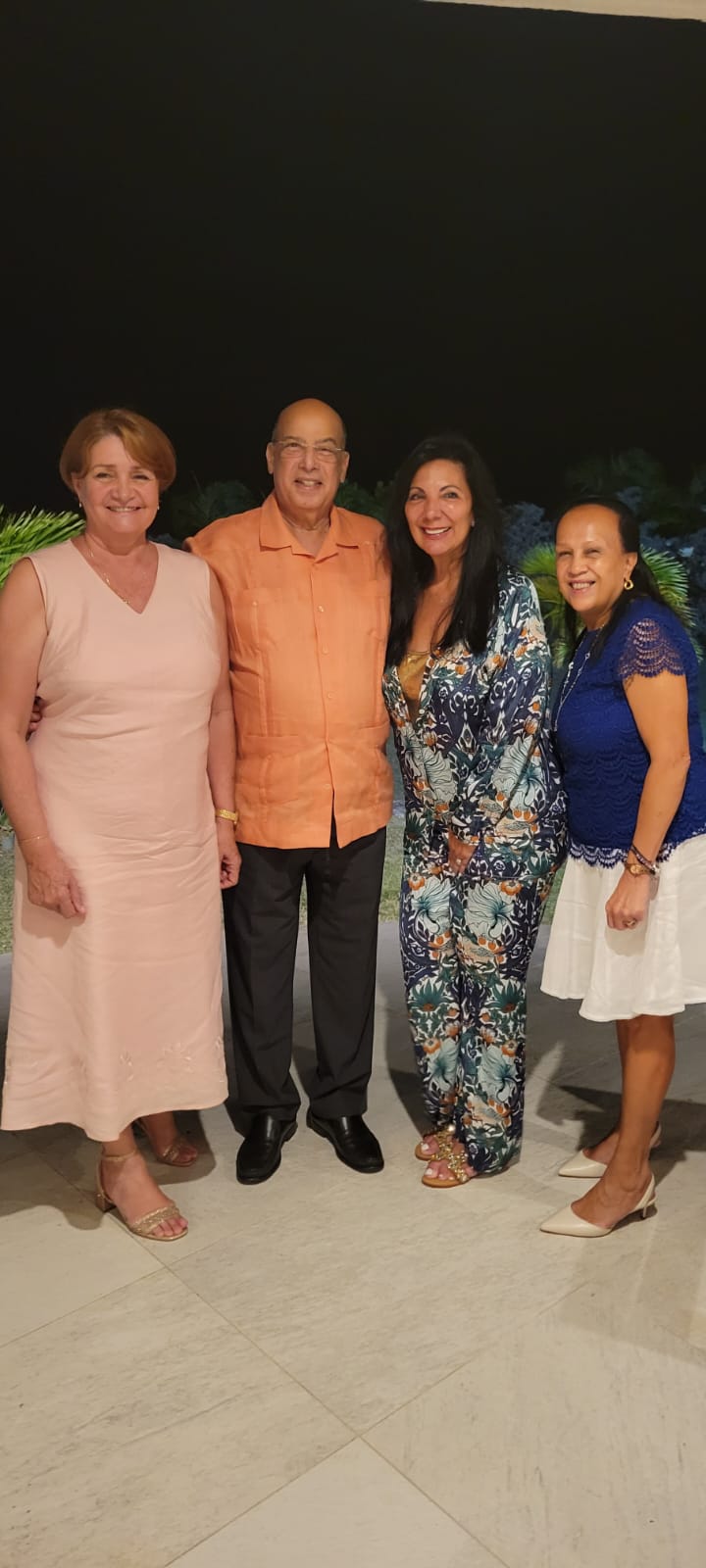
With the lady Ambassadors accredited to Antigua and Barbuda in December 2023. Left to Right, the Ambassador of Cuba, Maria Esther Fife; Ambassador of the Dominican Republic, Raquel Jacobo; and Ambassador of Venezuela, Carmen Velazquez De Visbal (December 2022) in Antigua
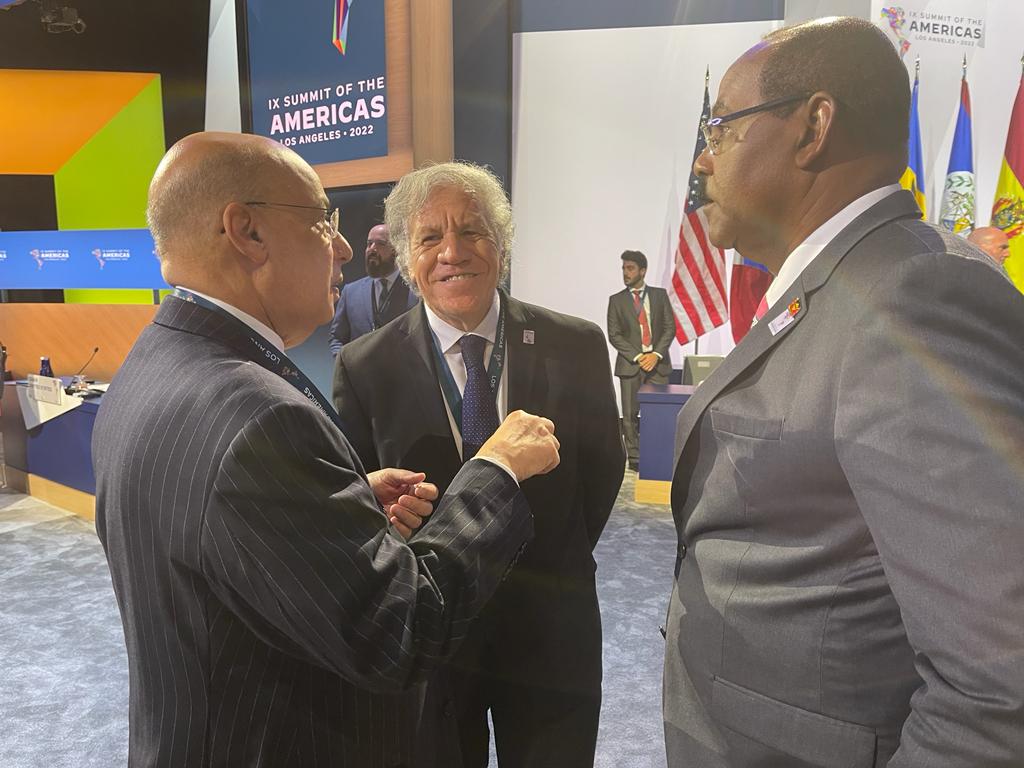
At the Summit of the Americas in Los Angeles on 10 June 2022: Sir Ronald, OAS Secretray-General Luis Almagro and Antigua and Barbuda Prime Minister, Gaston Browne.
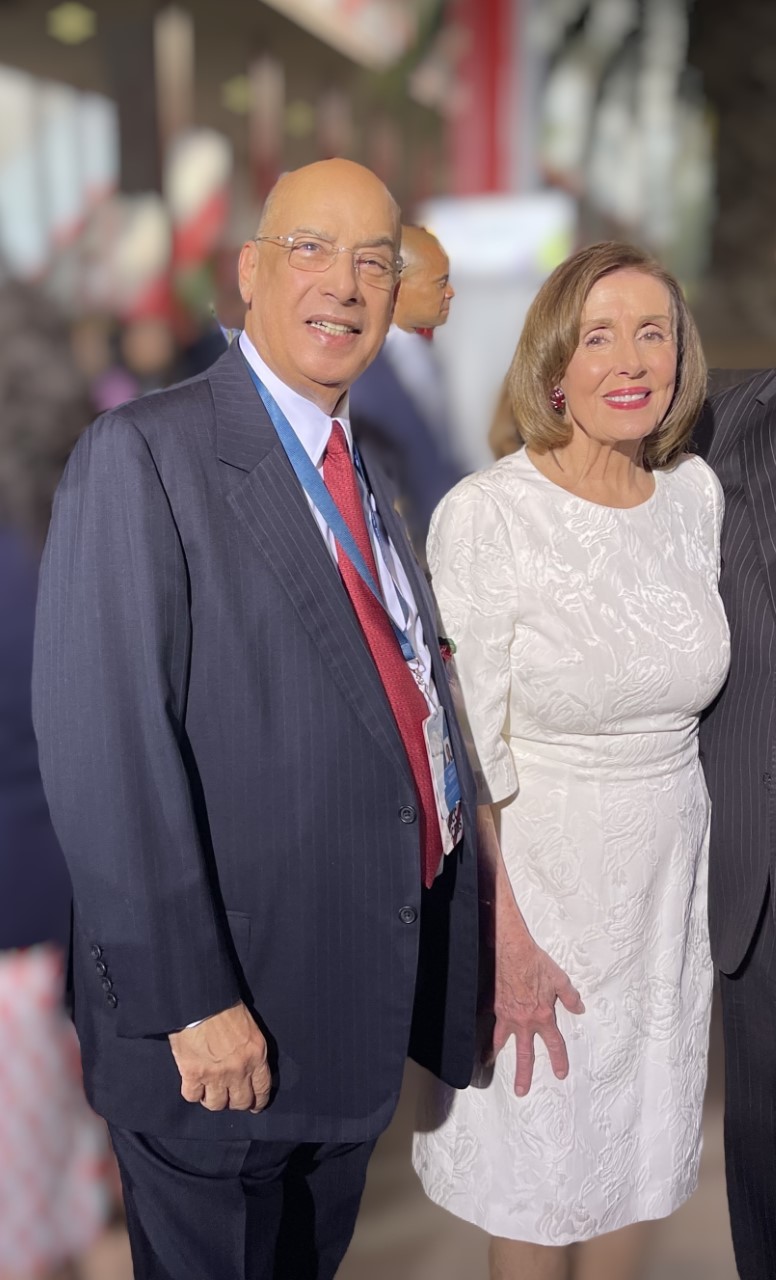
Sir Ronald with The Honourable Nancy Pelosi, the formidable Speaker of the US House of Representatives on Thursday 9 June 2022 during the Ninth Summit of the Americas in Los Angeles
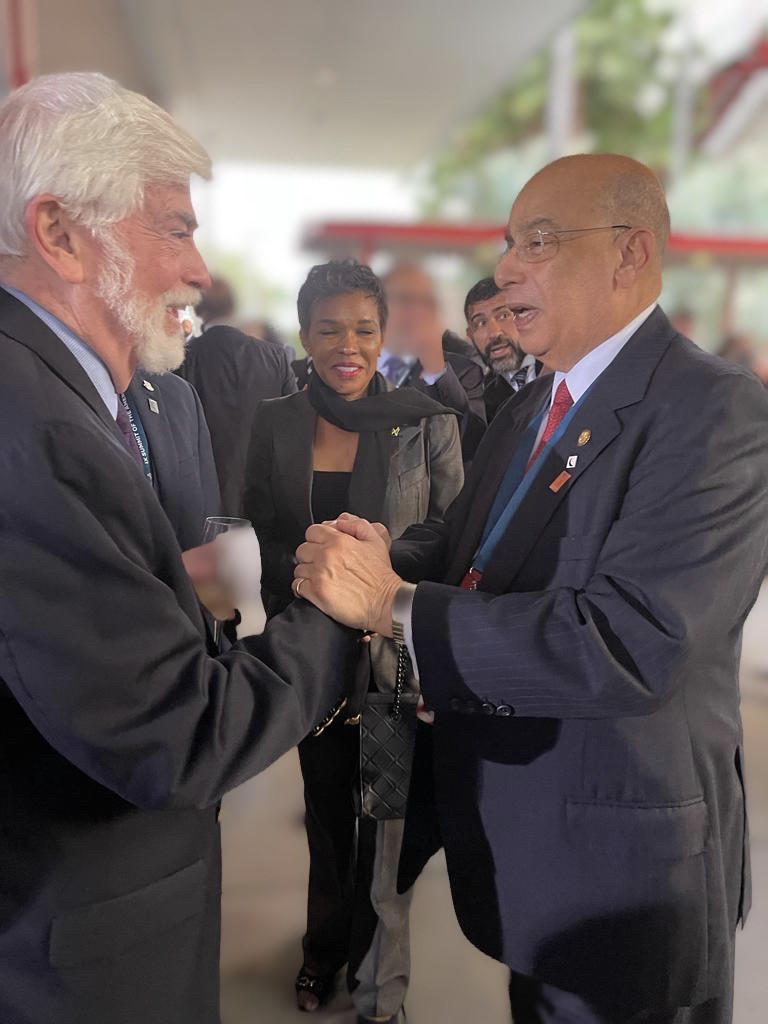
Senator Chris Dodd, Adviser to President Biden on the Ninth Summit of the Americas and the man largely responsible for convinng many Caribbean and Latin American leaders to attend, with Sir Ronald.
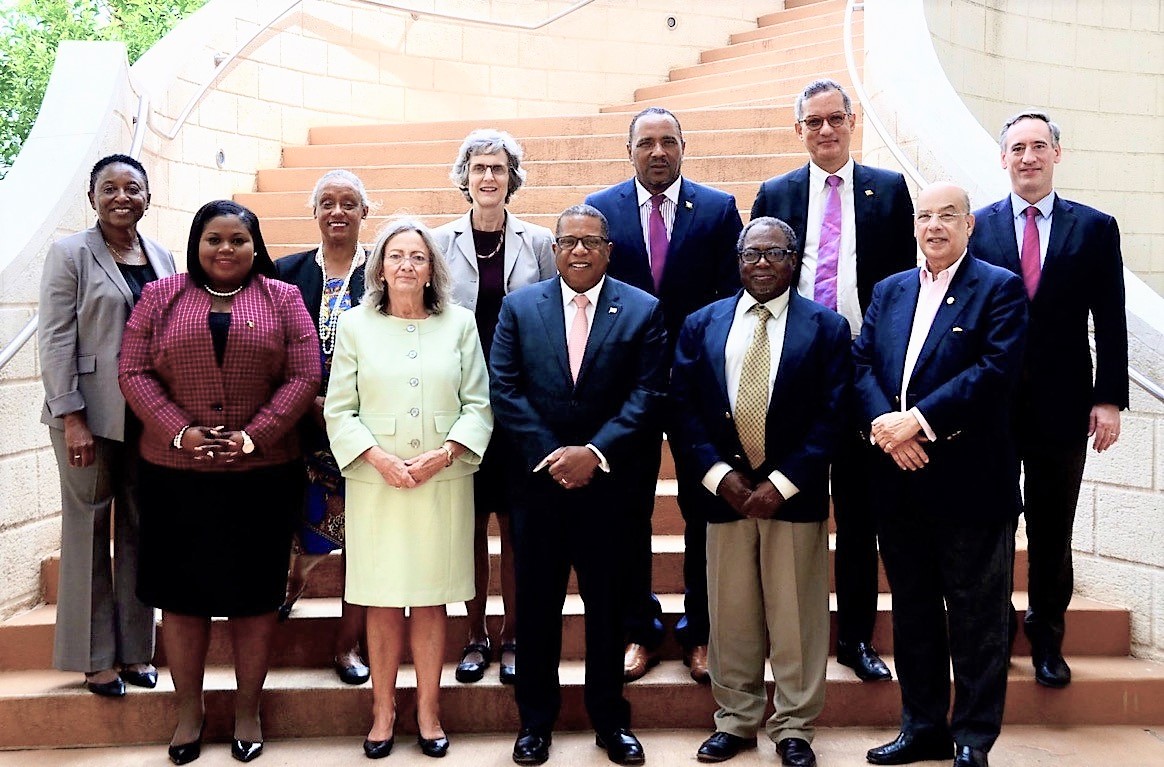
Meeting in Barbados between Representatives of the US State Department anf Senior Representatives of Easrern Caribbean Governments. Front row left to right: Senator (St Vincent and the Grenadines), US Ambassaor to Barbados and the Eastern Caribbean States;. Brian Nichols Assistant Secretary, US State Department, Earl Huntley Senior Adviser to St Lucia Foreign Minister, Sir Ronald Sanders representing government of Antigua and Barbuda. Back row left to right: St Kitts-Nevis Ambassador to the US Thelma Phillips-Browne; Permanent Secretary Barbados Ministry of Foreign Affairs; Nan Fide, Director Caribbean, US State Departmenent; Foreign Minister of Dominica; Minister of Health Grenada, Deputy Chief of Mission, US Embassy in Barbados.
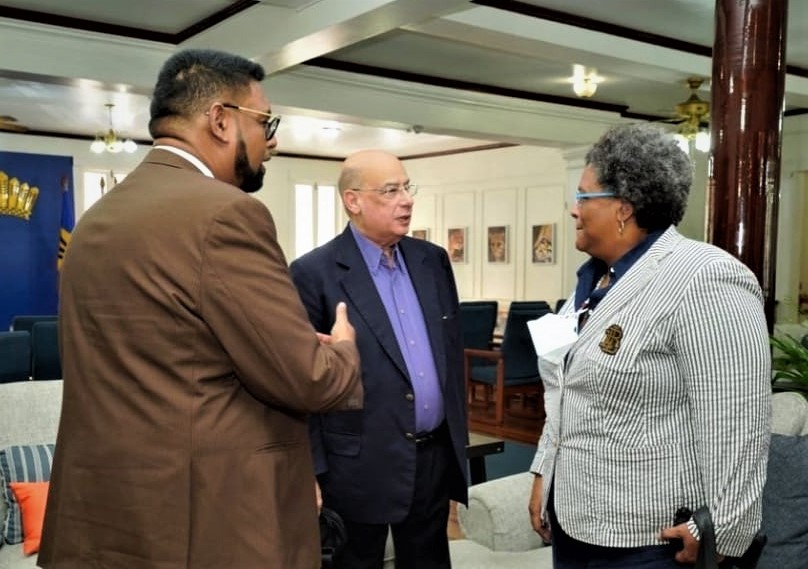
On 18th May 2022, at State House in Guyana with Guyana President Irfaan Ali and Barbados Prime Minister, Mia Mottely prior to "Agri-Invest Expo and Forum" which set the stage for an actionable, time bound plan for food sercuity, energy security, removal of trade barriers and regional trsnsportation.
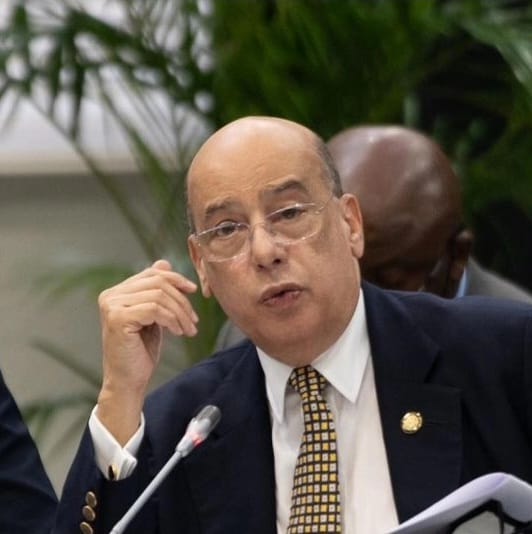
Speaking at a meeting between Caribbean leaders and a US Congressional team, led by Congresswoman Maxine Waters, in Barbados on Wednesday 20 April 2022 . I was pleased to initiate this process of consultation, as Antigua and Barbuda’s Ambassador, with Congresswoman Waters in July 2019 (.(see photo in date order below with the Congresswoman in July 2019). Subsequently, in November 2019 we had the first Roundtable in Washington.
In an interview with British Channel 4 News, Sir Ronald explains that Britain must make MLAT request for assistance regarding two Yachts in Antigau waters allegedly owned by sanctioned Russian Oligarch, Roman Abramovich:
See: What has happened to yachts linked to Roman Abramovich? – Channel 4 News
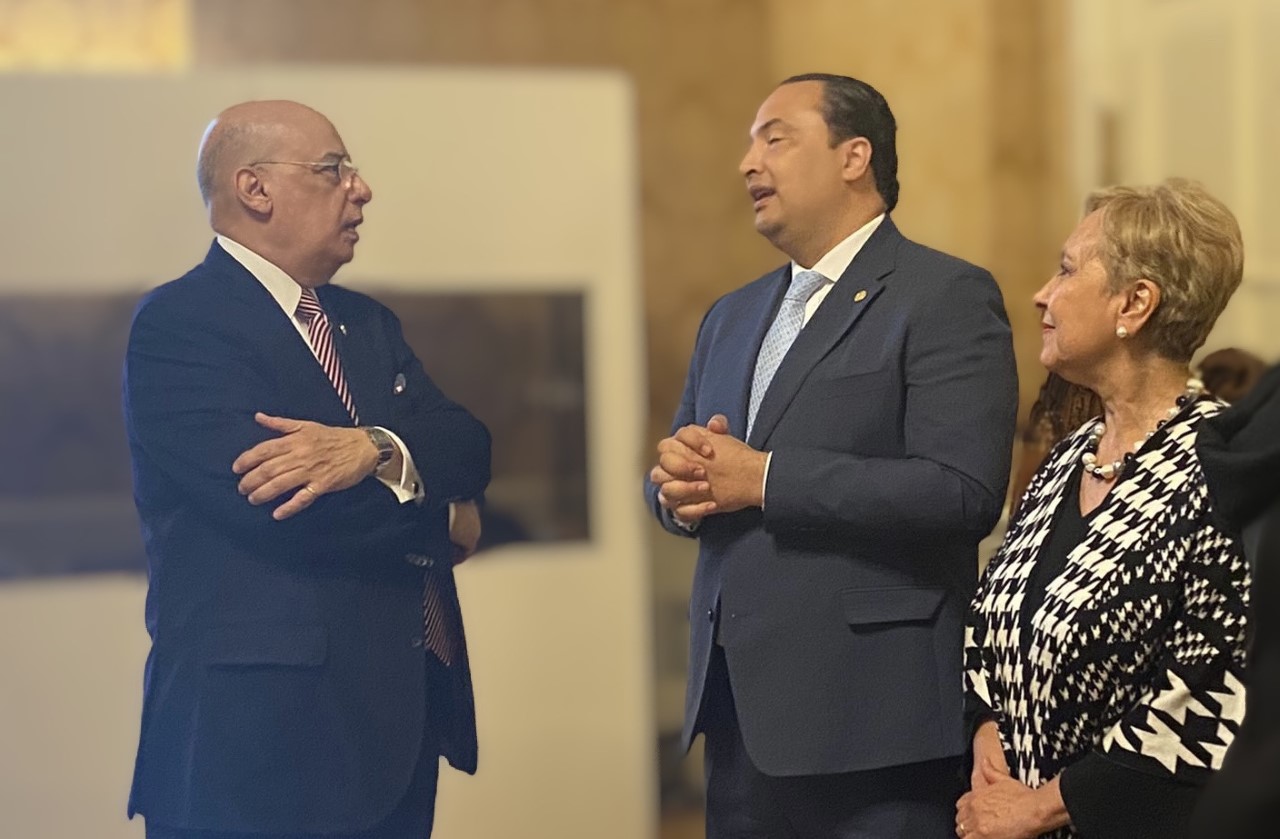 With the Foreign Minister of Guatemala, Mario Adolfo Bucaro Flores, to discuss CARICOM-Central America cooperation and deepening relations at the OAS. At the right of the photograph is Rita Calverie di Scioli, the Guatemalan Ambassador to the OAS, 31 March 2022
With the Foreign Minister of Guatemala, Mario Adolfo Bucaro Flores, to discuss CARICOM-Central America cooperation and deepening relations at the OAS. At the right of the photograph is Rita Calverie di Scioli, the Guatemalan Ambassador to the OAS, 31 March 2022
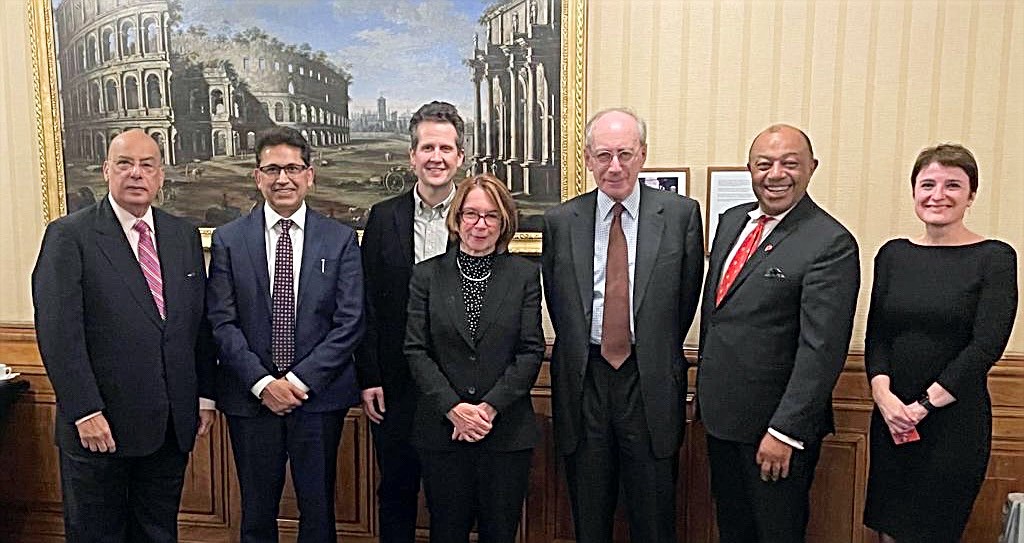
Members of the Committee appointed by the Vice Chancellor of the University of London to Inquire into the Future of Commonwealth Studies at the University. The report was submitted at the end of July 2021 and the Institute of Commonwealth Studies was given a renewed and expanded mandate.
Left to Right: Sir Ronald Sanders, Nabeel Goheer, Dr Conor Wyer, Professor Wendy Thomson - Vice Chancellor - Sir Malcolm Rifkind (Chairman) Lord (Paul) Boateng, Jo Fox - Dean of the School of Advanced Studies. Photo at Senate House. London, November 3rd 2021.
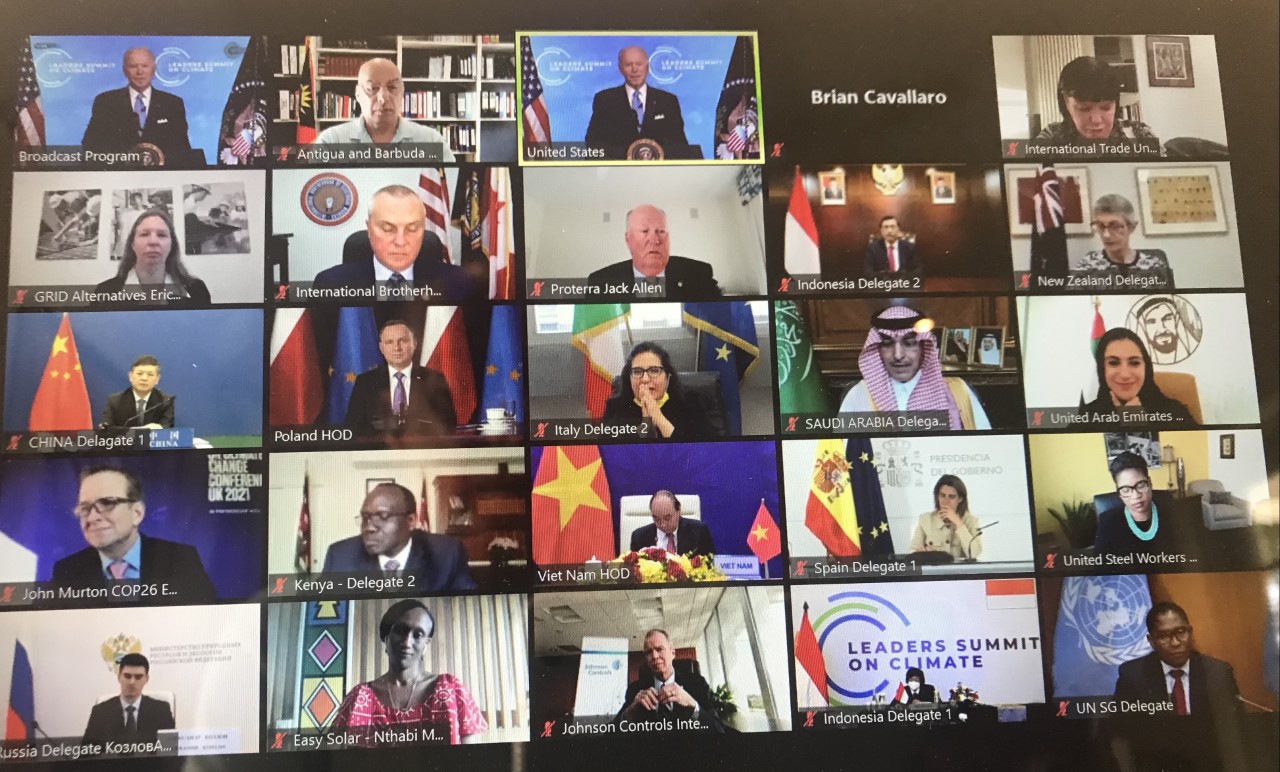
Participating as a delegate from Antigua and Barbuda in the Summit of 40 Leaders on Climate, organised by us President, Joseph Biden, on 22 and 23 April 2021. Sir Ronald second from left at top.
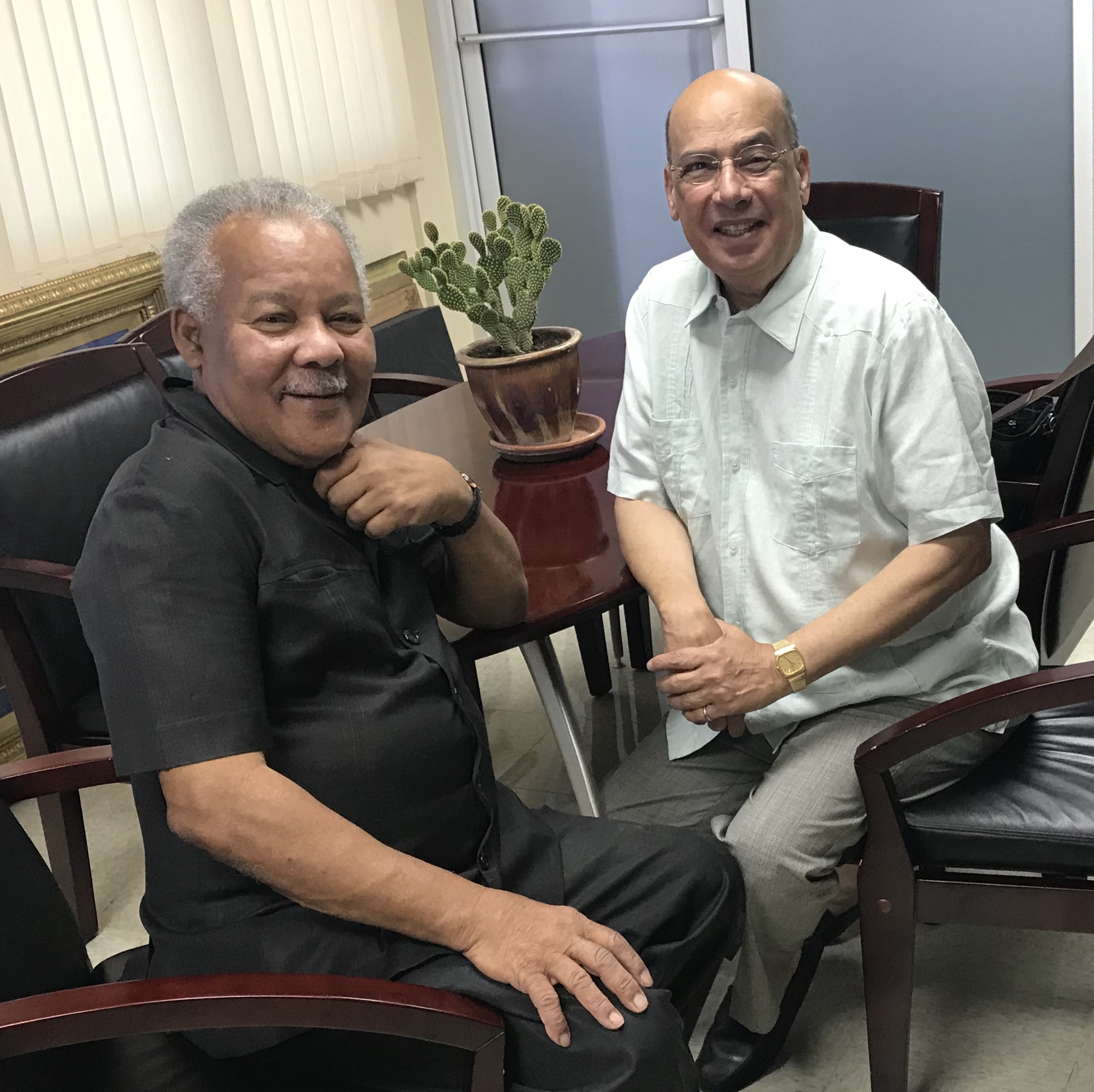
With the late Right Honourable Professor Owen Arthur, former Prime Minister of Barbados at his office at the Cave Hill Campus of the University of the West Indies in January 2020, talking Caribbean integration
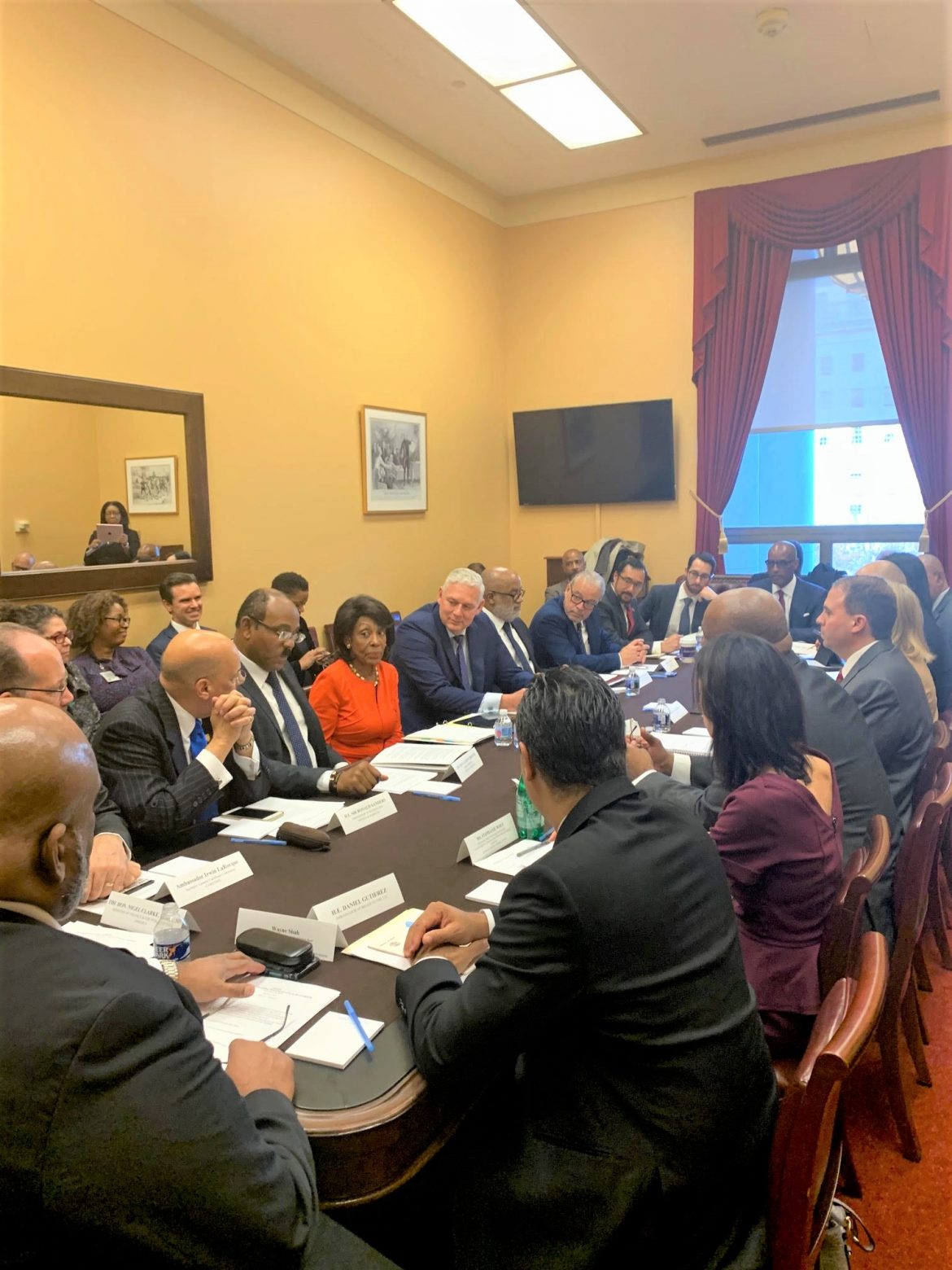 Meeting between US Congressional Representatives, Global Banks and Caribbean government representative. Congresswoman Maxin Waters (centre in red), Antigua and Barbuda Prime Minister Gaston Browne to her right, Sir Ronald Sanders to Prime Minister Browne's right. Capitol Hill on November 14, 2019
Meeting between US Congressional Representatives, Global Banks and Caribbean government representative. Congresswoman Maxin Waters (centre in red), Antigua and Barbuda Prime Minister Gaston Browne to her right, Sir Ronald Sanders to Prime Minister Browne's right. Capitol Hill on November 14, 2019
.jpg) Signing agreements for the establishment of diplomatic relations between the Republic of Kosovo and Antigua and Barbuda in Washington, DC on 24 July 2019. The agreemenst were signed by the Ambassador of Antigua and Barbuda, Sir Ronald Sanders (sitting right) and the Ambassador of the Republic of Kosovo, Vlora Citaku (sitting left). Frymezin Isufaj and Joy-Dee Davis. Ministers Coundellor (standing left to right)
Signing agreements for the establishment of diplomatic relations between the Republic of Kosovo and Antigua and Barbuda in Washington, DC on 24 July 2019. The agreemenst were signed by the Ambassador of Antigua and Barbuda, Sir Ronald Sanders (sitting right) and the Ambassador of the Republic of Kosovo, Vlora Citaku (sitting left). Frymezin Isufaj and Joy-Dee Davis. Ministers Coundellor (standing left to right)
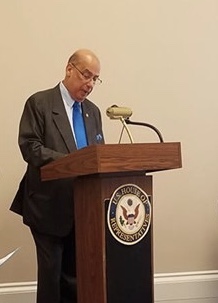 Speaking at US Capitol Hill in behalf of CARICOM during Caribbean Legislative Week on 5 June 2019
Speaking at US Capitol Hill in behalf of CARICOM during Caribbean Legislative Week on 5 June 2019
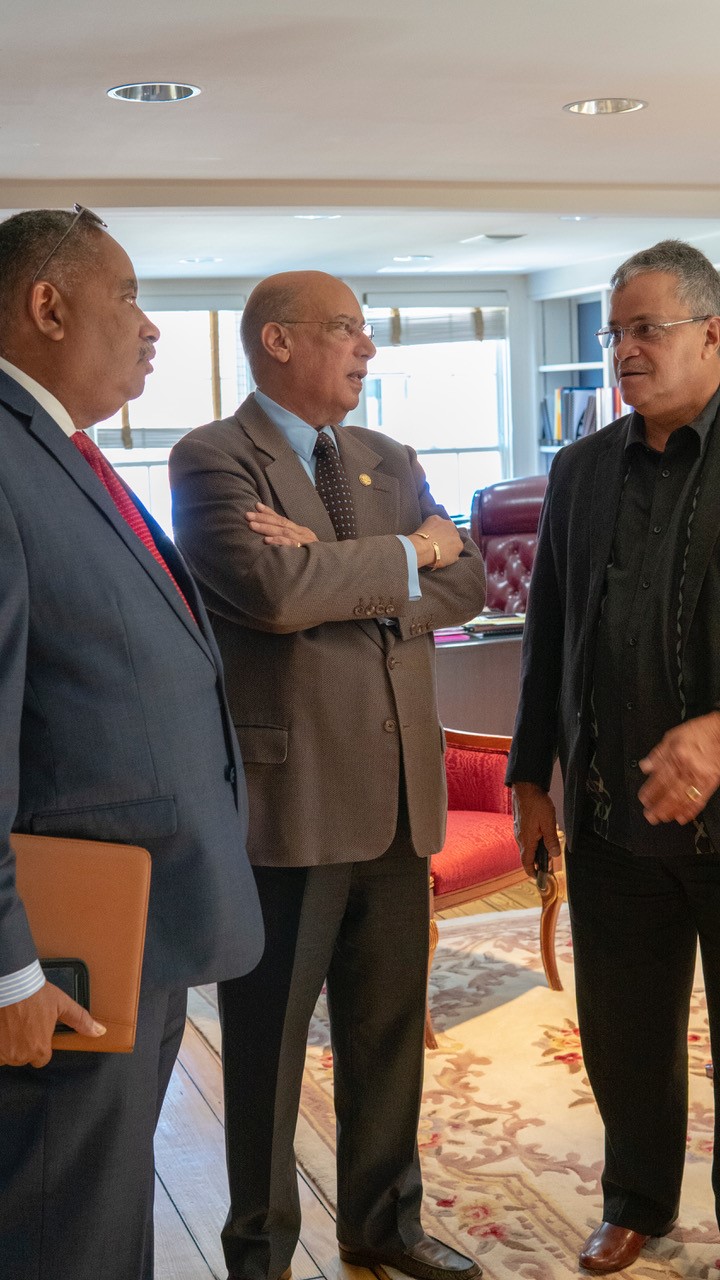 Meeting Wesley Kirton Co-Chair Caribbean Studies Associaton, US, and Captain Gerry Gouveia of the Guyana Privat Sector at Antigua and Barbuda Embassy, Washington, DC on 4 June 2019
Meeting Wesley Kirton Co-Chair Caribbean Studies Associaton, US, and Captain Gerry Gouveia of the Guyana Privat Sector at Antigua and Barbuda Embassy, Washington, DC on 4 June 2019
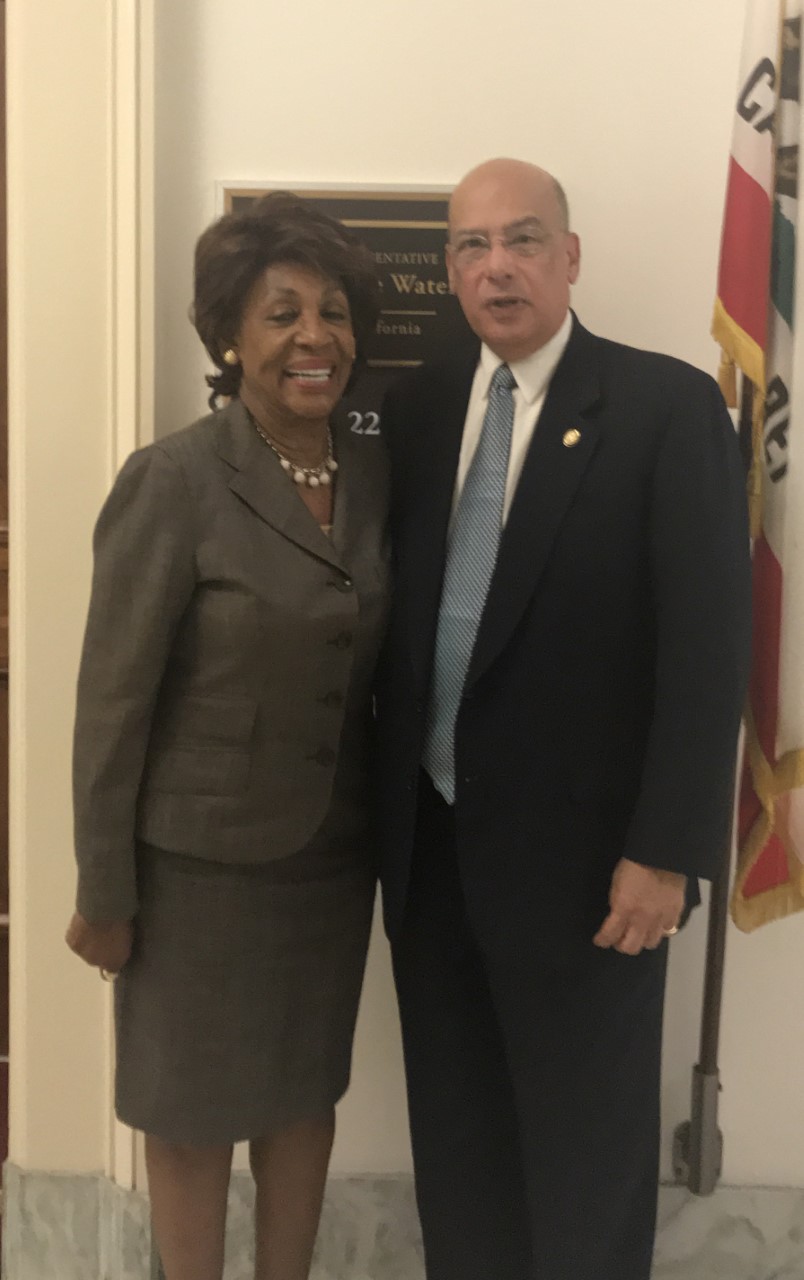 On 15 May, 2019 with the formidable US Congresswoman Maxine Waters who is Chair of the Financail Services Committee of the US House of Representatives. I had presentred the case against de-risking, withdrawal of correspondent banking relations and blacklisting alone with CARICOM Ministers of National Security.
On 15 May, 2019 with the formidable US Congresswoman Maxine Waters who is Chair of the Financail Services Committee of the US House of Representatives. I had presentred the case against de-risking, withdrawal of correspondent banking relations and blacklisting alone with CARICOM Ministers of National Security.
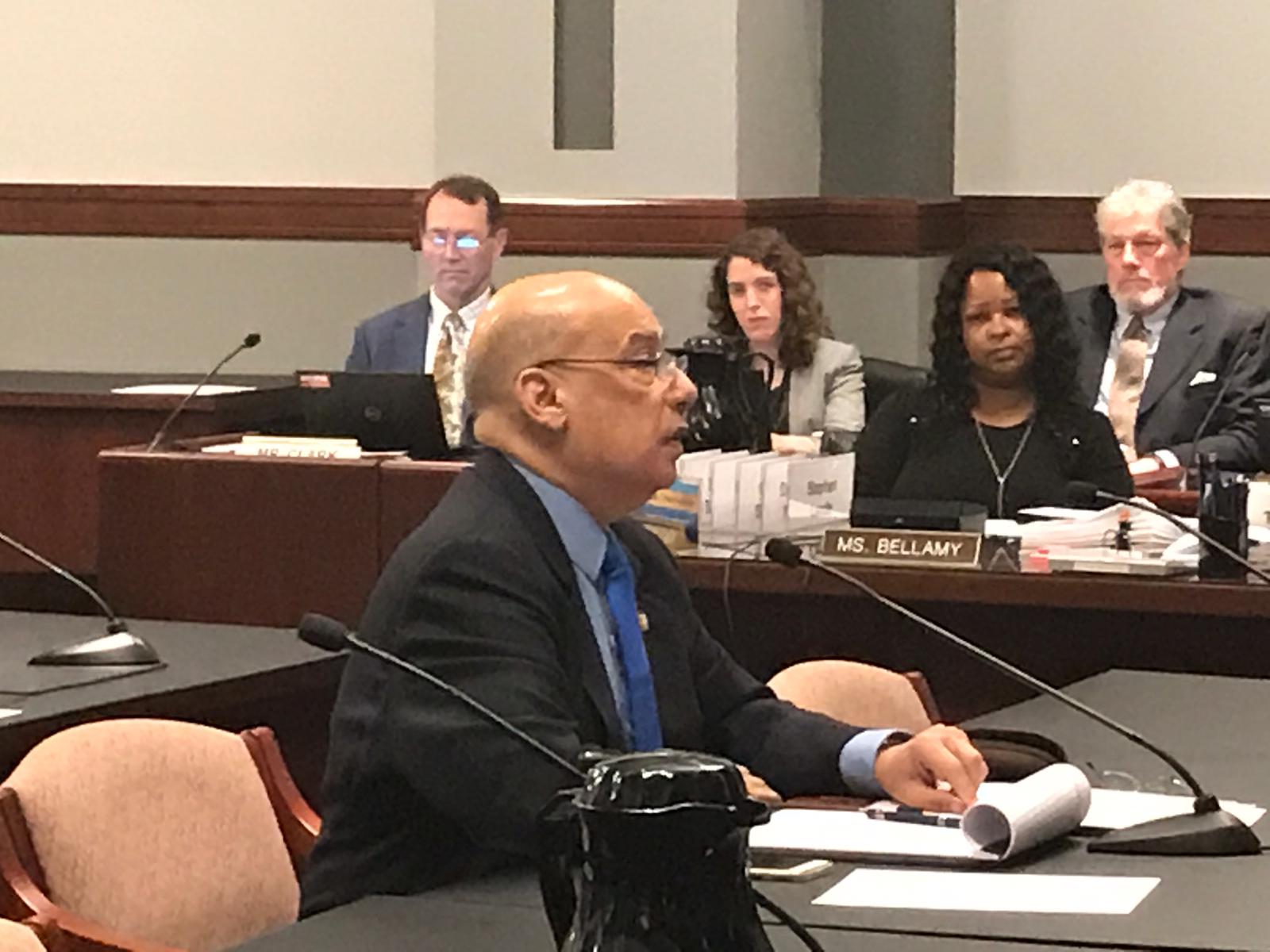 Testifying on 14th May, 2019 before the US International Trade Commission on behalf of Antigua and Barbuda and Caribbaean States on the perennial US trade surplus with the region which reached $7 Billion in 2018.
Testifying on 14th May, 2019 before the US International Trade Commission on behalf of Antigua and Barbuda and Caribbaean States on the perennial US trade surplus with the region which reached $7 Billion in 2018.
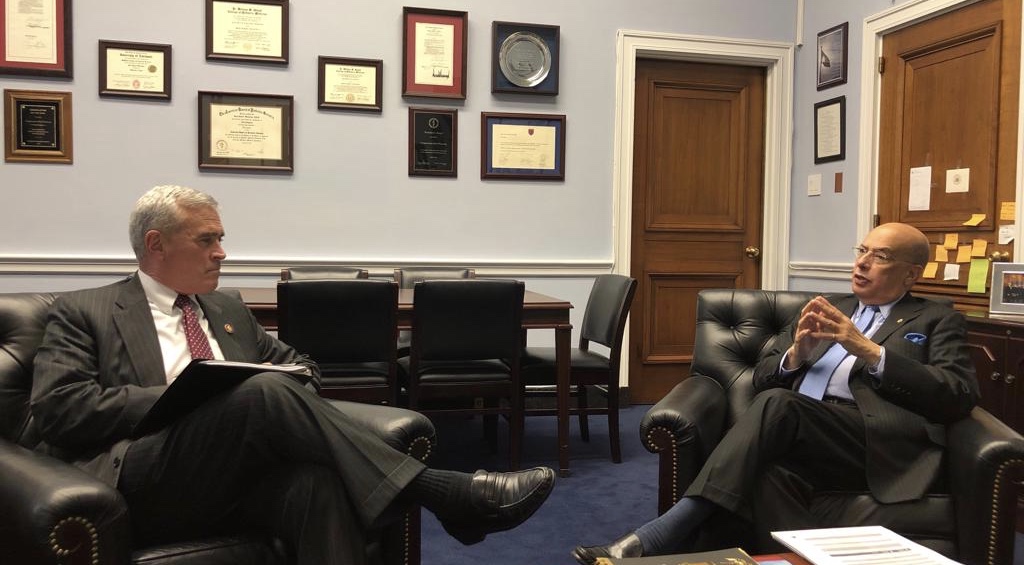 Sir Ronald at Capitol Hill in Washington DC, talking trade and other relations between the US and CARICOM countries, especially Antigua and Barbuda, with Cingressman Brad Wenstrup (R-Cincinnati) on 27 February 2019.
Sir Ronald at Capitol Hill in Washington DC, talking trade and other relations between the US and CARICOM countries, especially Antigua and Barbuda, with Cingressman Brad Wenstrup (R-Cincinnati) on 27 February 2019.
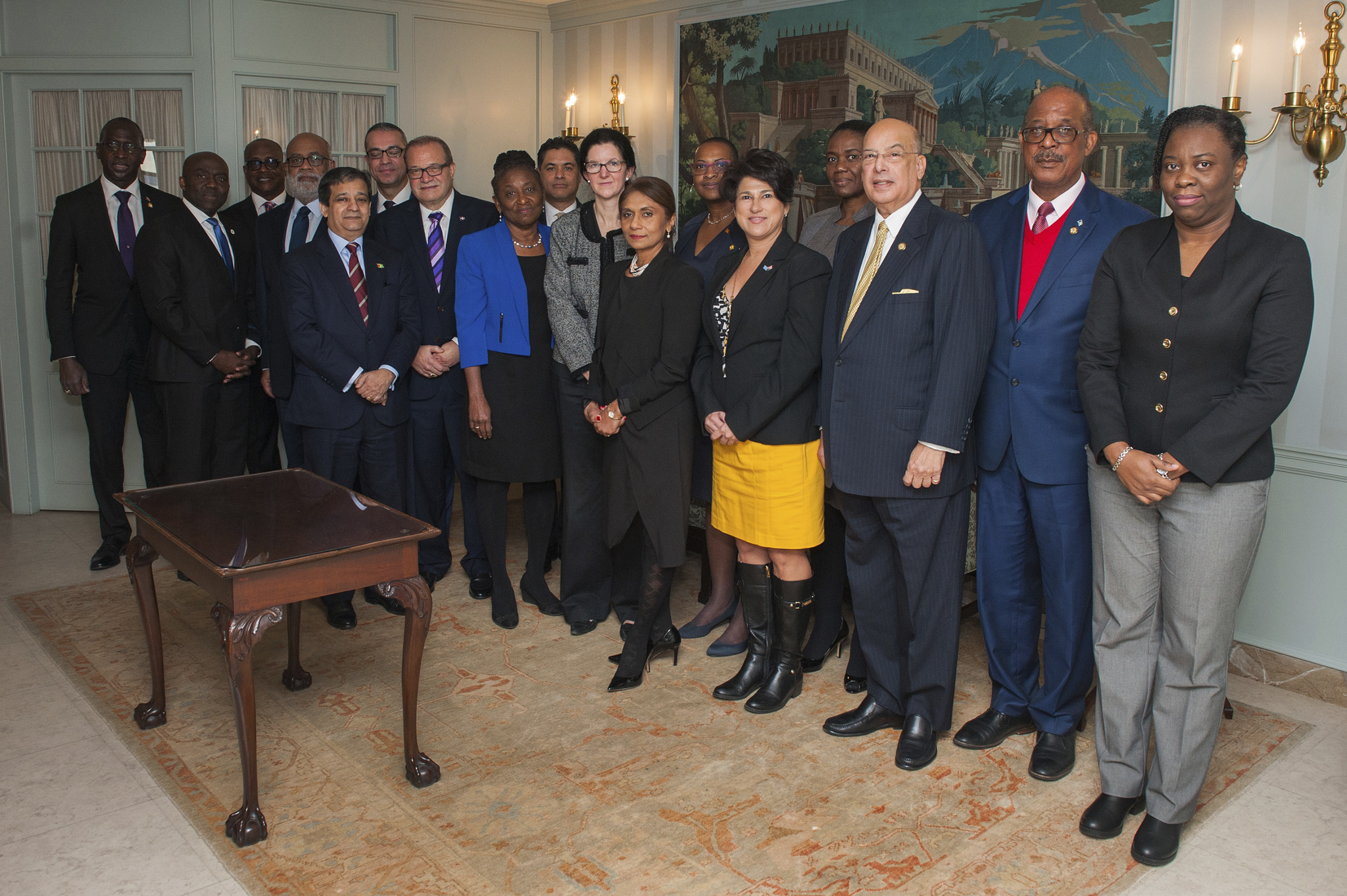 Caribbean Ambassadors in Washington with US Assistant Secretary, Bureau of Western Hemisphere Affairs. Kim Breier, at the US State Department. Sir Ronald third from right in January 2019.
Caribbean Ambassadors in Washington with US Assistant Secretary, Bureau of Western Hemisphere Affairs. Kim Breier, at the US State Department. Sir Ronald third from right in January 2019.
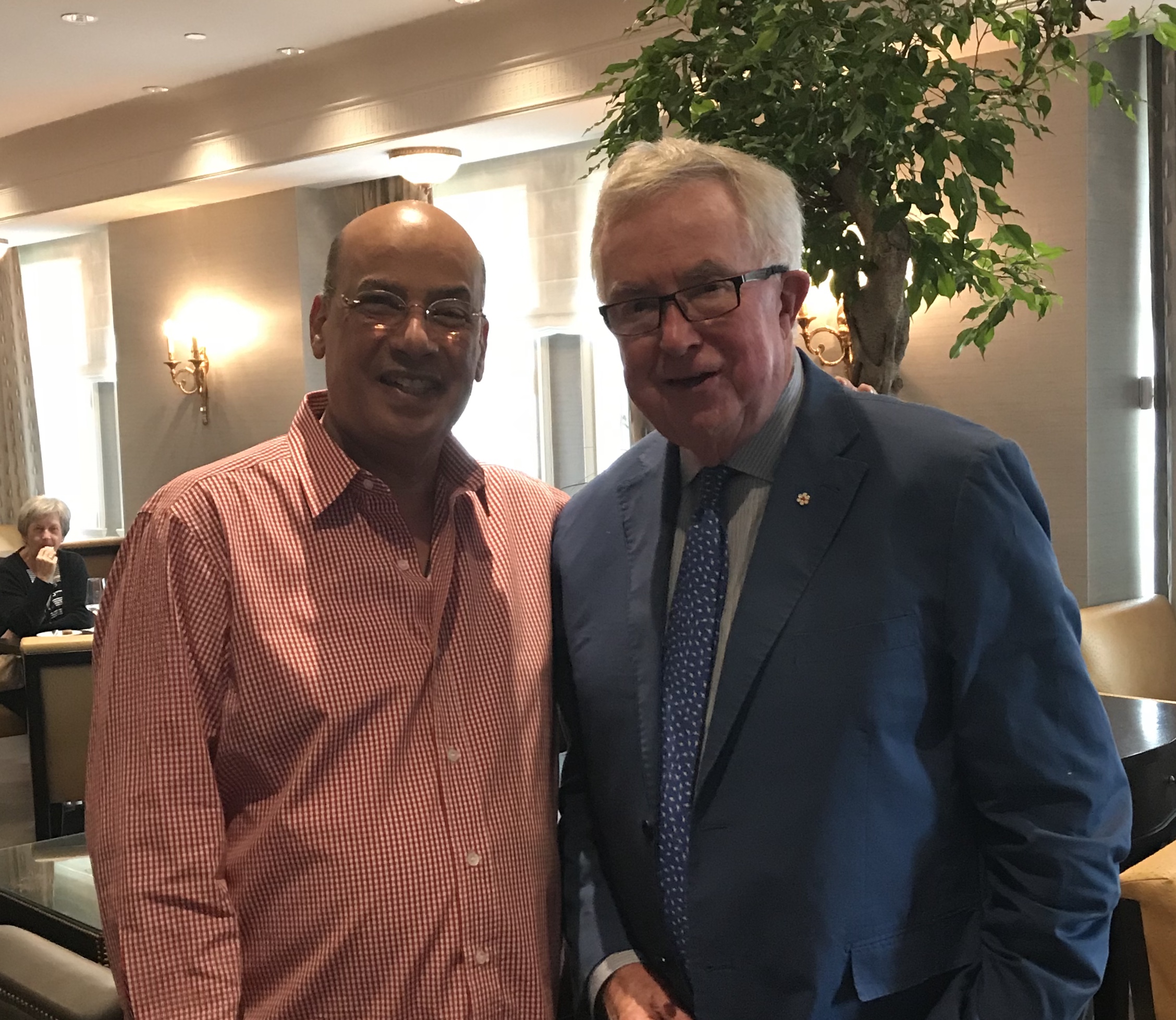 In July 2018, while in Ottawa for Antigua and Barbuda bilateral talks with Canadian government officials, Sir Ron ran into old and repected friend, Joe Clarke - former Prime Minister and Foreign Minister of Canada and a great warrior in the anti-apartheid struggle.
In July 2018, while in Ottawa for Antigua and Barbuda bilateral talks with Canadian government officials, Sir Ron ran into old and repected friend, Joe Clarke - former Prime Minister and Foreign Minister of Canada and a great warrior in the anti-apartheid struggle.
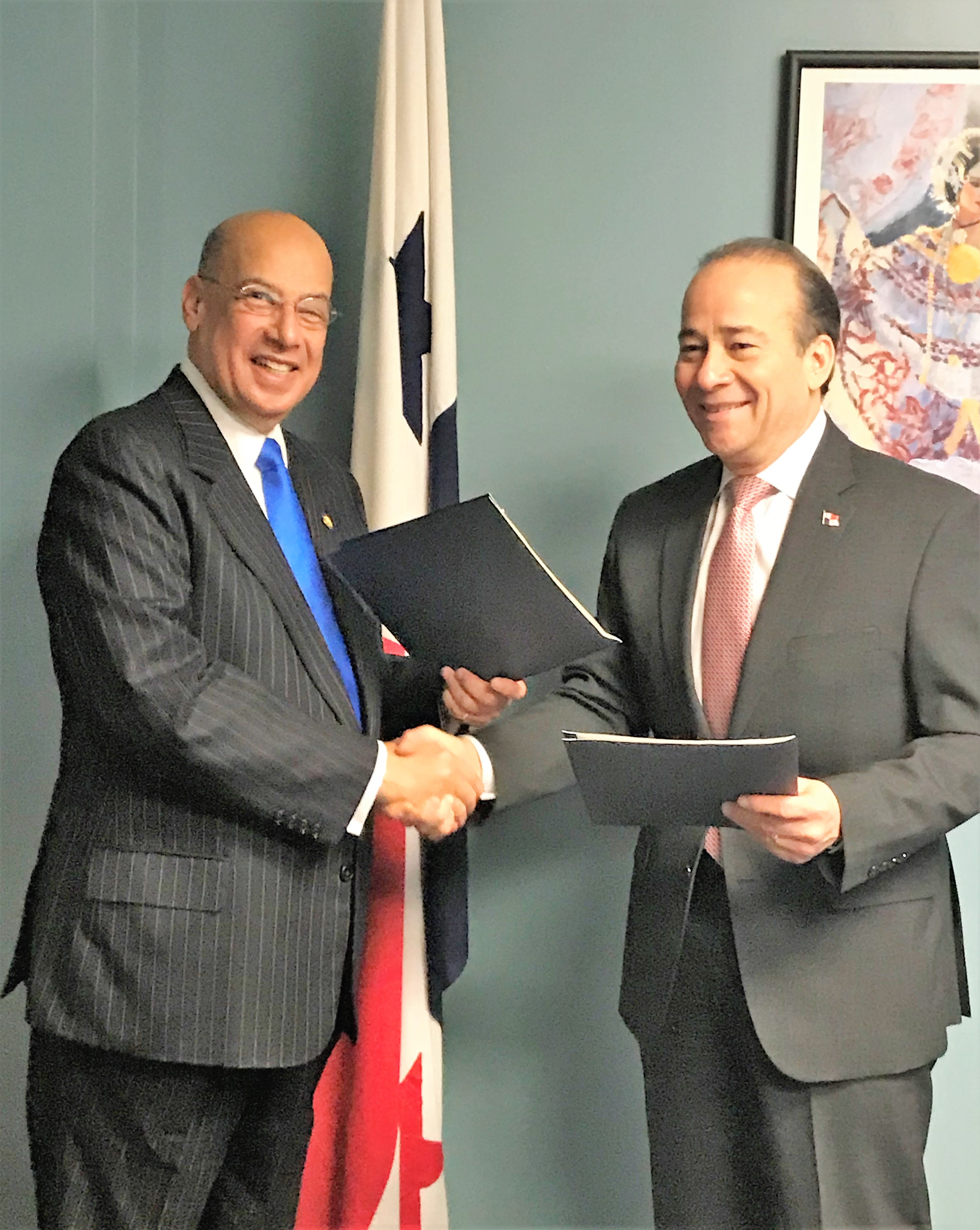 With Ambassador Jesus Silvera of Panama, receiving a donation to the rebuilding of Barbuda, June 2018
With Ambassador Jesus Silvera of Panama, receiving a donation to the rebuilding of Barbuda, June 2018
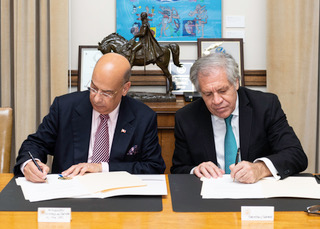 With OAS Secretary-General, Luis Almagro, on 6 June 2018, signing the Inter-American Convention against Racism, Racial Discrimination and Related Forms of Intolerance. Antigua and Barbuda was the first signatory to the Convention and the second country to ratify the Convention.
With OAS Secretary-General, Luis Almagro, on 6 June 2018, signing the Inter-American Convention against Racism, Racial Discrimination and Related Forms of Intolerance. Antigua and Barbuda was the first signatory to the Convention and the second country to ratify the Convention.
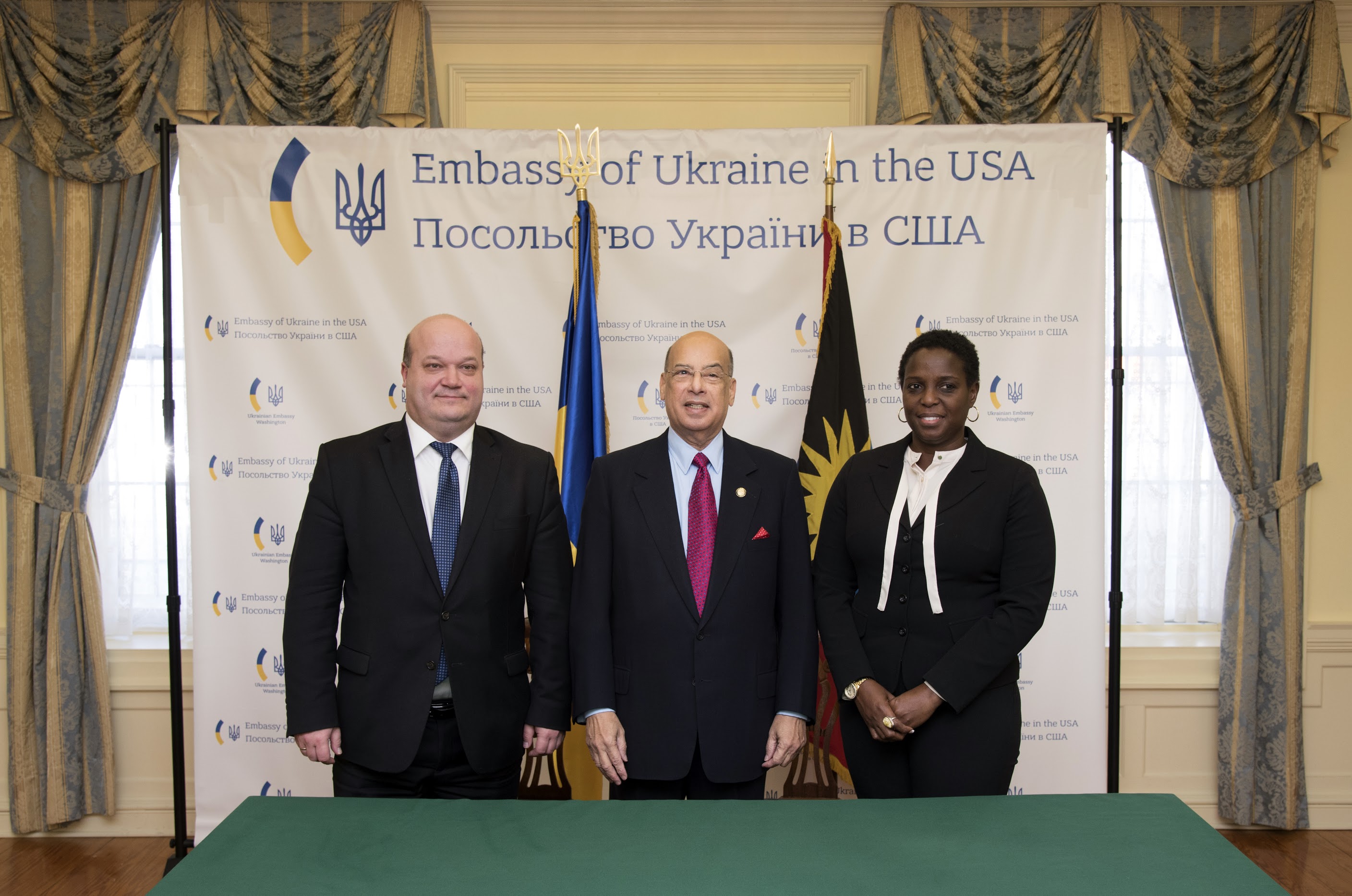 Signing ceremony in Washington, DC of Abolition of Visa Requirements between Ukraine and Antigua and Barbuda in May 2018. Ukraine Amnbasador (left) and Joy-Dee Davis, Minister Counsellor, Antigua and Barbuda Embassy (right)
Signing ceremony in Washington, DC of Abolition of Visa Requirements between Ukraine and Antigua and Barbuda in May 2018. Ukraine Amnbasador (left) and Joy-Dee Davis, Minister Counsellor, Antigua and Barbuda Embassy (right)
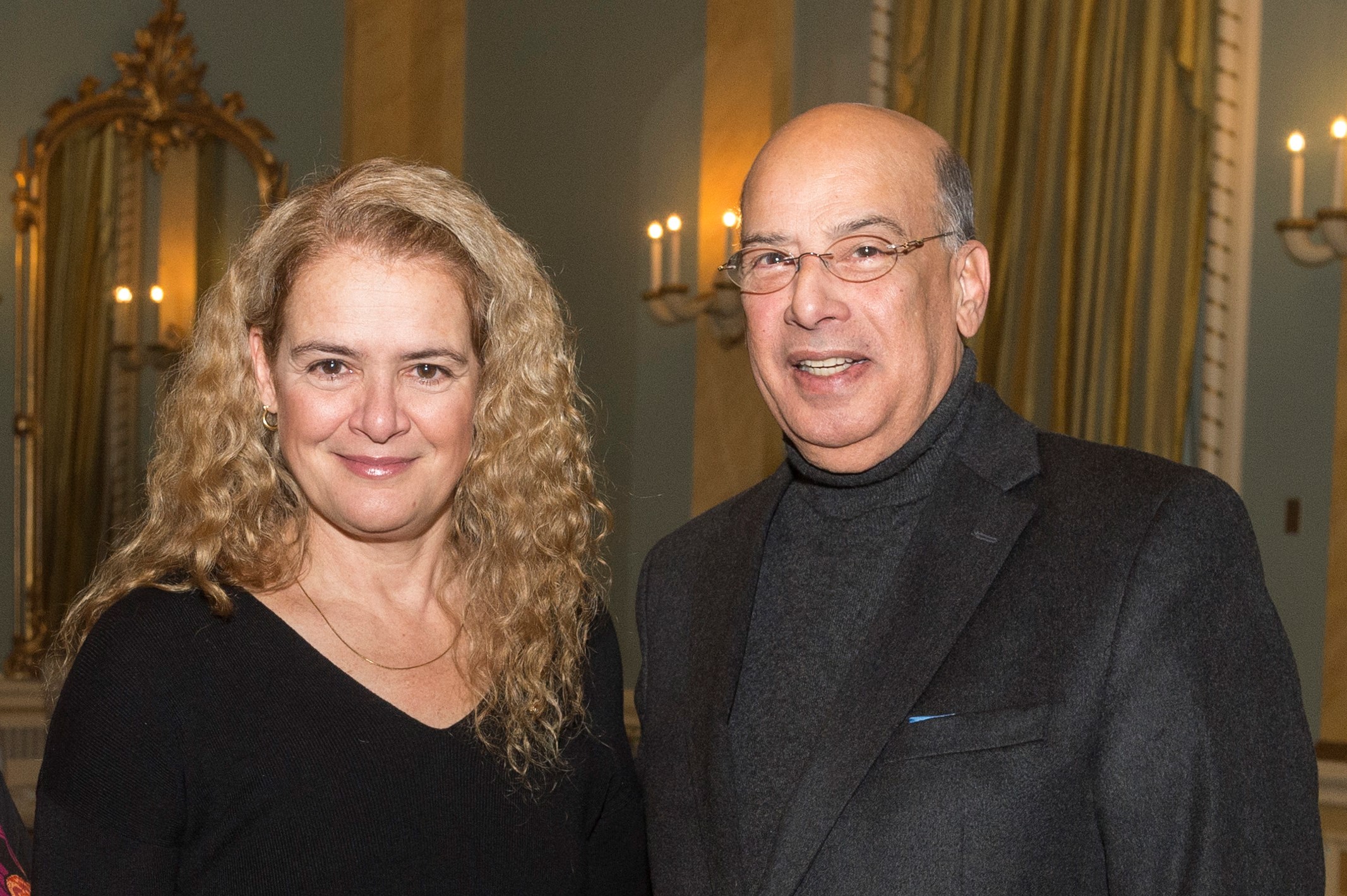 With Governor-General of Canada,Her Excellency Julie Payette, at Rideau Hall in Ottawa on January 30th 2018. In addition to beeing accredited to Canada as High Commissioner, I have the honour of sharing the distinction with this amazing former Astronaut of being a Senior Fellow at Massey College in the University of Toronto.
With Governor-General of Canada,Her Excellency Julie Payette, at Rideau Hall in Ottawa on January 30th 2018. In addition to beeing accredited to Canada as High Commissioner, I have the honour of sharing the distinction with this amazing former Astronaut of being a Senior Fellow at Massey College in the University of Toronto.
.jpg) In Tobago after delivering feature address at The Tobago Finance week on 13 November 2017. Photo shows, Economist Terrence Farrell, Sir Ronald, Tobago Deputy Chief Secretary Joel Jack, and Anthony Pierre, Chairman of the Caribbean Association of Chartered Accountants
In Tobago after delivering feature address at The Tobago Finance week on 13 November 2017. Photo shows, Economist Terrence Farrell, Sir Ronald, Tobago Deputy Chief Secretary Joel Jack, and Anthony Pierre, Chairman of the Caribbean Association of Chartered Accountants
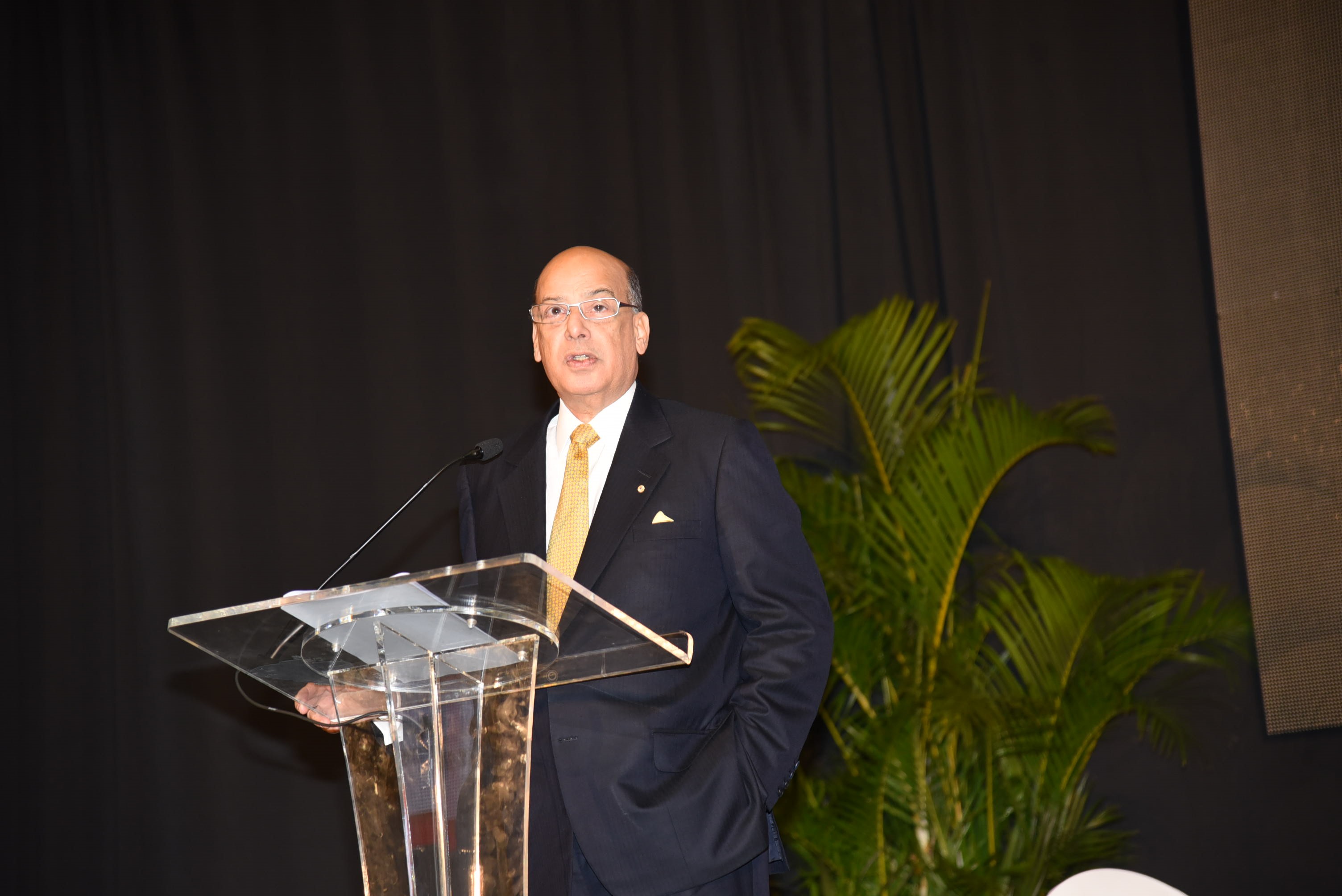 In Port-of-Spain, Trinidad speaking at the annual Conference of the Institute of Chartered Accountants of Trinidad and Tobago on 9 November 2017
In Port-of-Spain, Trinidad speaking at the annual Conference of the Institute of Chartered Accountants of Trinidad and Tobago on 9 November 2017
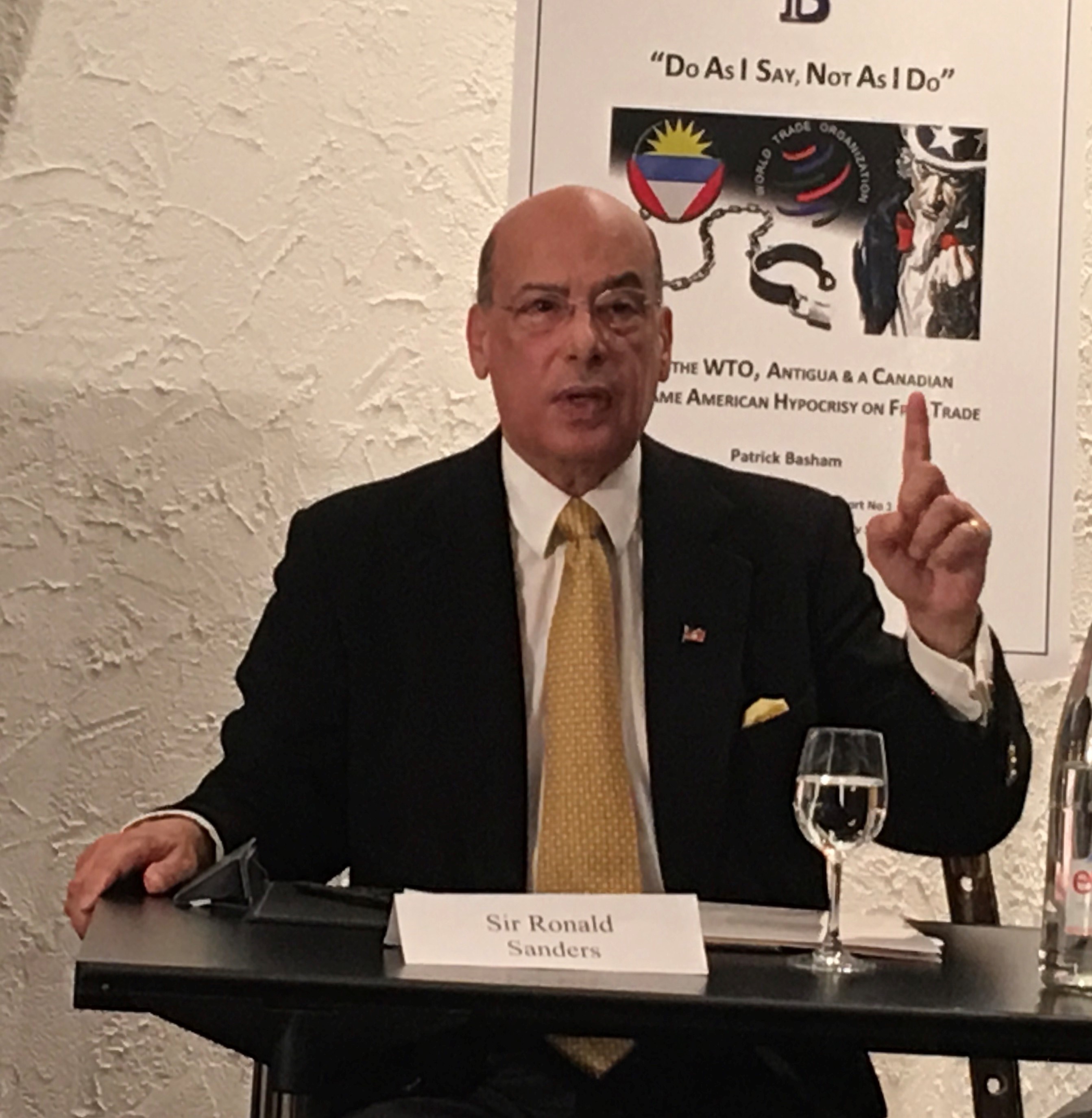 Speaking at a meeting in Geneva, prior to appearnace at the World Trade Organisation on Antigua and Barbuda's contention with the US government on the WTO award to Antigua over Internet Gaming, September 2017
Speaking at a meeting in Geneva, prior to appearnace at the World Trade Organisation on Antigua and Barbuda's contention with the US government on the WTO award to Antigua over Internet Gaming, September 2017
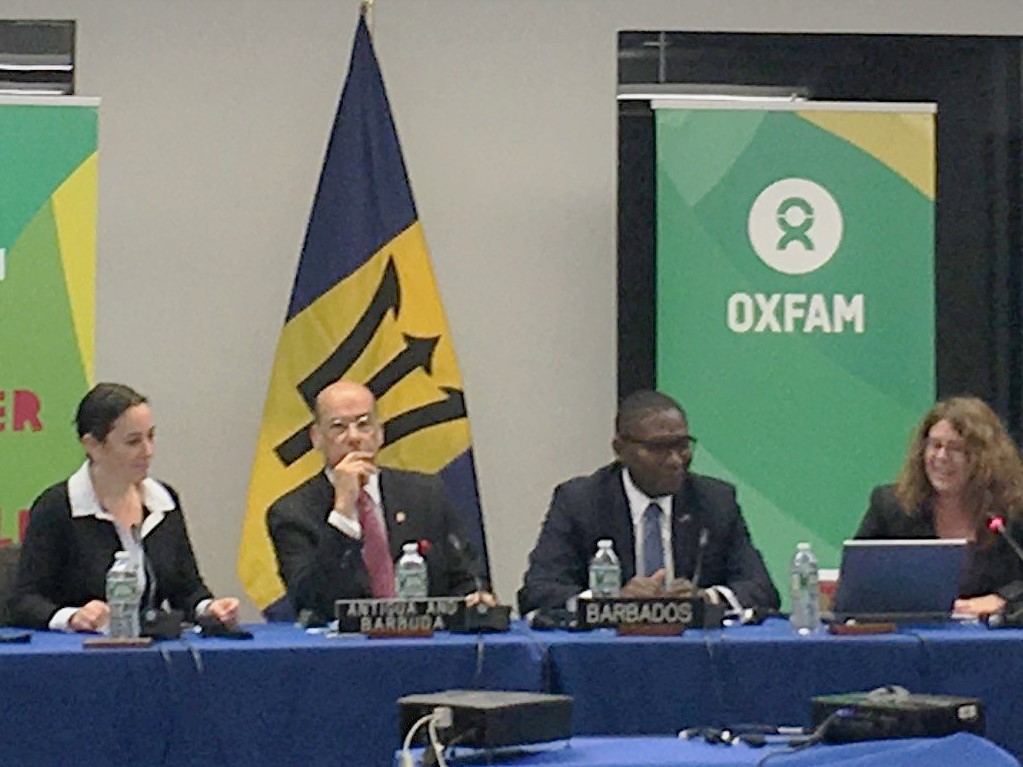 Speaking on Refugees resulting from Climate Change and the growing danger to small island states at an event organised by OXFAM in Washington, DC on 30 October 2017. (Heather Coleman, OXFAM; Sir Ronald Sanders, Antigua and Barbuda; Selwyn Hart (Barbados), Lisa Friedman, New York Times)
Speaking on Refugees resulting from Climate Change and the growing danger to small island states at an event organised by OXFAM in Washington, DC on 30 October 2017. (Heather Coleman, OXFAM; Sir Ronald Sanders, Antigua and Barbuda; Selwyn Hart (Barbados), Lisa Friedman, New York Times)
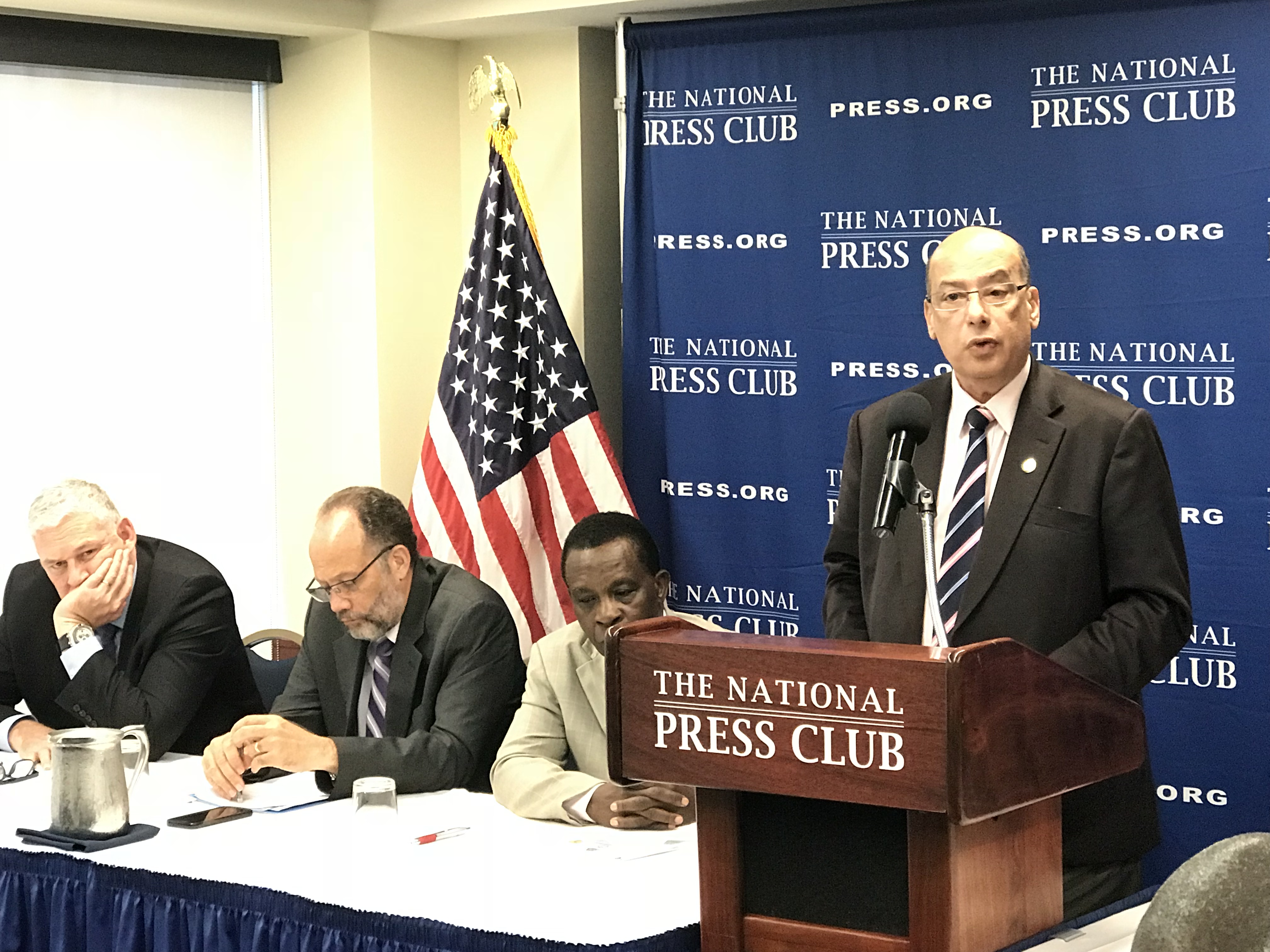 Sir Ronald speaking at the National Press Club in Washington DC on 12 October 2017. He was talking about the devastation of Barbuda by Hurricane Irma and the remedies for Climate Change and Global Warming. To his left are: The Prime Minister of Grenada Dr Keith Mitchell, CARICOM Secretary General Irwin la Rocque and St Lucia Prime Minister Alan Chastanet
Sir Ronald speaking at the National Press Club in Washington DC on 12 October 2017. He was talking about the devastation of Barbuda by Hurricane Irma and the remedies for Climate Change and Global Warming. To his left are: The Prime Minister of Grenada Dr Keith Mitchell, CARICOM Secretary General Irwin la Rocque and St Lucia Prime Minister Alan Chastanet
.JPG) Sir Ronald speaking at the Centre for Strategic and International Studies (CSIS) on the security and other threats posed to the Caribbean and the Hemisphere of Climate Change and Global Warming on 13 September 2017
Sir Ronald speaking at the Centre for Strategic and International Studies (CSIS) on the security and other threats posed to the Caribbean and the Hemisphere of Climate Change and Global Warming on 13 September 2017
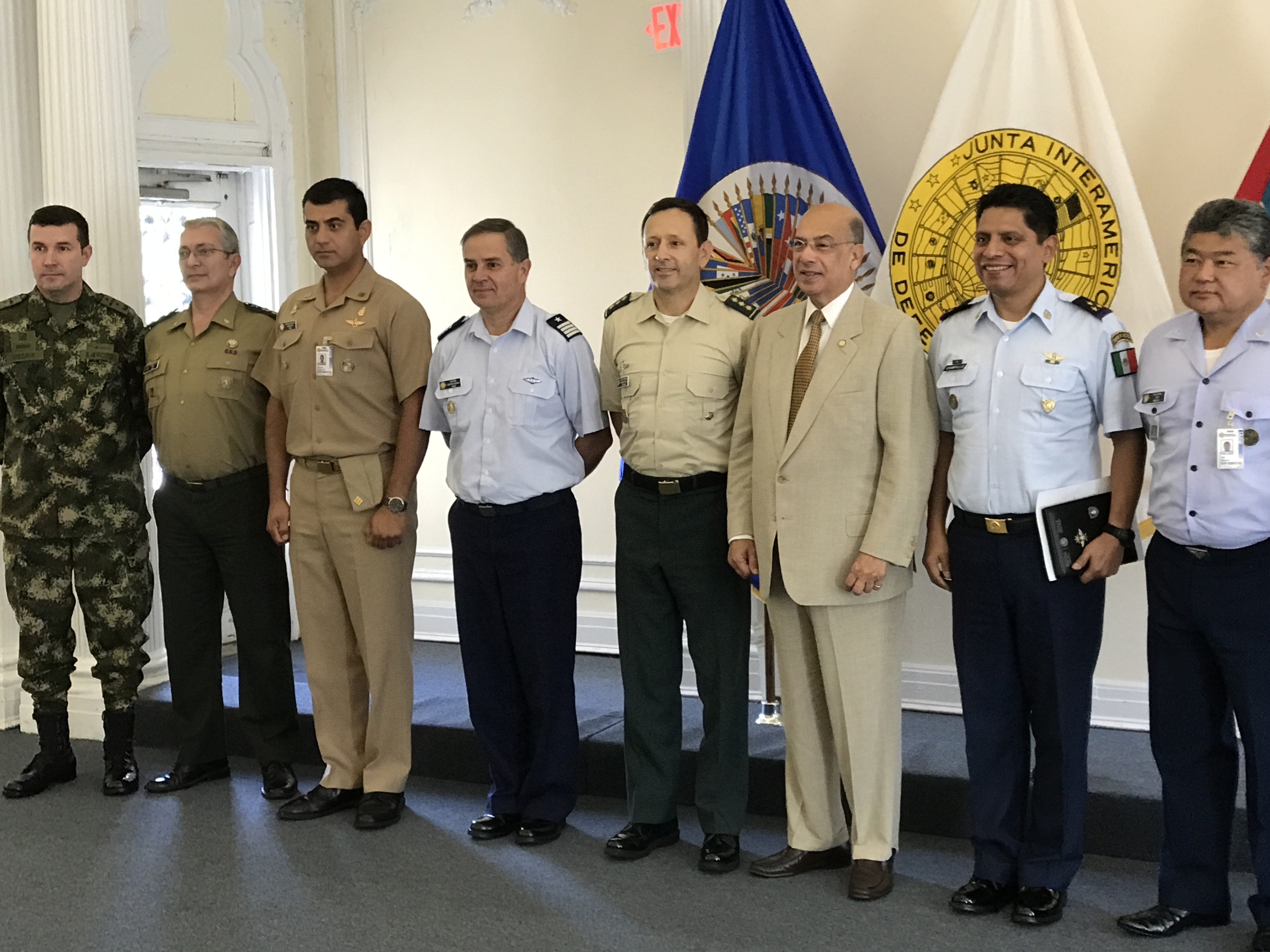 Sir Ronald (third right) with senior officers of the Inter-American Defense Board in Washington, DC after discussing what assistance could be given in the clean up and rebuilding of Barbuda after Hurricane Irma (Friday, 15 September 2017)
Sir Ronald (third right) with senior officers of the Inter-American Defense Board in Washington, DC after discussing what assistance could be given in the clean up and rebuilding of Barbuda after Hurricane Irma (Friday, 15 September 2017)
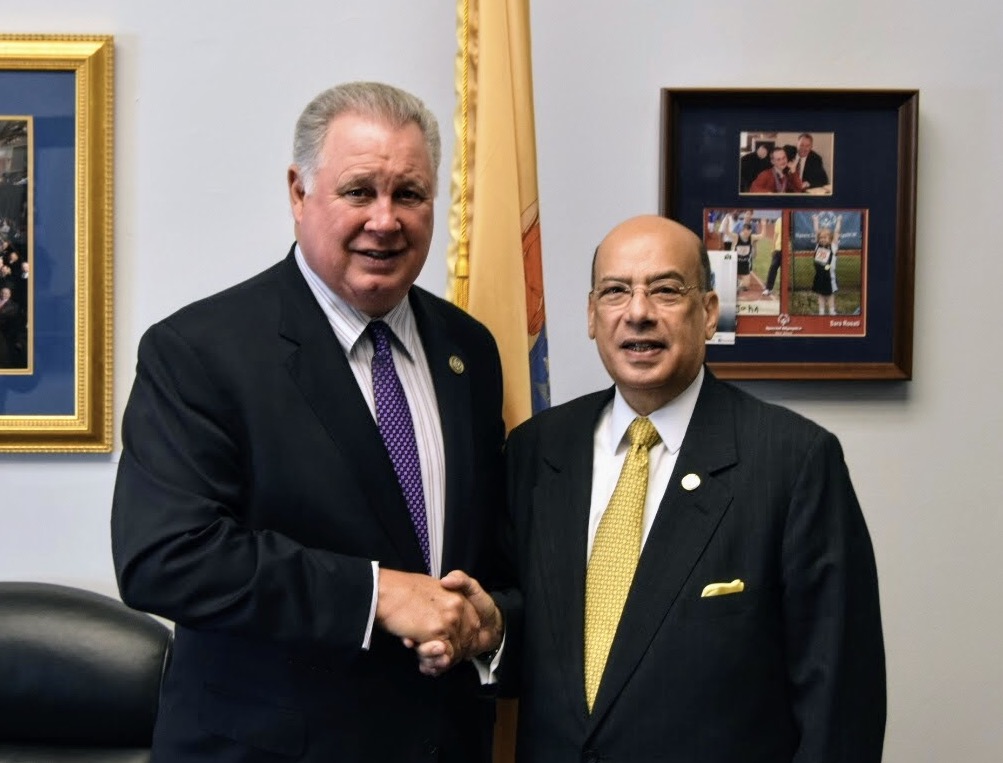 With US Congressman, Ranking member of Committee on Foreign Affairs at Capitol Hill on 14 September, discussiing secutty matters, Hurricane Irma and Barbuda and the US-Antigua and Barbuda WTO issues. Very helpful.
With US Congressman, Ranking member of Committee on Foreign Affairs at Capitol Hill on 14 September, discussiing secutty matters, Hurricane Irma and Barbuda and the US-Antigua and Barbuda WTO issues. Very helpful.
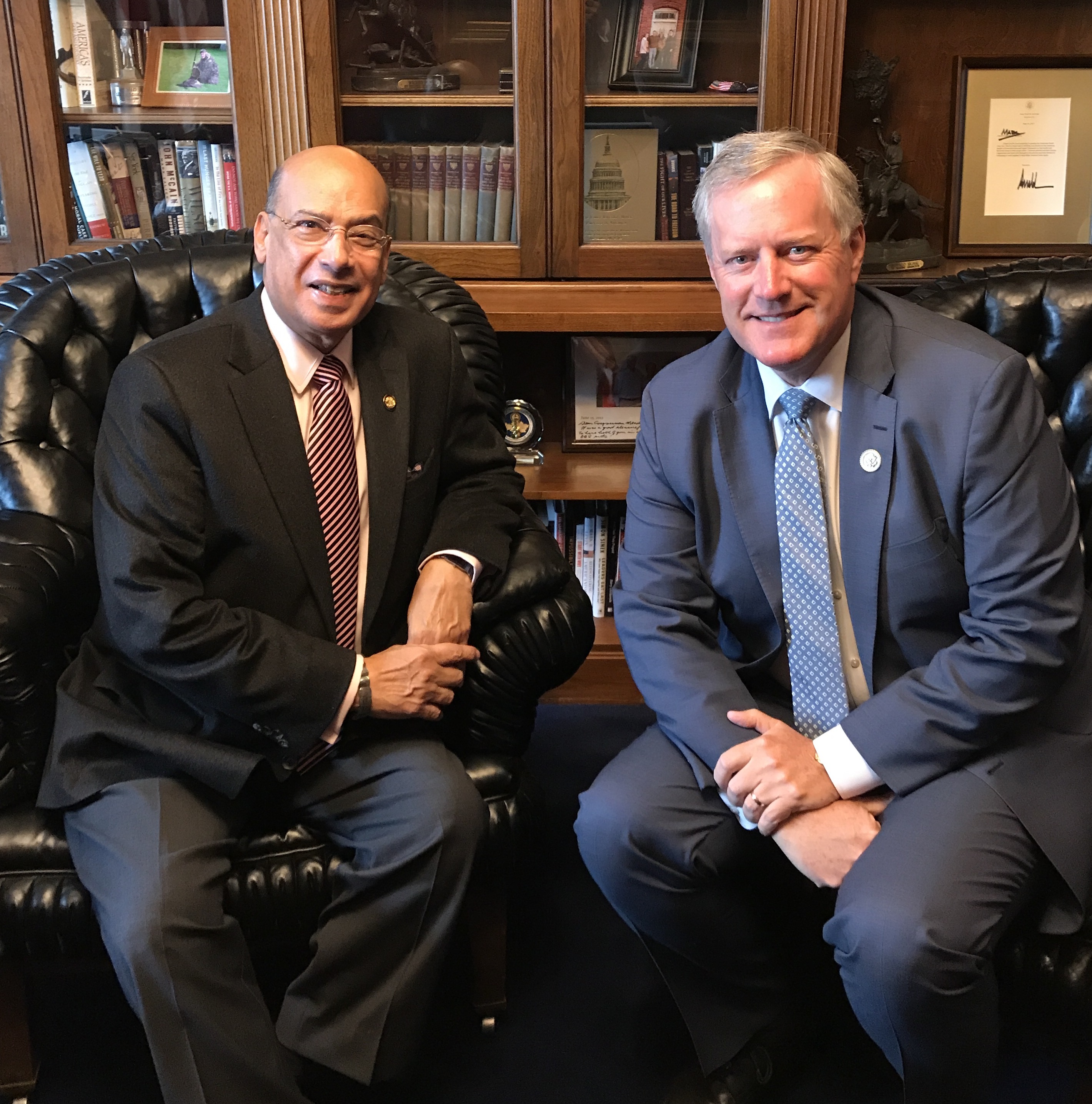 With US Congressman Mark Meadows on Capitol Hill talking the US-Antigua and Barbuda WTO issues, and the effets of Hurricane Irma on the island of Barbuda on 12 September, 2017. Good man.
With US Congressman Mark Meadows on Capitol Hill talking the US-Antigua and Barbuda WTO issues, and the effets of Hurricane Irma on the island of Barbuda on 12 September, 2017. Good man.
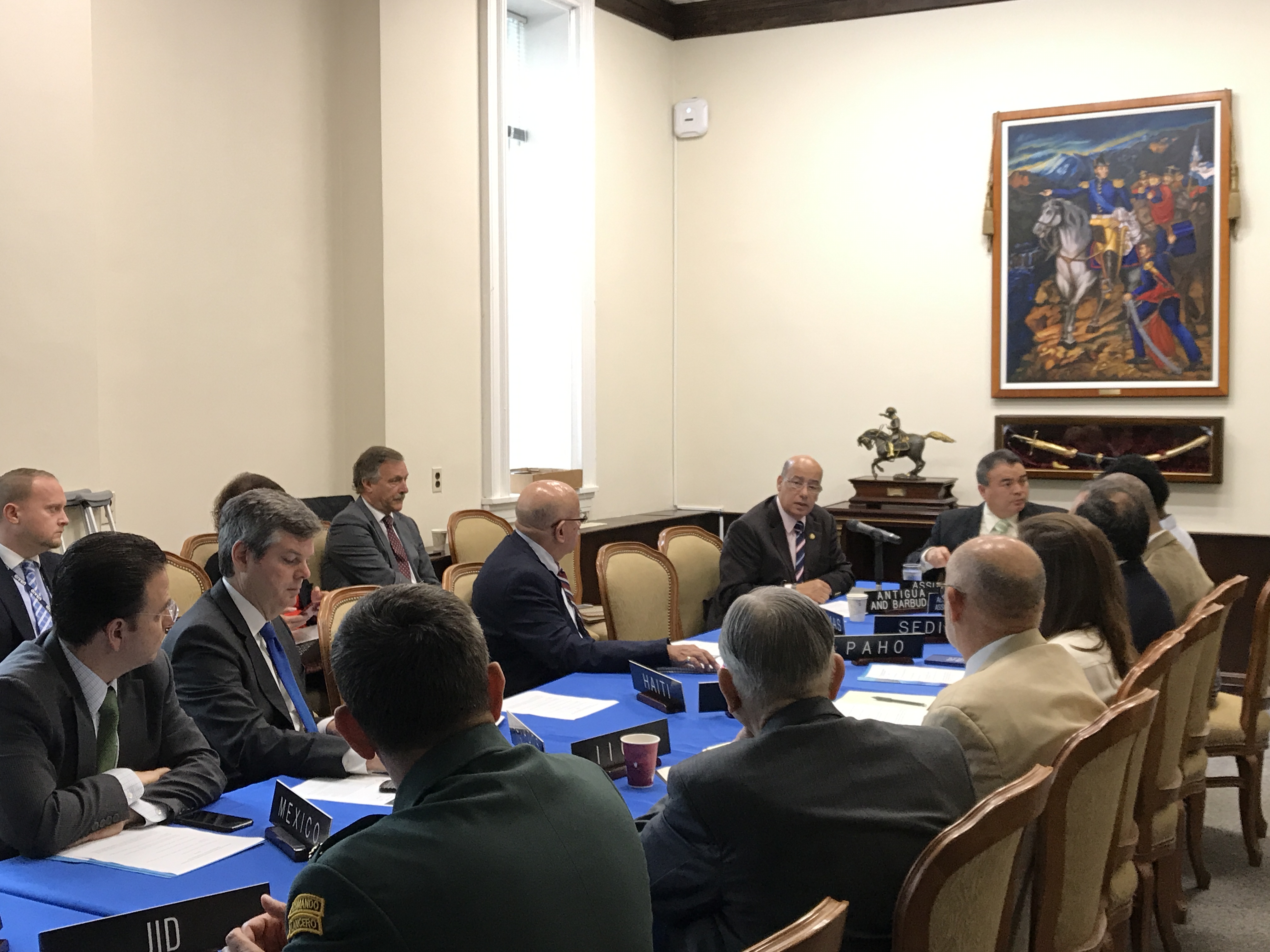 Talking to the Emergency Agencies of the OAS about the impact of Hurricane Irma on the island of Barbuda and seeking assistance on 14 September 2017
Talking to the Emergency Agencies of the OAS about the impact of Hurricane Irma on the island of Barbuda and seeking assistance on 14 September 2017
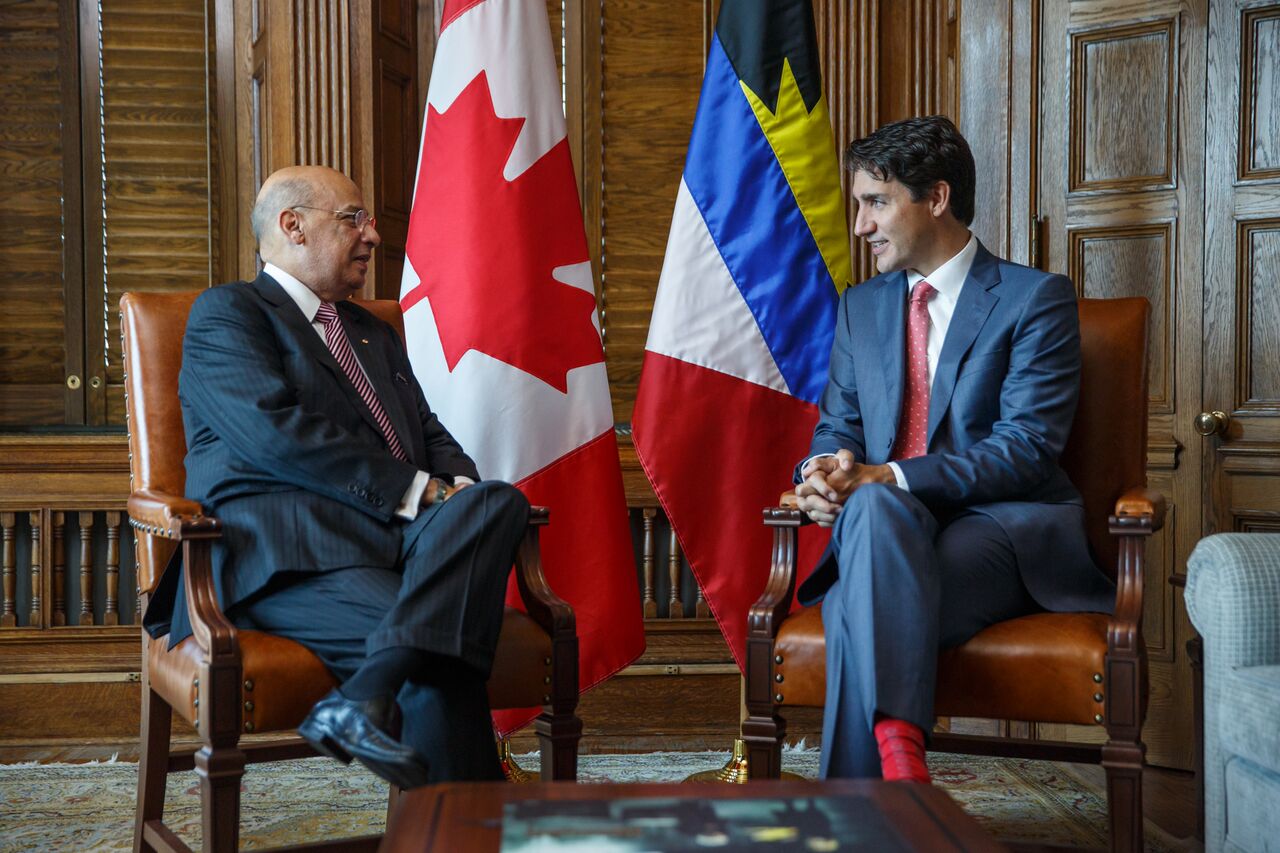 Sir Ronald with Canadian Prime Minister Justin Trudeau in Ottawa on 28 August 2017 discussing Canada-Antigua and Barbuda bilateral matters.
Sir Ronald with Canadian Prime Minister Justin Trudeau in Ottawa on 28 August 2017 discussing Canada-Antigua and Barbuda bilateral matters.
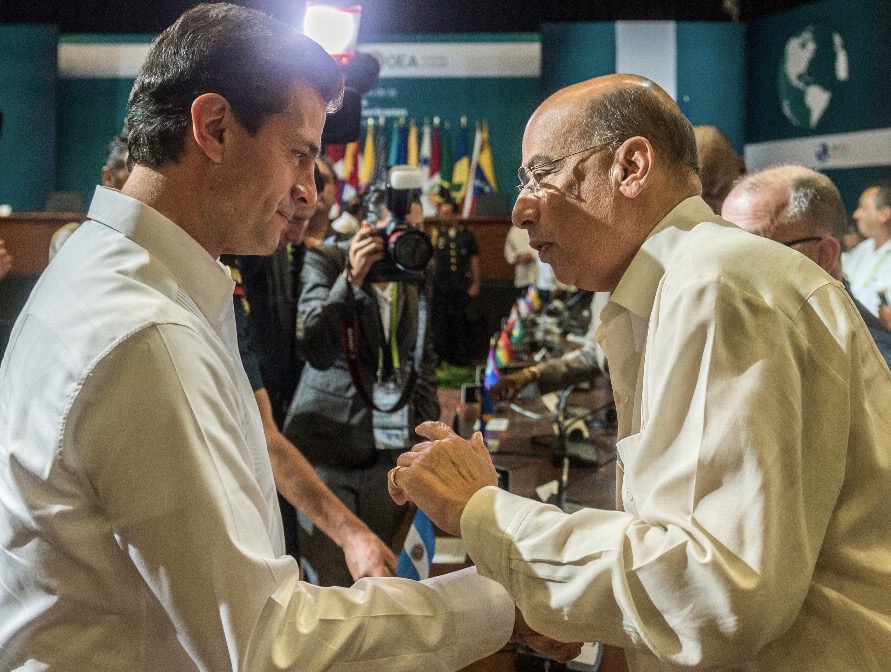 Sir Ronald with the President of Mexico, Enrique Pena Nieto, at the General Assembly of the Organisation of American States in Cancun, in June 2017
Sir Ronald with the President of Mexico, Enrique Pena Nieto, at the General Assembly of the Organisation of American States in Cancun, in June 2017
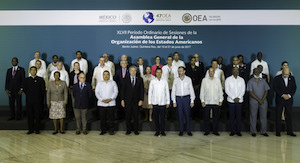 Heads of Delegations to the OAS General Assembly in Cancun. Mexican Presdident, sixth from right, front row. Sir Ronald fourth from right, front row.
Heads of Delegations to the OAS General Assembly in Cancun. Mexican Presdident, sixth from right, front row. Sir Ronald fourth from right, front row.
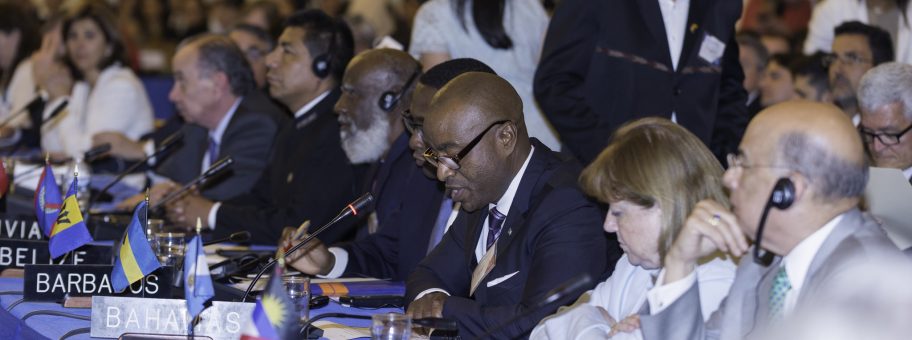 Meeting of Consulation on the situation in Venezuela at the Organisation of American States on 31 May 2017 Sir Ronald (far right).
Meeting of Consulation on the situation in Venezuela at the Organisation of American States on 31 May 2017 Sir Ronald (far right).
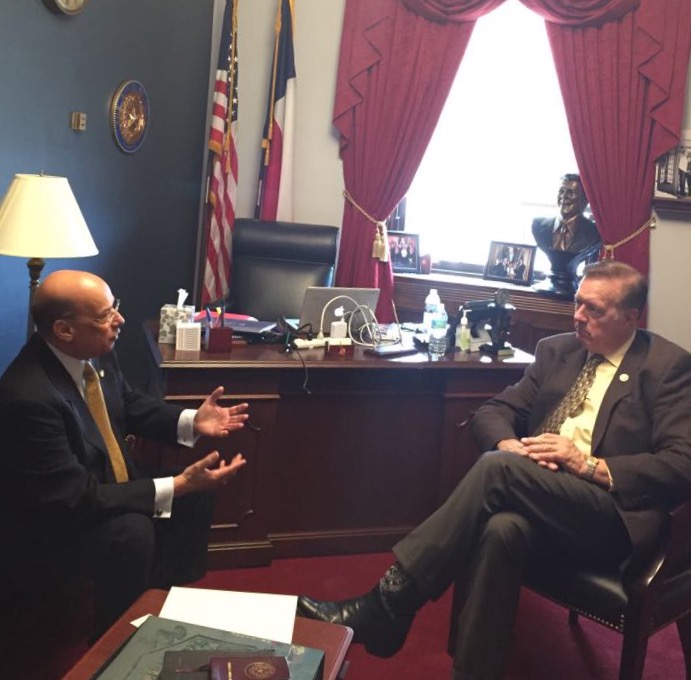
With Texas Congressman Randy Weber at Capitol Hill in Washington DC, talking energy, water and US-Antigua and Barbuda relations on Wednesday 5 April, 2017
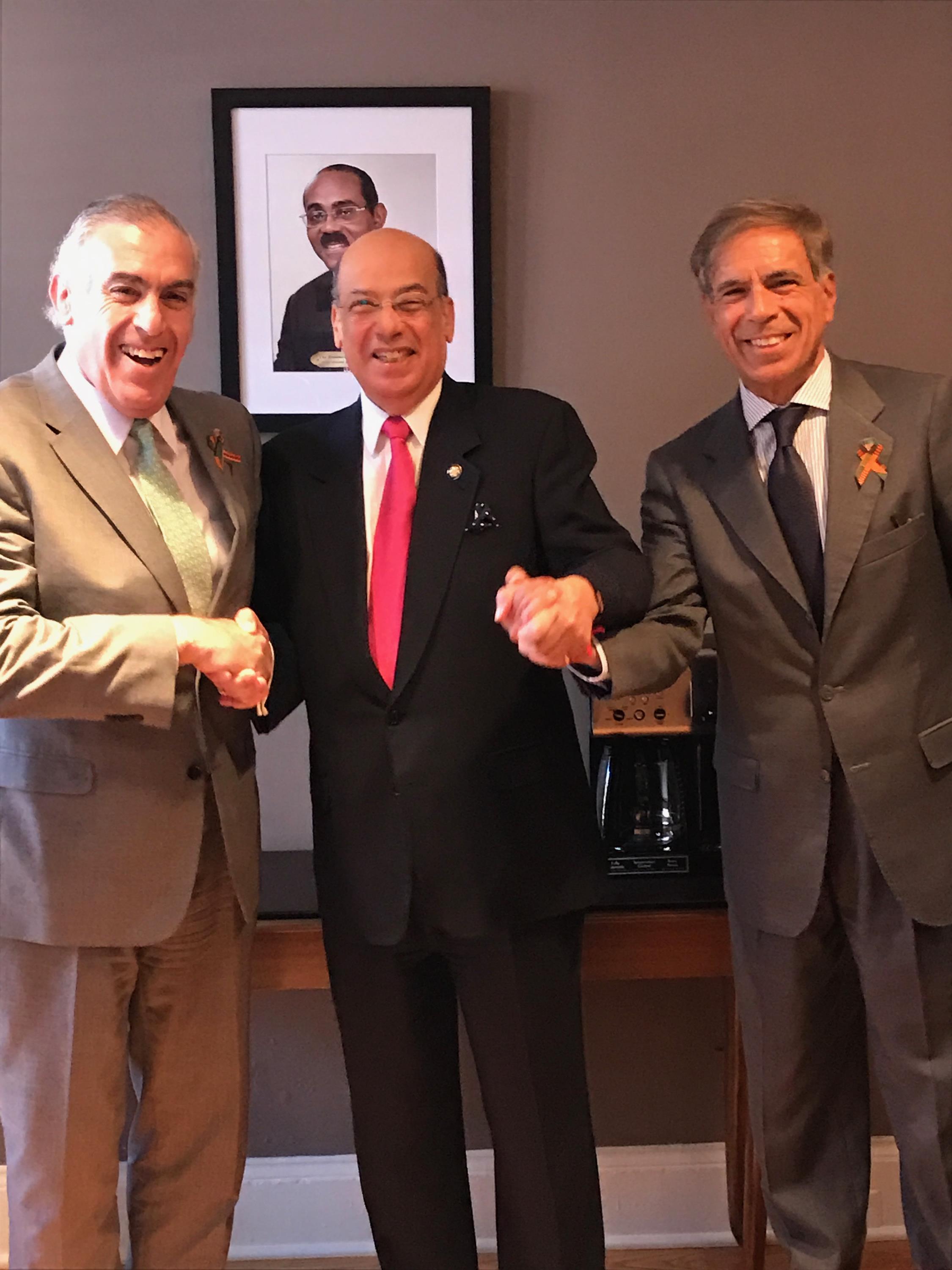
With my colleague Argentine Ambassador to the OAS, Juan Jose Acuri (right) and the Argentina candidate for election to the Inter-American Commission on Human Rigjts Dr Carlos de Casas on 29 March 2016
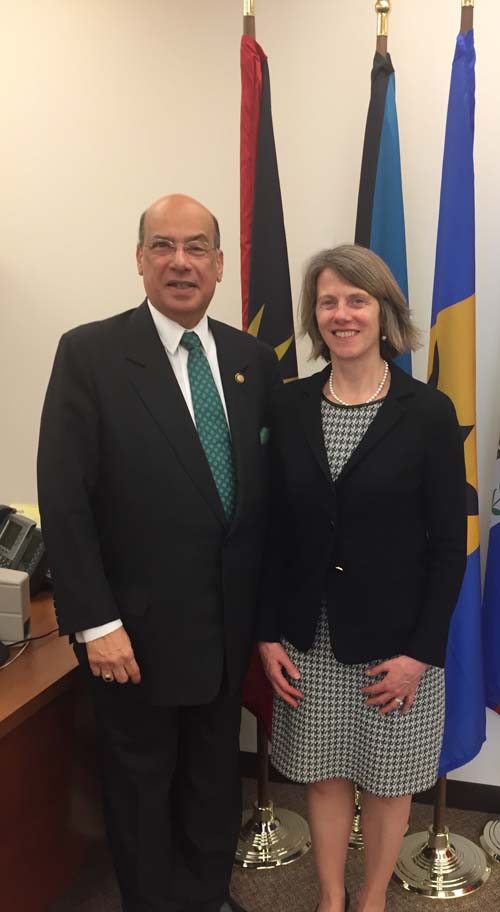 At the International Monetary Fund with Exceutive Director for Canada and the Caribbean, Nancy Horsman, to discuss Antigua and Barbuda matters.
At the International Monetary Fund with Exceutive Director for Canada and the Caribbean, Nancy Horsman, to discuss Antigua and Barbuda matters.
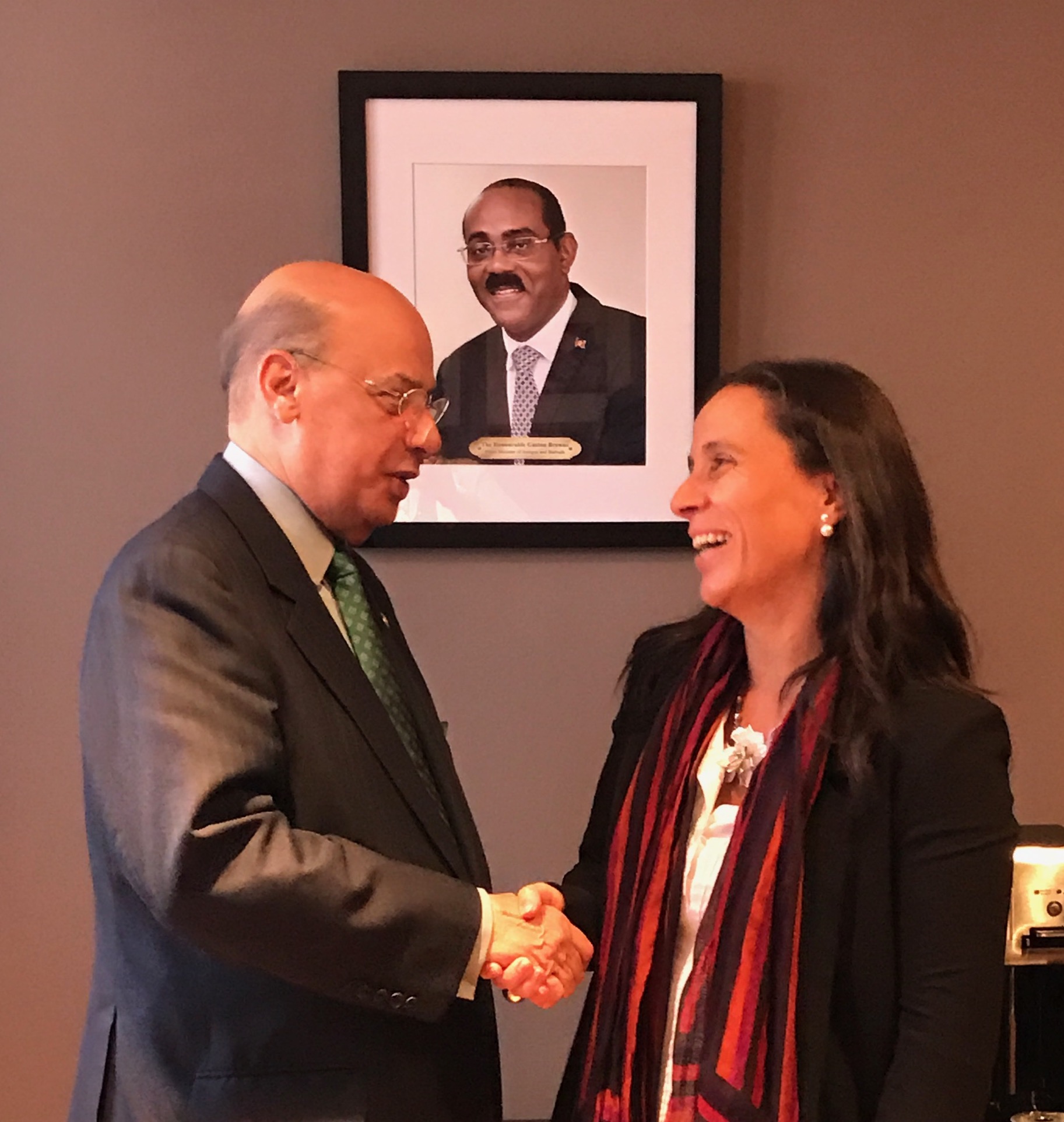
At the Antigua and Barbuda Embassy receiving Antonia Urrejola, the candidate of Chile for the Inter American Commission on Human Rights, on 23 March 2017
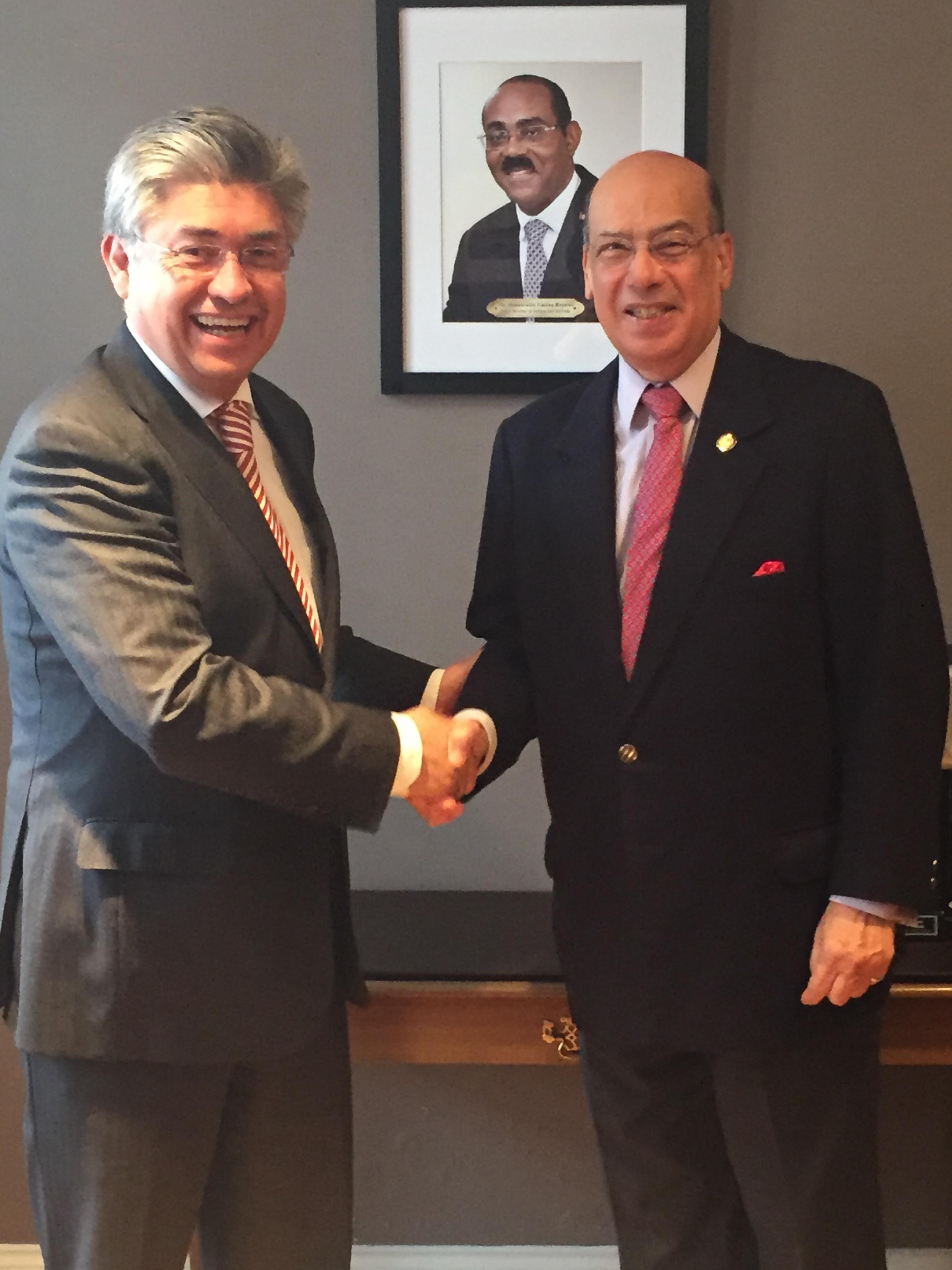 With the Mexican Candidate for the Inter American Commission on Human Rights, Joel Hernadez Garcia, on 21 March 2017
With the Mexican Candidate for the Inter American Commission on Human Rights, Joel Hernadez Garcia, on 21 March 2017
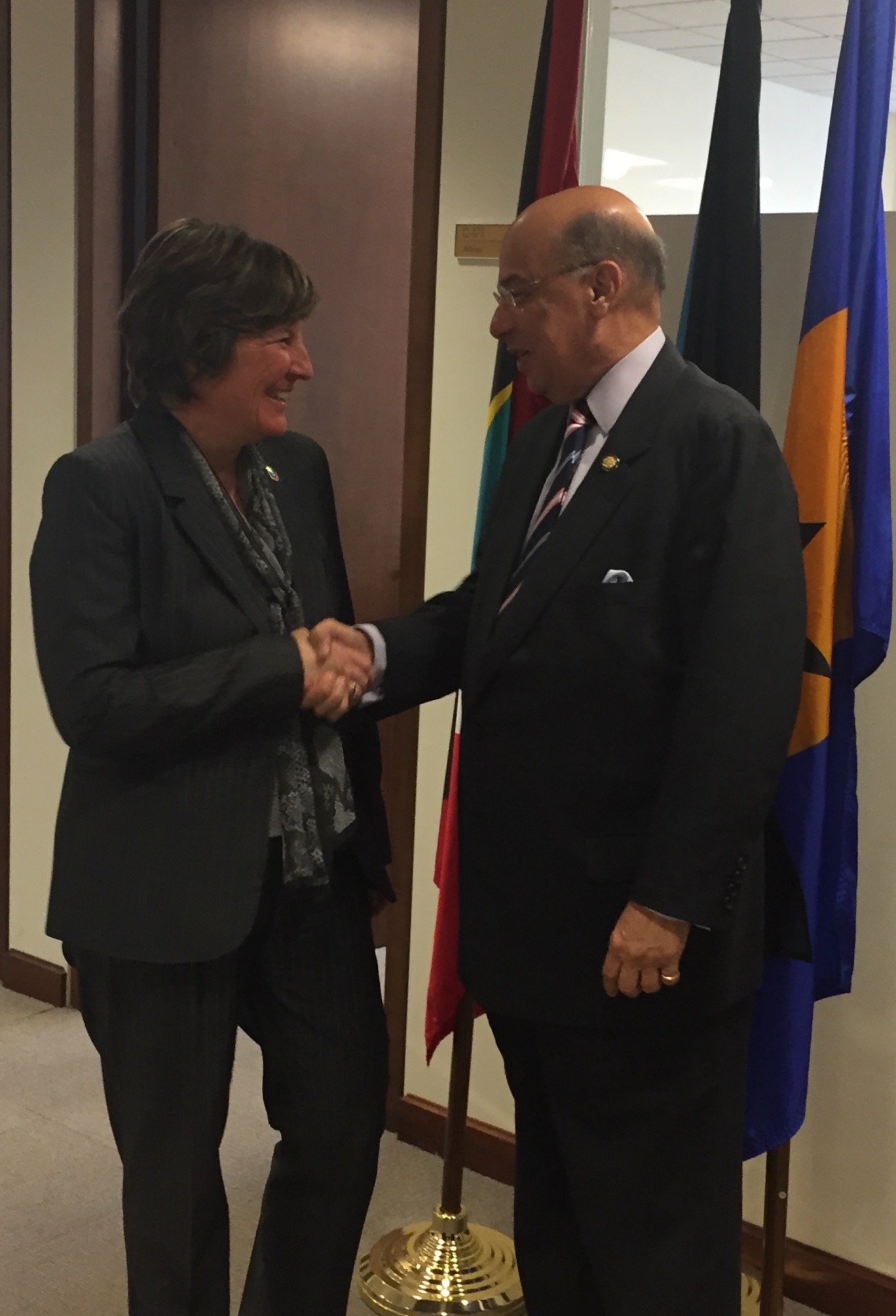 At the World Bank on20 March 2017 meeting Christine Hogan, the Executive Director for Canada and the Caribbean, to talk about Antigua and Barbuda matters.
At the World Bank on20 March 2017 meeting Christine Hogan, the Executive Director for Canada and the Caribbean, to talk about Antigua and Barbuda matters.
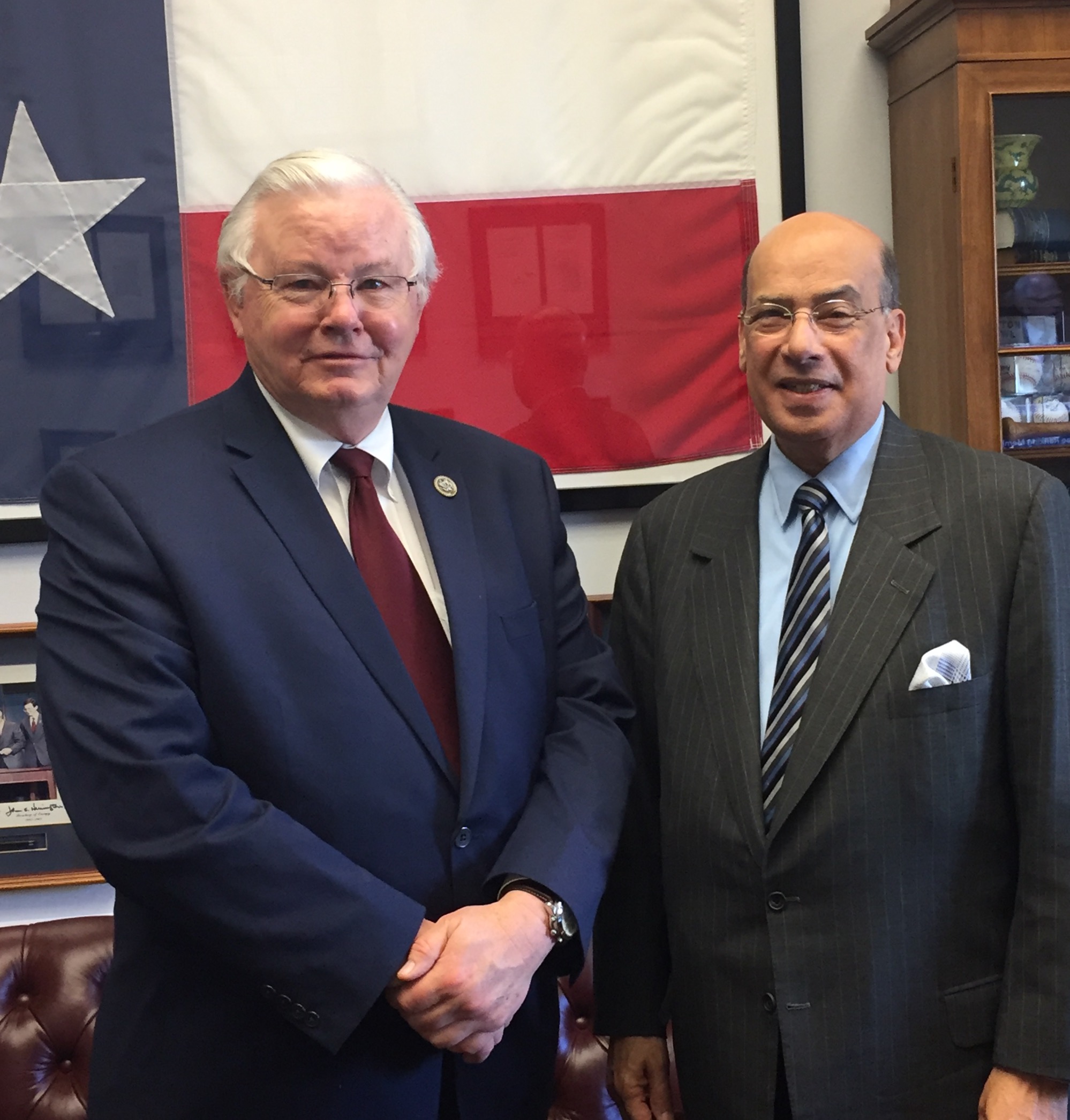
With Joe Barton, US Congressman from the State of Texas in his Office on Capitol Hill on Thursday, 16 March 2017 discussing US-Antigua and Barbuda relations
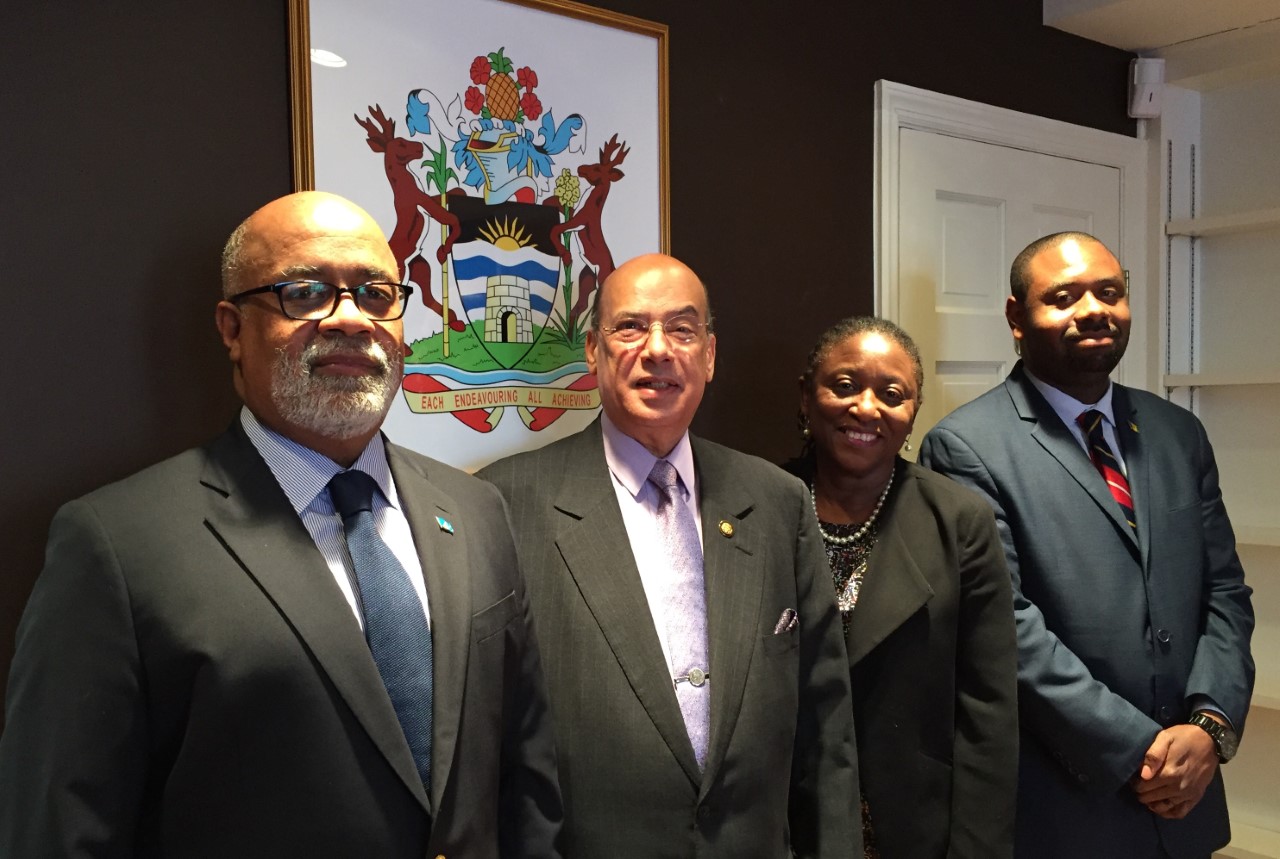 Hosting a meeting at the Antigua and Barbuda Embassy in Washington, DC of diplomatic representatives of St Lucia (Ambassador Anton Edmunds, St Kitts-Nevis Ambassador Thelma Phillip-Browne and St Vincent Deputy Chief of Mission Omari Williams)
Hosting a meeting at the Antigua and Barbuda Embassy in Washington, DC of diplomatic representatives of St Lucia (Ambassador Anton Edmunds, St Kitts-Nevis Ambassador Thelma Phillip-Browne and St Vincent Deputy Chief of Mission Omari Williams)
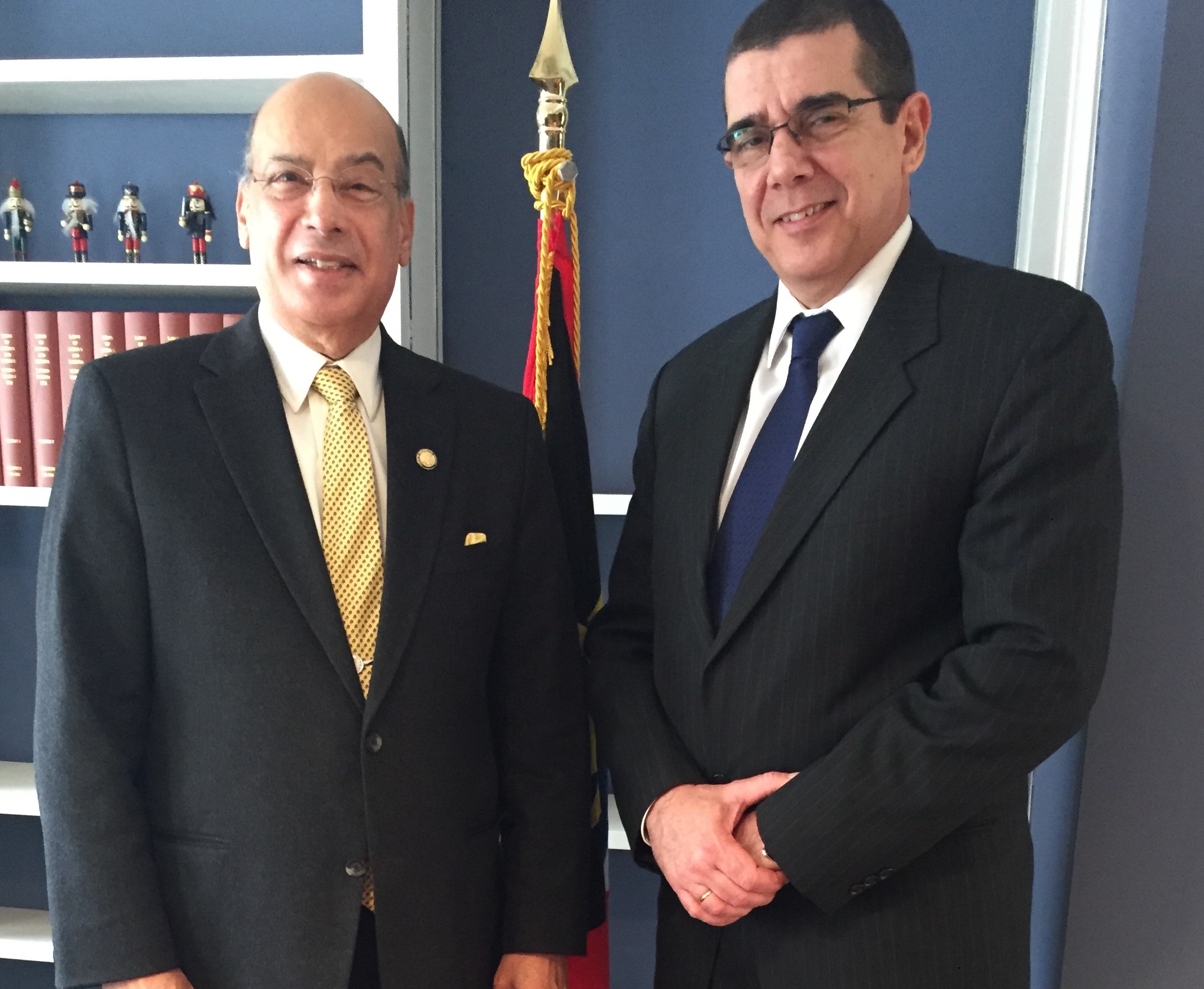 Meeting the Cuban Ambassador to the United States, Jose Cabanas Rodriguez at the Antigua and Barbuda Embassy on Tuesday, 21st February, 2017
Meeting the Cuban Ambassador to the United States, Jose Cabanas Rodriguez at the Antigua and Barbuda Embassy on Tuesday, 21st February, 2017
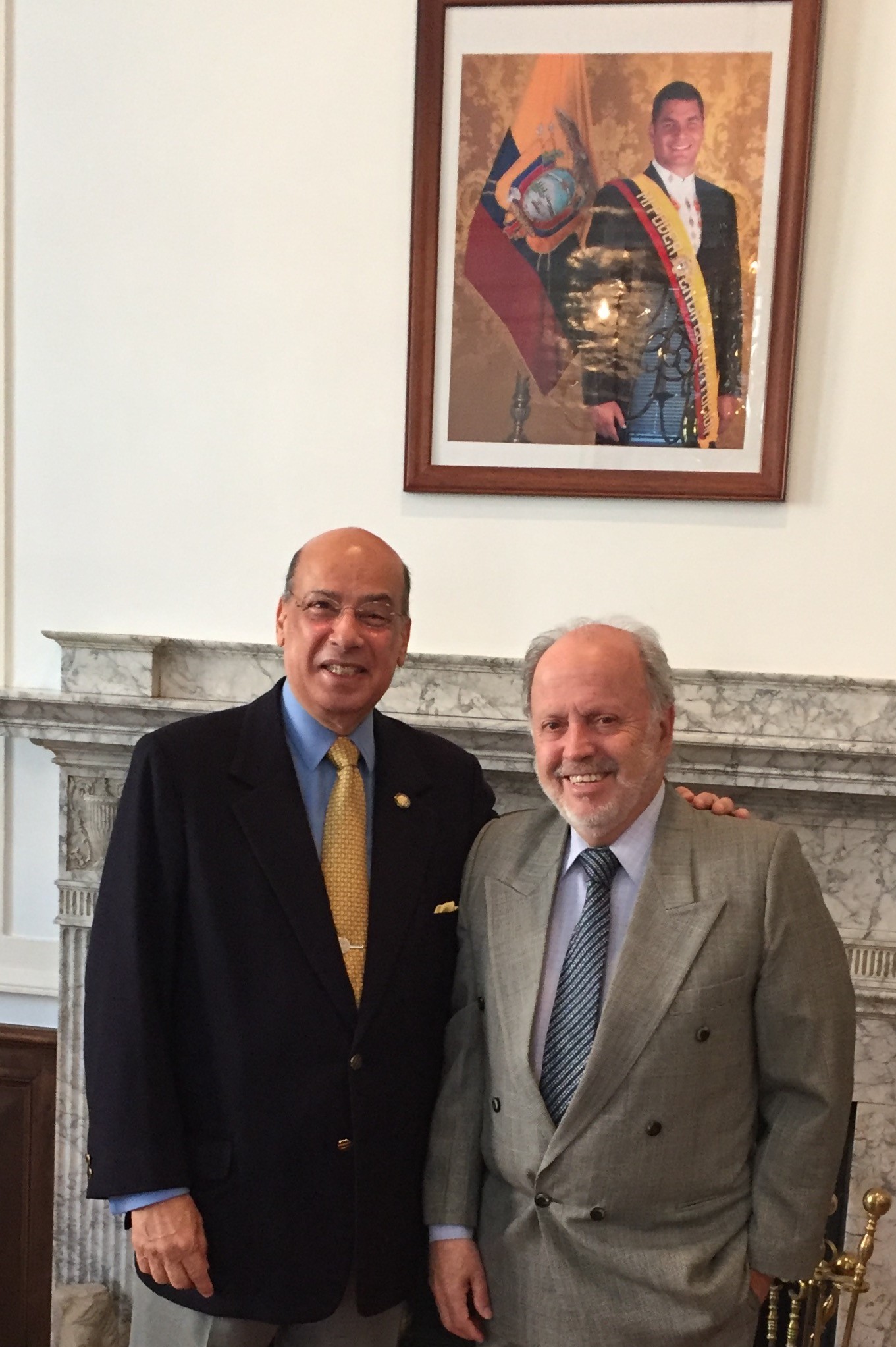 With the Ambassador of Ecudaor to the United States, Francisco Borja Cevallos, talking Ecuador-Antigua and Barbuda relations on 13 February 2017
With the Ambassador of Ecudaor to the United States, Francisco Borja Cevallos, talking Ecuador-Antigua and Barbuda relations on 13 February 2017
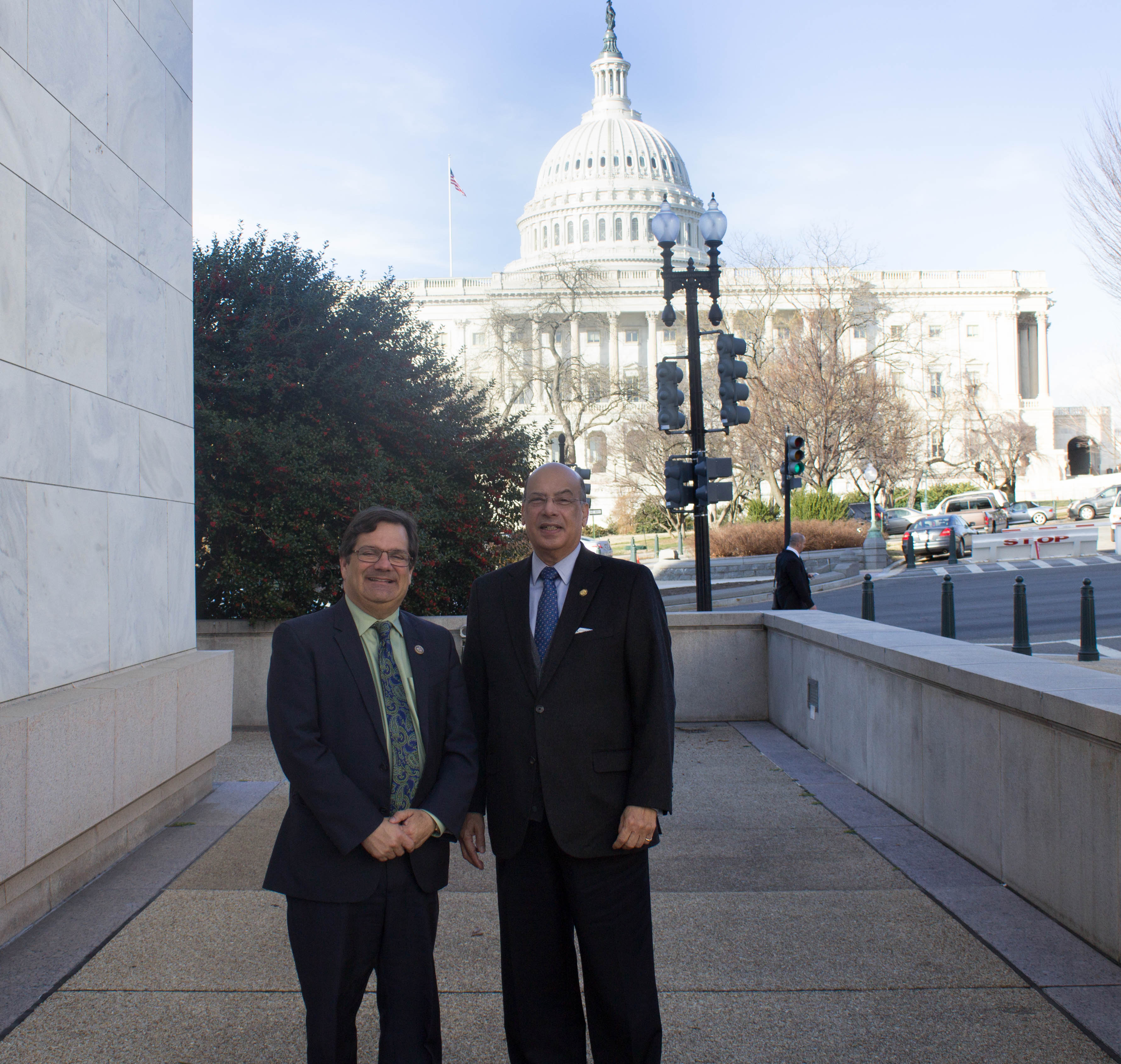 With US Congressman Gus Bilikakis (Dem,Fl) for talls on Caiptol Hill in Washington
With US Congressman Gus Bilikakis (Dem,Fl) for talls on Caiptol Hill in Washington
.JPG) With Charlie Crist, US Congressman (Dem, Fl) for discussions on US-Antigua and Barbuda matters
With Charlie Crist, US Congressman (Dem, Fl) for discussions on US-Antigua and Barbuda matters
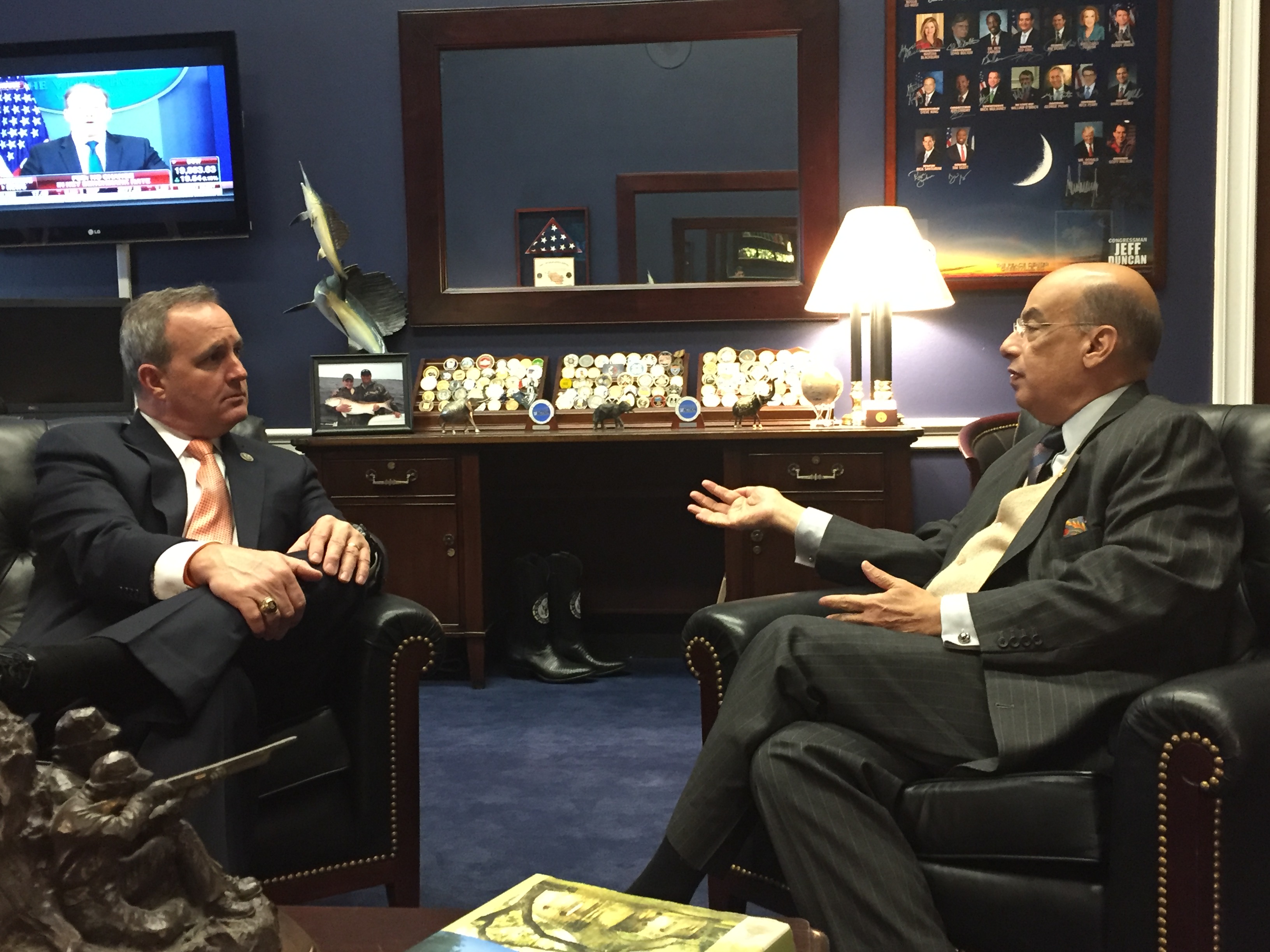 With US Senator Jeff Duncan, Chair Foreign Relations Committee talking energy and Citizenship by Investement Programmes in the Caribbean
With US Senator Jeff Duncan, Chair Foreign Relations Committee talking energy and Citizenship by Investement Programmes in the Caribbean
.jpg) With Professor Louis Gates Jr at the Smithsonian National Musuem of African American History in Washington, DC after an evening of enlightening presentations on the neglected story of the building of the US
With Professor Louis Gates Jr at the Smithsonian National Musuem of African American History in Washington, DC after an evening of enlightening presentations on the neglected story of the building of the US
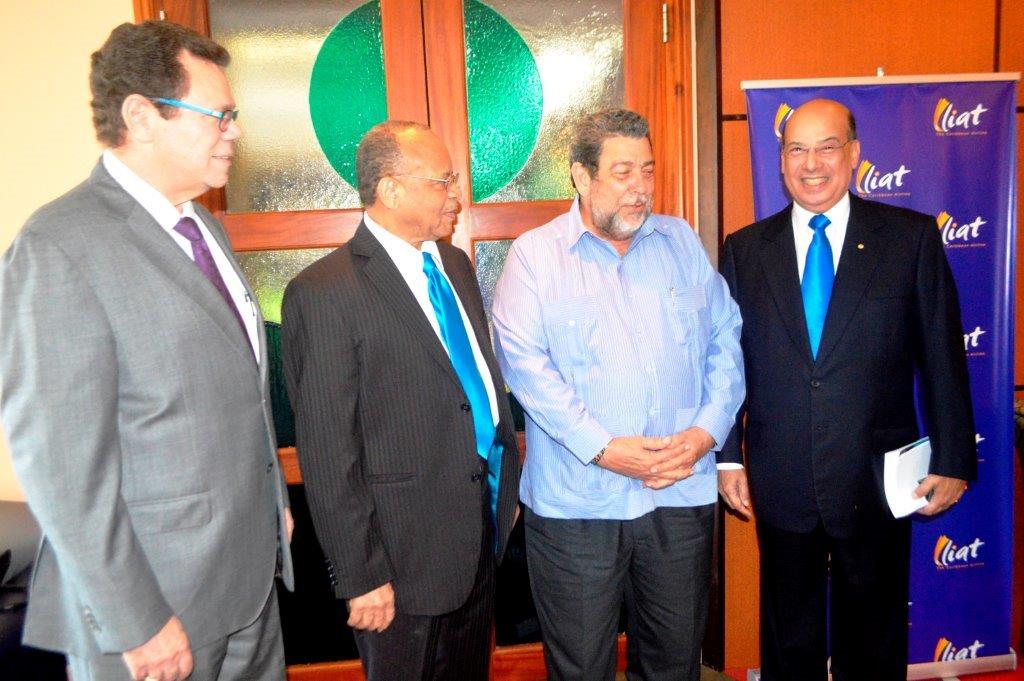 March 17, 2014 in Barbados where I spoke with Dr Ralph Gonsalves, Caribbean thought leader and Prime Minister of St Vincent and the Grenadines (second right) at the launch of the late Jean Holder’s (third right) excellent book on Regional Transportation. All that Jean wrote remains relevant today. At far left is Warren Smith a former CEO of LIAT and, at the time, President of the Caribbean Development Bank. Each of us was born in different parts of the Caribbean, but all of us know that we are better off as One Caribbean.
March 17, 2014 in Barbados where I spoke with Dr Ralph Gonsalves, Caribbean thought leader and Prime Minister of St Vincent and the Grenadines (second right) at the launch of the late Jean Holder’s (third right) excellent book on Regional Transportation. All that Jean wrote remains relevant today. At far left is Warren Smith a former CEO of LIAT and, at the time, President of the Caribbean Development Bank. Each of us was born in different parts of the Caribbean, but all of us know that we are better off as One Caribbean.
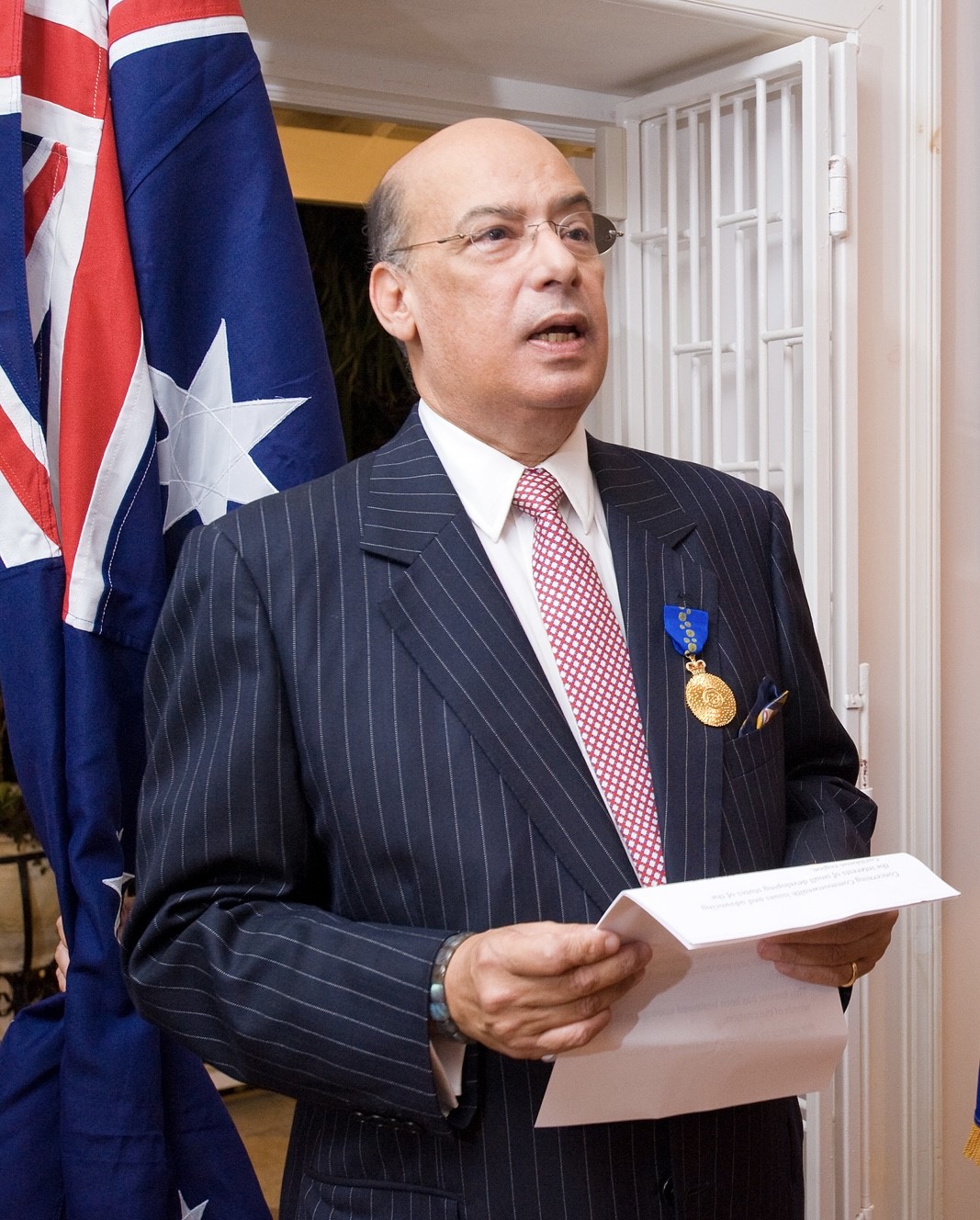
Sir Ron speaking after receiving the Order of Australia in November 2012. The Medal is sees onthe left lapel of his jackedt. The award was made for “service to Australian relations, particularly concerning Commonwealth issues and advancing the interests of small developing states of the Caribbean region”
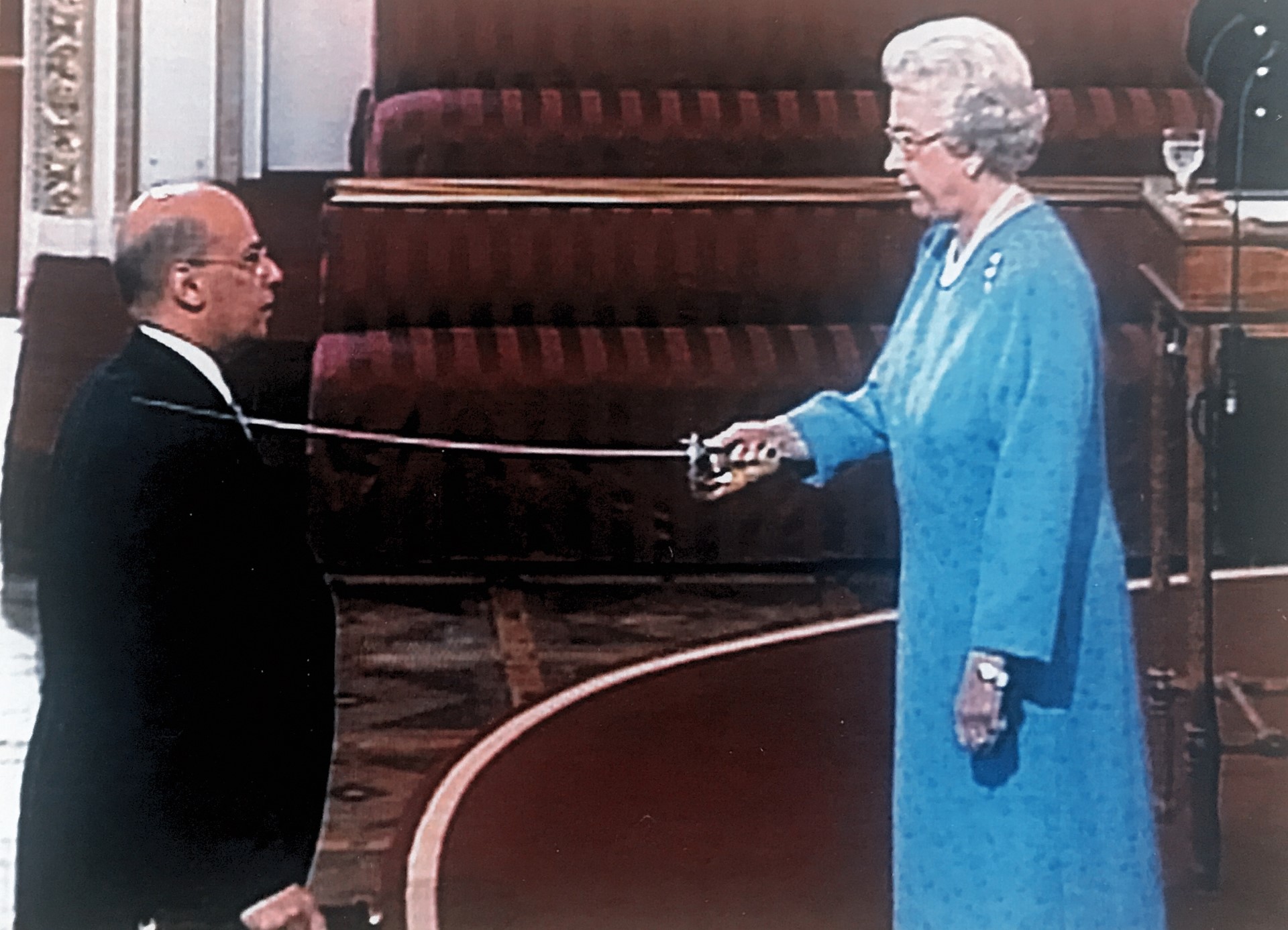
Sir Ron being Knighted by Her Majesty The Queen Elizabeth II at Buckinhgam Palace in 2002. The formal annoucement of the award of Knight Commander of the Most Distinguished Order ot St Michael and St George was made on 14 June 2002.
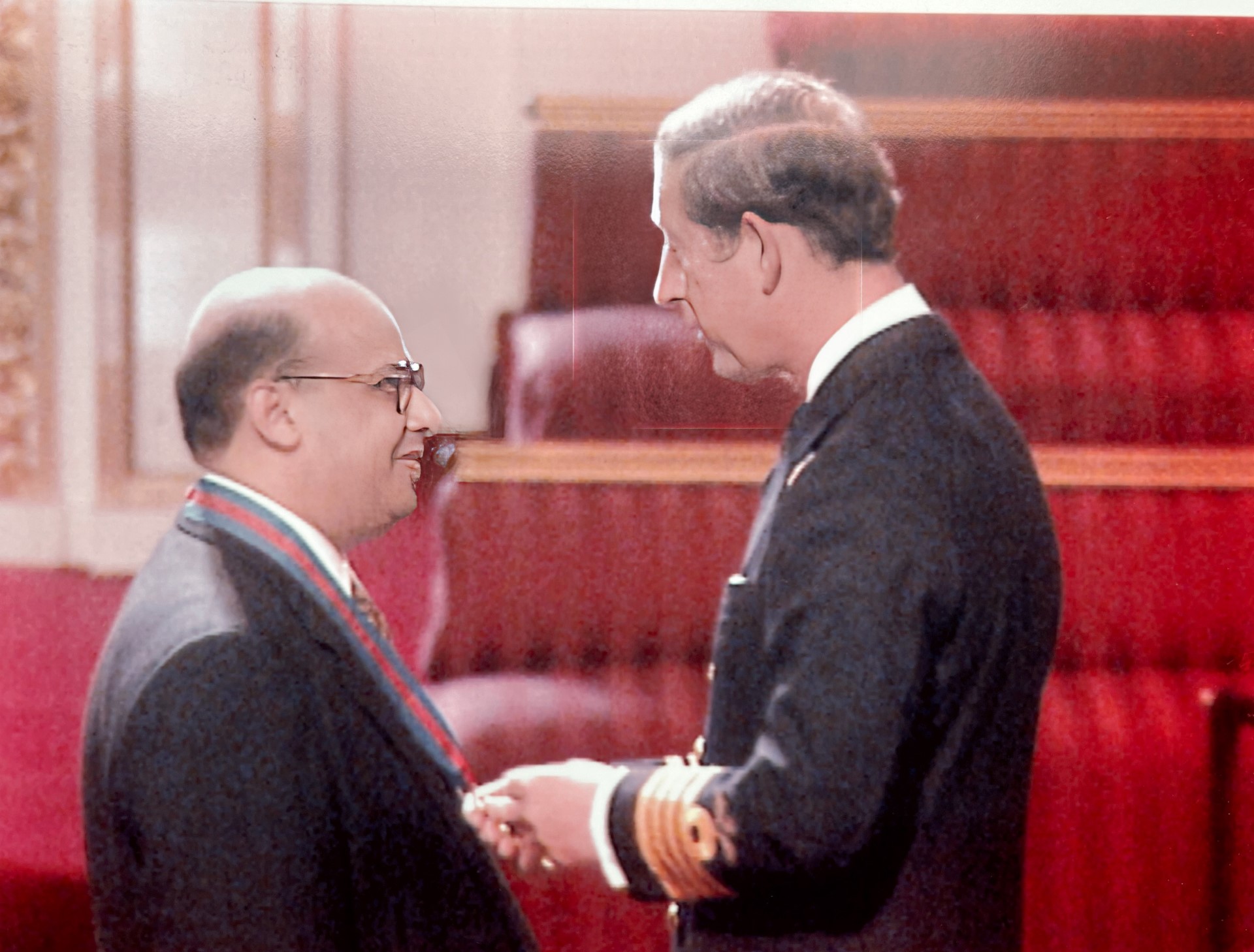
In 1997, Prince Charles, standing in for Her Majesty The Queen, Eizabeth II, officiated at the ceremony at Buckingham Palace at which the honour of Companion of the Most Distingushed Order of St Michael and St George (CMG). The award waa announced in Her Majesty's 1996 New Year's Honour list which was published on 30th December 1996.
Latest Video - OAS Permanent Council item on Venezuela and an IACHR report on elections
Friday 24 January 2025
On 24 January, 2025, Sir Ronald Sanders explained his delegation's position on the resposibilities of the Government of Venezuela to respect and implement its obligations under inernational law and the principles of the UN Charter, even as he expressed disappointment over the lack of balance and thorougness of a report by the Inter-American Commission on Human Rights (IACHR). He said:
"Although the Venezuelan government has withdrawn from this Organization and no longer regards itself as bound by the Charter and ancillary Inter-American Conventions, my delegation calls on the Venezuelan government to respect its broader international obligations.
These include: the release of arbitrarily detained individuals; ensuring freedom of expression; adhering to democratic norms, particularly the sanctity of embassies and the peaceful settlement of disputes.
Despite its withdrawal from the OAS, Venezuela remains bound by international norms, international law, and the principles of the United Nations Charter.
These principles are not abstract ideals; they are the foundation for peace and respect for the civil and political rights of individuals and peoples.
Therefore, while my delegation urges the IACHR to strengthen its methodology and ensure balance and fairness in its work, we also call upon the Venezuelan government to honour its international obligations.
I reiterate that my delegation’s intervention regarding the IACHR report is not intended to favour any party in Venezuela. Instead, it is a call for balance and objectivity - principles essential to maintaining the credibility and moral authority of the IACHR in the eyes of our peoples and the international community."
The presentation can be see on YOU TUBE at: Sir Ronald Sanders statement at the OAS Permanent Council on the IACHR Report on Venezuela,1.24.2025
On 31st July, as Chair of the Permanent Council of the OAS at a Special Session on the disputed Presidental elections in Venezuela on July 28th, Sir Ron summed up the meeting which did not adopt a draft Resultion calling for a recount of the votes with independent international observattion: See his comments in the link below:
Sir Ronald Sanders' closing remarks as Chair of OAS Meeting on Venezuela 2024 elections (youtube.com)
On Februray 23, 2024 at a meeting of the Permanent Council of the Organization of American States, Sir Ronald introdcued a Declaration by 25 of the 32 voting member states of the OAS, titled - "Two years on from the Russian Federartion's Invasion of Ukraine". The presentation can be seen here:
Sir Ron Sanders reads Declaration: “Two years on from the Russian Federation’s Invasion of Ukraine” (youtube.com)
In the same meeting, during a debate that followed the presentation of the Declaration, Sir Ronald explained why the Russian Federation should not be given a free pass after it violated interhational law and the principles of the Charter of the United Nations - the entire word is threatened by it.
Sir Ronald Sanders intervention during OAS Permanent Council Meeting on Feb 21, 2024 (youtube.com)
The State of CARICOM at the beggining of 2024
At the end of 2023, Sir Ronald offered a reflection on the state of the Caribbean Community including its neglect of opportunities and the viable path that still lies ahead with appropriarte action. This video was a companion to his commentary, "Smallness and Sepaateness will not do" puinlished on 28 December 2023.
A reflection on the Caribbean by Sir Ronald Sanders, veteran diplomat, regionalist and writer (youtube.com)
Sir Ronald questions "race parity" in the upper and upper middle levels of the Organization of American States (OAS) diring the debate on "gender parrity". He says parity must exist not only among men and women, but also among people of all races. However, there is little evdidence of "black persons - men or women", throughout the Organixation;
SIR RONALD SANDERS QUESTIONS OAS’ RECORD ON GENDER AND RACIAL PARITY - YouTube
The State of the Commonwealth
Although the main focus of a conference. held by the Commonwealth Journalists Association (CJA) on 30 June 2022, was to discuss the challenges facing journalism, a day-long series of discussions taking place between the Commonwealth Heads of Government Meeting (CHOGM) and the Commonwealth Games was bound to assess the state of today’s Commonwealth.
However, the panel discussion on ‘The Commonwealth, between the Kigali summit and the Birmingham Games’ focused on what session chair, the Institute of Commonwealth Studies Director Sue Onslow described as “politics and politics”. The discussion featured:
he Director-General of the Nigerian Institute of International Affairs, Professor Eghosa Osaghae, Caribbean diplomat Sir Ronald Sanders, and the Director of the Canadian Defence and Foreign Affairs Institute, Hugh Segal. Below is the recording of the discussion, It is also listed in the "Videos" sectio of this website.
US CARIBBEAN RELATIONS: The Biden Administration Year 1
Wednesday 11 May 2022
“US-Caribbean Relations in Biden Administration Year 1”
A discussion brief for a Webinair discussion on April 28th 2022
and publication by the Florida International University
By Sir Ronald Sanders
On April 28th, Sir Ronald presented a paper on “US-Caribbean Relations: The Biden Administration Year 1” at a webinar, which he was commissioned to produce by Florida International University (FIU), the Latin American and Caribbean Centre and the Caribbean Policy Council. The 7,000-word paper was subsequently published by FIU.
The paper can be read on this website under “Lectures” in the “Lectures and Interviews section.
The discussion in the webinar which was Chaired by Dr Georges Fauriol and included former top US State Department Official, Ambassador Tom Shannon; Pulitzer Prize winning Reporter, Jacqueline Charles of the Miami Herald and Dr Vanessa Chaitram of Trinidad and Tobago, can viewed at: https://www.youtube.com/watch?v=IfX0HrxcWjM
10th Anniversary of the Report of the Commonwealth Eminent Persons Group on Urgent Reform of the Commonwealth
Sunday 24 October 2021
October 2021 is the 10th anniversary of the Report of the 2011 Eminent Persons Group (EPG) entitled: A Commonwealth of the People: Time for Urgent Reform
The report can be read on this website. The link is:
EPG Report FINALprintedVersion.pdf (sirronaldsanders.com)